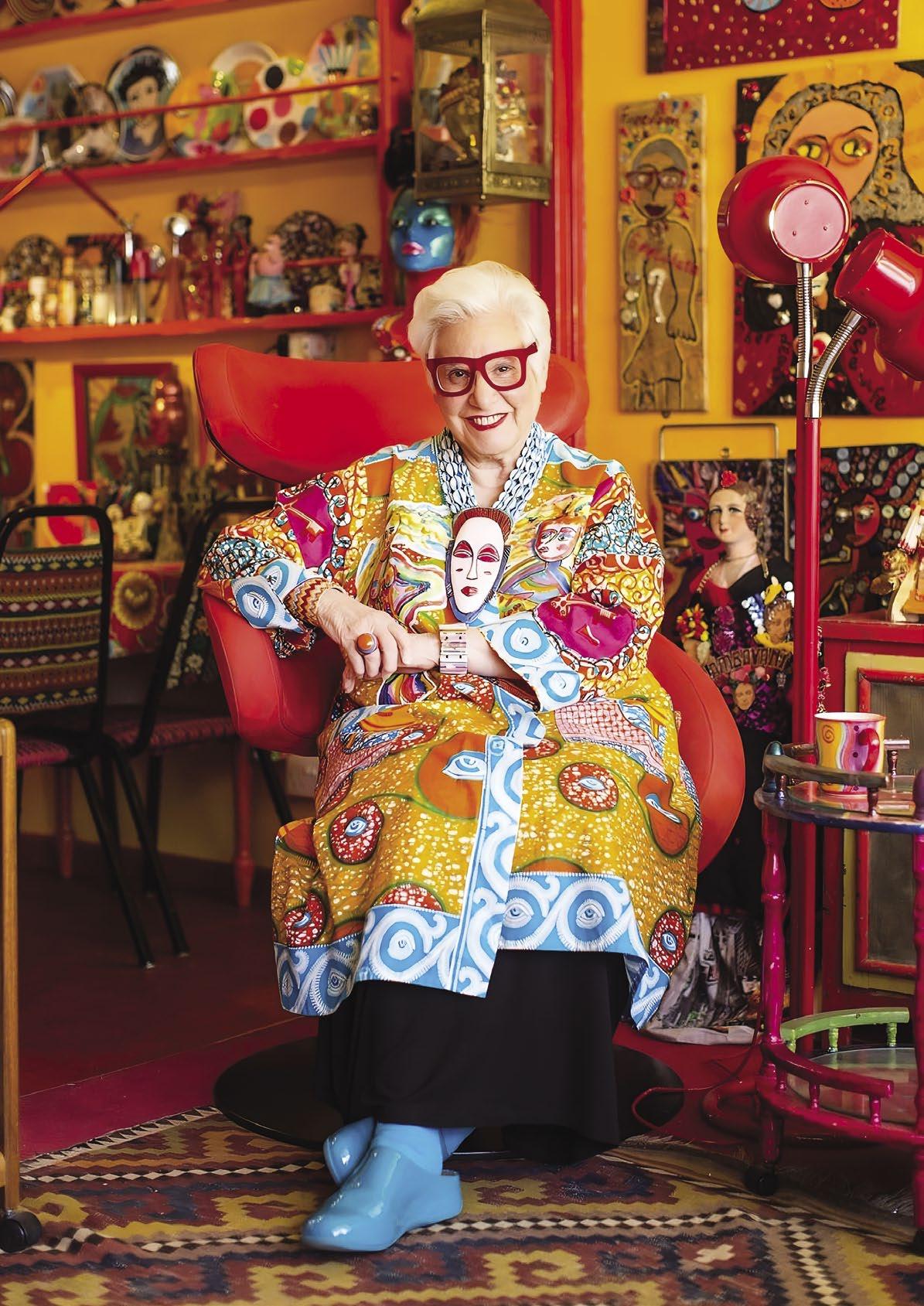

ISSN 2652-8282 9 > 772652 828004 03 Enter our colouring competition and Win! KEEP WARM THIS WINTER WITH C O L O U R VIC/TAS I WINTER 2023 I $9.95 Do you need help? CARERS GATEWAY explained Exclusive Interview With ITA BUTTROSE JEAN KITTSON When do you know it’s time to move australiancarersguide.com.au Part 2 8 Plus MAGGIE BEER delicious Winter delights Fun & Gamesquizzes,Puzzles,jokes, word games & delicious recipes Tips on MAKING YOUR HOME SAFE FOR ALL THOSE CARING FOR AN ELDERLY LOVED ONE Why do we feel SAD What is Seasonal Affective Disorder?
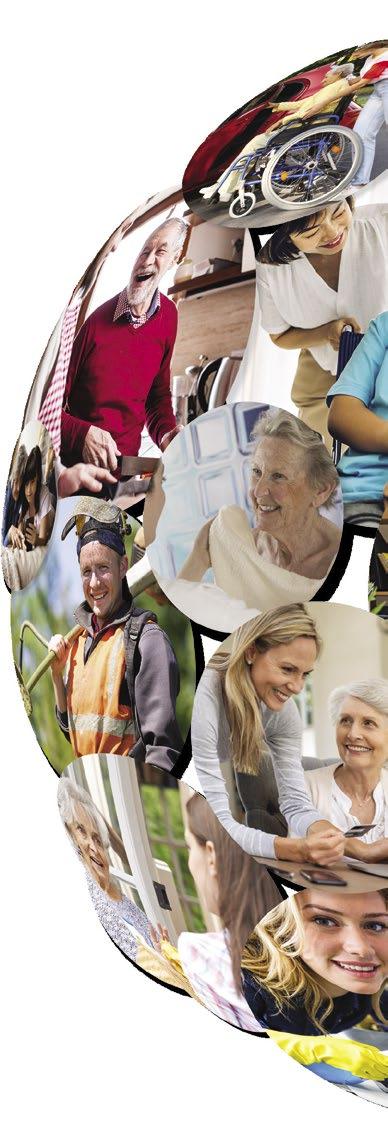







Nurse Next Door Home Care Services believes people can stay in their own homes, regardless of age or ability.
With a purpose of Making Lives Better, Nurse Next Door’s extraordinary family of nurses and caregivers empower you to keep living life to the fullest and maintain a sense of positivity and possibility as you age.
Nursing
Services Include: -
- High-Intensity & Complex Care - Alzheimer's & Dementia Care - 24/7 Caregiving - Respite Care - Palliative Care - Companionship Care - Personal Care - Medication Management
- Transportation
1300 100 247 www.nursenextdoor.com.au
FOR ALL THOSE CARING FOR AN ELDERLY LOVED ONE
ABOUT
Australian Carers Guide is a valuable resource for everyone who is caring for an ageing parent, spouse or an elderly loved one. Out of the 2.7 million informal carers in Australia, 1.3 million care for an elderly family member or a loved one. Until now, there has never been anything in the mainstream market specifically for carers. Our guide delivers useful and practical information, all geared toward the carers and their wellbeing, from how to better care to hope to cope.
EDITORIAL
PUBLISHER PAK ALLIED MEDIA
EDITOR IN CHIEF Paul Koury
MEDIA & CONTENT DIRECTOR Karina Foo
CREATIVE DIRECTOR Christine Schiedel
PRODUCTION MANAGER Kristy Hatton
CONTRIBUTORS
Maggie Beer
Jean Kittson
Maree McCabe AM CEO Dementia Australia
Rachel Lane Principal – Aged Care Gurus and Co Author of Aged Care, Who Cares
Anika Wells Hon MP Federal Minister for Aged Care and Federal Minister for Sport
Karina Foo Media and Content Director The Australian Carers Guide
Will Richardson Puzzles supplied by Richardson Publishing Group
COVER IMAGE BY: Helen Cathcart for her book ‘Bolder’ co-authored with Dominique Afacan
COVER MODEL: Sue Kreitzman
ADVERTISING
ADVERTISING SALES PAUL KOURY paul@acguide.com.au
ADVERTISING SALES MARYANNE SCORRINGE maryanne@acguide.com.au
SUBSCRIPTION SALES AND ENQUIRIES
KYLIE MACKAY kylie@acguide.com.au
1300 717 515
DISTRIBUTION/CIRCULATION
STEVE BISSETT Are Media Pty Ltd
GET IN TOUCH
PUBLICATION OFFICE PAK Allied Media, PO BOX 6155 WANTIRNA, Victoria 3152 Tel: 1300 717 515 Email: hello@acguide.com.au
CARBON FOOTPRINT Printed in Australia using 100% recyclable paper
DISCLAIMER The views expressed in the Australian Carers Guide are the contributors’ and not necessarily those of the Australian Carers Guide and will not be legally responsible in contract, tort or otherwise for any statement made in this magazine.
PRIVACY NOTICE
ACN; 34 611 117 303 Publication Mail Sales Product
Agreement No. 72365477, Australian Carers Guide is published by PAK Allied Media on a quarterly basis. All rights reserved. Contents may not be reproduced without written permission of the publisher. Printed in Australia.
ACKNOWLEDGMENT
The Australian Carers Guide acknowledges the Wurundjeri People as the traditional custodians of the place we now call Bayswater, where this magazine is published. We pay our respects to their Elders, past and present and emerging.
I AUSTRALIAN CARERS GUIDE 6
PUBLISHER’S LETTER Hello everyone!
Welcome to the Winter edition of the Australian Carers Guide. We hope this letter finds you in good health and high spirits. We would like to extend a heartfelt thank you to all of you who have reached out to us through email, phone calls and letters to share your experiences, ask questions and provide feedback. Your support and involvement have been invaluable in shaping this magazine.
As I write this letter, I have just turned 61, and I’m reminded of how with each passing year, the cold weather seems to affect me more. So, in this issue, we have curated an array of tips to help you stay warm, motivated, and healthy during the chilly winter months.
The cover story of this edition features a lovely, colourful lady that I hope will bring a smile to your face. We delve into the science behind colour and explore how it can have a real and tangible impact on our emotions. Additionally, we have included some practical, inexpensive tips that you can implement using colours to boost your mood and well being.
You may have noticed that our publication has undergone a makeover. We wanted to keep it fresh and engaging. As primary carers, we understand the importance of not only providing valuable information but also creating a pleasurable reading experience. Our new look is designed to be far more visually appealing, fun, and easier to read. We hope you love it as much as we do, and we would love to hear your thoughts and feedback.
Finally, do not forget to check out Maggie Beers’ delicious new recipes that are sure to delight your taste buds and warm your soul.
Thank you for your continued support, and we hope you enjoy reading this edition of the Australian Carers Guide.
Warm regards,
Join
PAUL KOURY PUBLISHER

I WELCOME I
our community
be part of our community and stay in touch with us on Facebook. australiancarersguide com.au facebook.com/ Australiancarersguide Please send us an Email or write to us at: Editor@acguide.com.au or write to us at: PO Box 6155 Wantirna VIC 3152 General Enquiries: info@acguide.com.au Free Call: 1300 717 515
Please
AUSTRALIAN CARERS GUIDE I 7
Paul Koury
At


With nearly 30 years’ experience, we know that comfort and care go hand in hand. Our care and services are tailored to your wellbeing and needs, enabling you to find the smile in every day.
Through our range of permanent and respite aged care services, we are committed to helping our residents and clients realise their wellbeing goals and lead meaningful lives.

one? Chat to us today about what we can do to help you feel right at home. Give us a call on 1300 998 100 or pop into a Home today.
Considering aged care for a loved
Regis, we’re here to keep
connected with the things that matter most to you.
you
SCAN TO LEARN MORE regis.com.au | 1300 998 100
16
22
We show you how to happily navigating the hustle and bustle of everyday activities
40
56 Decluttering your world
Why it’s so important to make room for living
62 Elder Abuse
Knowing which way to turn for help starts by defining elder abuse, recognising its signs and knowing where to seek support.
80 Why do we feel SAD
What is Seasonal Affective Disorder, and how to recognise and treat it.
86 Aged Care Planning

Learn what to do when your loved one refuses help.
104 Incontinence
How to care for someone with Incontinence

Winter
issue Enter ourColouring inCompetitionto WIN It’s easier than youthink! 28 $ Features
What is inside this
COVER STORY: Keep warm this Winter with
How colour can help us feel better during Winter
Colour
Ita Buttrose - Part 2 In our exclusive interview, Ita shares her personal thoughts on the future of Aged Carer
Ways to find
28 5
Happiness
your
loved one
home.
34 Tips on making home Safe Ensure
elderly
is safe at
Carers Gateway Find out how Carers Gateway can help you
136 AUSTRALIAN CARERS GUIDE I 9
Win $500 worth of Free Lite n’ Easy deliveries
Developed by dietitians and prepared by chefs, Lite n’ Easy offers more than just a weight loss solution. We also offer great tasting meals, designed to promote healthy eating and well-being.
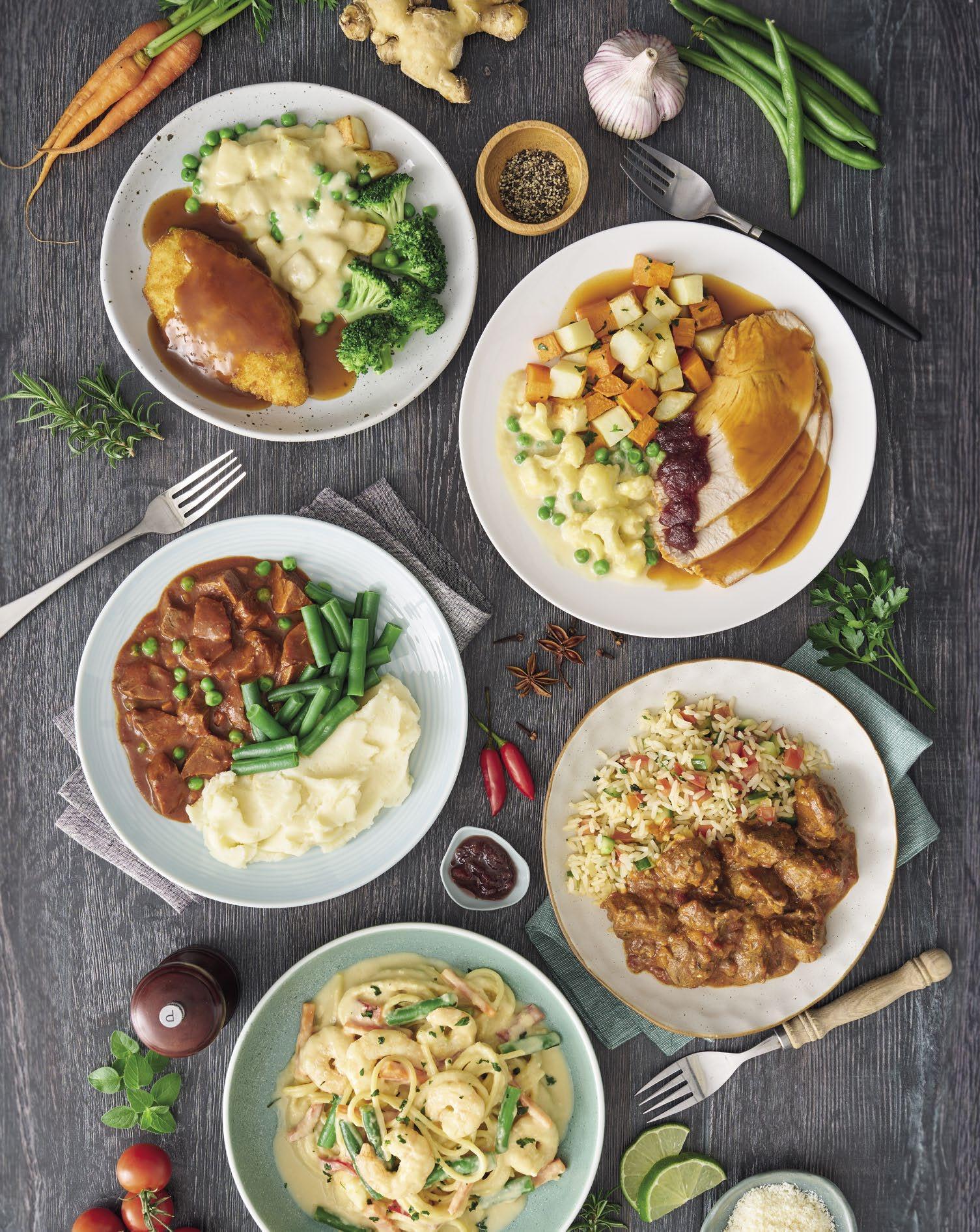
• Plenty of variety and choice with over 235 meals.
• My Choice range of dinners, soups and desserts designed for older people with smaller appetites.
• Flexible options, home delivered.
• No lock in contracts or subscriptions.
• On a Home Care Package? If you’re an approved Home Care Package recipient you could have 70% of your order covered by your provider, with healthy and delicious meals from just $2.36. Call your provider for more information.
Simple scan the QR code below and enter your details to go into the draw to win.
Competition winner will be drawn 5pm 31st August, 2023.

liteneasy.com.au | 13 15 12 Australia’s No.1 Healthy Meal Delivery Service




Regulars 12 The Scoop Useful tips and wise advice. 15 Your Feedback We love hearing from you. 44 Dementia-Relationships & Dementia Those in relationship or caring for someone living with Dementia may need to reframe their new reality. 50 Jean Kittson When do you know it’s time to move? 68 Aged Care Reforms – Update Read about the new changes made this quarter. 74 Technology Learn all about the supportive Gather My Crew app. 84 Comic Corner Jokes that will brighten your day. 108 Finance Unpacking the Home Care Packages. 116 Q & A 119 Recipes. Maggie Beer Winter recipes to warm your soul and delight your taste buds. 125 Fun and Games Eight pages of Fun for when you need some me time. 138 Solutions $ 108 74 44 How to get support and create your own crew with technology Relationships & Dementia All the latest news Rachel Lane, unpacks our Home Care Packages including the Tips and Traps you need to know about 116 AUSTRALIAN CARERS GUIDE I 11
Scoop THE

The latest to keep you in the know!
RELAXING Winter Fun
1Puzzles and Brain games are a great way to relax, especially in Winter. Recipe: Make a hot cuppa, find a quiet place, go to our Time Out puzzles pages, relax and enjoy.
2Enter our Colouring competition. In this issue we are running a colouring in competition Get some colour pencils and experience the simple
Did You Know?
Carrots are an excellent source of vitamin A, with one serving providing 184% of your daily value, and also the following nutrients:

Vitamin C. Calcium. Iron. Biotin. Vitamin K1. Potassium. Vitamin B6. Lutein.

The average male gets bored shopping after 26 minutes
women get tired after 2 hours.
Drugexpiration dates
8
One way to feel happier is to get involved in your community by serving as a volunteer.
NO APPETITE?
There are many reasons why some older adults lose their appetite or refuse to eat. Sometimes simple changes can make a big difference to their health:
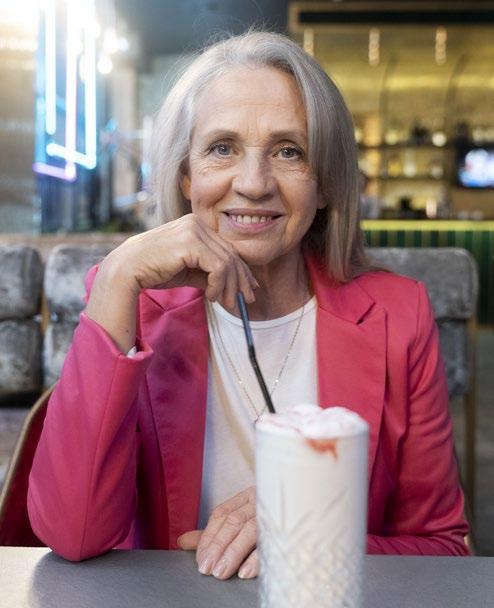
• Try easy-to-eat finger foods and easy-to-eat fresh fruits.
• Create a meal and snack schedule.
• Try enriched milkshakes or smoothies.
• Serve smaller portions of high nutrient foods.
• Consider a meal supplement like Boost or Ensure.
• Keep track of what’s working.
10

Kiwi Fruit Benefits
TIPS
DO THEY MEAN ANYTHING?
The expiration date is the date at which the manufacturer can guarantee the full potency and safety of the drug. A study by the The Therapeutic Goods Administration (TGA) found that 90 per cent of more than 100 drugs tested, both prescription and over-the-counter, were perfectly good to use even 15 years after the expiration date. However, effectiveness may decrease over time. Placing a medication in a cool place will help a drug remain potent. If it’s important that your drug is absolutely 100 per cent effective, consider buying a new bottle.
Kiwis are high in Vitamin C and dietary fibre and provide a variety of health benefits. This tart fruit can support heart health, digestive health, and immunity. The kiwi is a healthy choice of fruit and is rich with vitamins and

to help care for someone with Dementia?
1. AGREE, never argue
2. DIVERT, never reason
3. DISTRACT, never shame
4. REASSURE, never lecture
5. REMINISCE, never say remember
6. REPEAT, never say ‘I told you so” DO WHAT YOU CAN, never say ‘you can’t’
8. ASK, never demand
9. ENCOURAGE, never condescend
10. REINFORCE, never force
Nearly TWO THIRDS of carers are more likely to live with those they care for
AUSTRALIAN CARERS GUIDE I 13
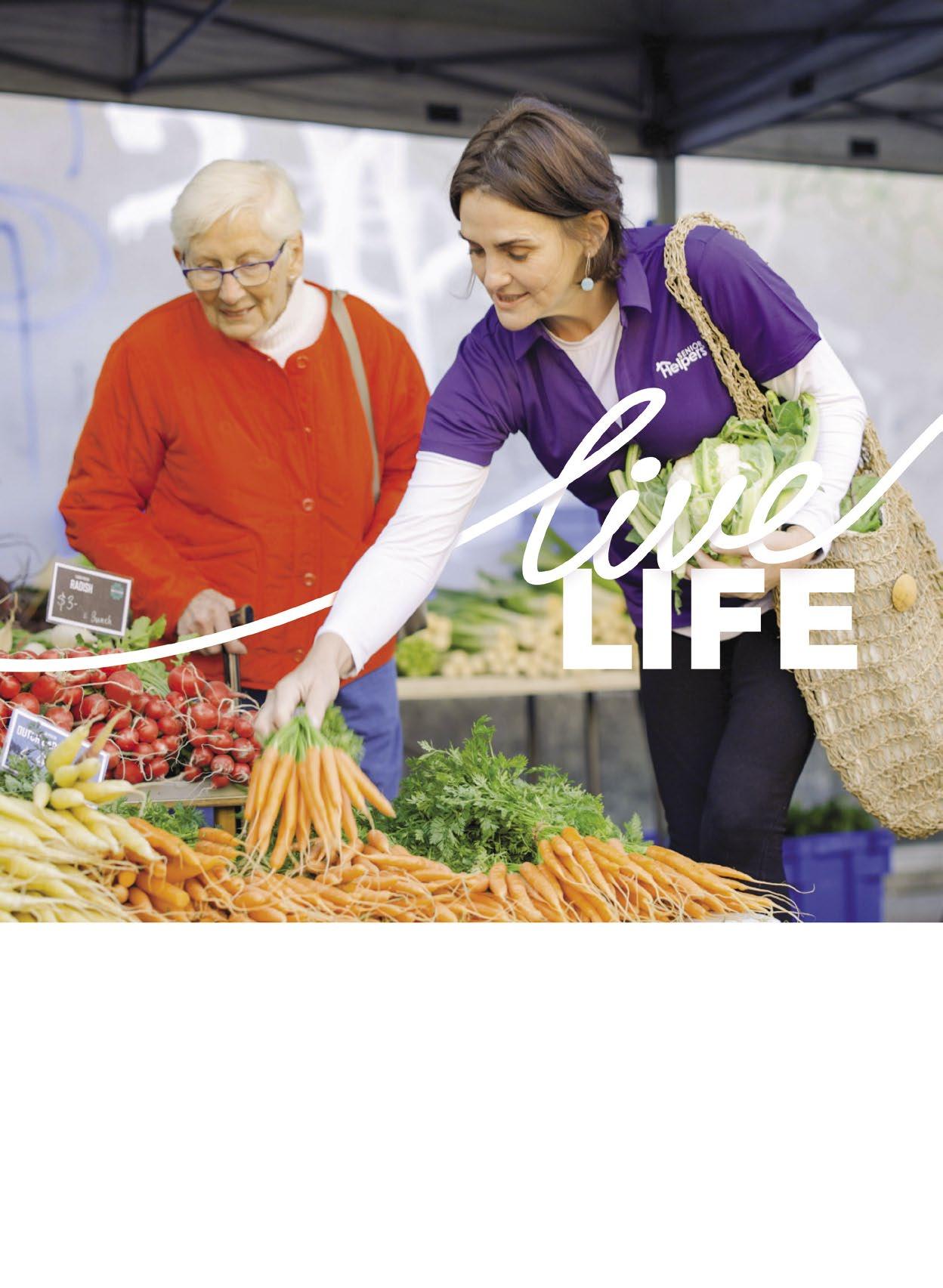


Mail We’ve got
JOINT CREDIT CARDS
I am a carer for my husband suffering from Alzheimer’s and I recently encountered a difficulty dealing with joint credit cards.

I ran into trouble when our new card arrived, and I had to call to activate it.
The bank wanted to speak with my husband as he is the primary cardholder. Of course, he couldn’t remember answers to questions. I even have an enduring but was told that the banks do not have to recognise my EPOA. After much noise and grief, I eventually had it activated. My concern is that in a few years’ time should my husband’s health deteriorate, and we have to reactivate new cards again, we’d be unable to do so.
Christina Delahunt Perth WA
■ EDITOR’S NOTE: Sadly, it’s not the first time I’ve heard your story, Christina. I suggest to those with joint credit cards to separate cards or close accounts while their partner is still able to understand and answer the relevant questions. Also, you needed to be more forceful and speak to those higher up the ladder.
Hello fellow carers, We continue to receive so many emails and hand written letters with your feedback and stories. We enjoy reading them and again it was hard to choose which ones to publish. I think we might have to allocate an extra page to add more of the wonderful feedback we receive.
TOO MANY PILLS
I noticed that most seniors take around 10 pills a day but my mum takes 23 with vitamins included. I’m convinced she doesn’t need them all, especially after reading an article in your magazine. Should I be worried?
Mark Jasper, Footscray VIC
■ EDITOR’S NOTE: Mixing prescription medications with over the counter products can be a recipe for disaster. Go with your mum and talk to her doctor. Ask him to check if combinations and doses aren’t in conflict and if all the vitamins are.
ONCE IN A LIFETIME
There were so many challenging moments that I experienced when caring for my younger brother last year. He was only 67. Even though my caregiving was a once-in a lifetime experience, I’m writing to thank your partners, Cares QLD for my free issues of Australian carers Guide. When I felt at my wit’s end, I often picked up an issue or two and found helpful articles.
 Theresa Tilly, Redcliffe, QLD.
Theresa Tilly, Redcliffe, QLD.
■ EDITOR’S NOTE: Our pleasure. Thanks for sharing
PET CARE IS A CHALLENGE
Mother is frail, stopped walking and caring for her Labrador, and it is now becoming more difficult for her to cope. She’s fallen and regularly runs out of pet food. She’d be heartbroken if we had to find her dog a new home. Do you have any suggestions?
Steven Anderson, Red Deer, AB
■ EDITOR’S NOTE: Try looking for a dog walker or a student / retired neighbour who would love to help with daily walks. A pet store or Amazon offers food delivery so help her by ordering ahead with a repeating delivery.
GET
TOUCH:
Box 6155 Wantirna, VIC, 3152, or email us at editor@acguide.com.au.
IN
Send stories, notes, comments and pictures to The Australian Carers Guide PO
AUSTRALIAN CARERS GUIDE I 15
Colour How
Scientists estimate that there are more than 10 million colours in the planet!

I
GUIDE 16 I COVER
AUSTRALIAN CARERS
STORY I
CAN HELP US FEEL BETTER DURING Winter
Shorter daylight hours and colder temperatures have been shown to make people feel more sad, literally(Seasonal Affective Disorder - SAD), and black or similar shades have been associated with these very melancholic emotions. Of course, monochrome is popular and convenient, but if you’re at home caring for your loved one, it can sometimes feel like Groundhog Day.
Since we socialise less during the colder months, we may be tempted to wear the same dreary, black, grey lifeless colors. After all, who’s going to see you and who’s going to notice?
Well, you can do that if you want, or you can do something just for you.
And why wouldn’t you want to do something that will make you feel better and happier.
And you may also help lift the moods and spirits of others?
The science behind colour psychology and therapy
While medicine cannot prove that colour heals physical ailments or improves mental health,
there is evidence that single or multi colors can have positive effects on our bodies and pain levels.
Colour is therapy. Colour is our world. There’s a reason children and animals are drawn to colour. For adults who don’t like colour, it still gets attention and is unforgettable (you’d definitely remember this issue’s cover photo).

In fact, scientists estimate that there are more than 10 million colors on this planet! That explains why I feel so happy when I look at
anything colorful. Maybe, I got it from my late mother - she was a young adult in the 60’s and 70’s, and was passionate about colors.
In the medical world, some therapists use colour as part of treatments that can have significant impact on their patients’ emotions, thoughts, and behaviors. While individual colour perceptions vary, there are some general principles that have been observed through scientific study.
AUSTRALIAN CARERS GUIDE I 17 I COVER STORY I
Let’s learn and be inspired by how each colour can promote certain positive moods to help us get through these cold and dark months ahead.
Even if you’re the most colour adverse person, you can still use colour around the home and in day to day life to feel better, improve your mood and have a more positive outlook.

CLOTHING
One of the easiest ways to add more color to your life is wearing bright and cheerful hues. Start small with a colorful scarf, socks or hat. Or go all out with a bold, bright coat or sweater.
HOME DECOR AND HOUSEHOLD ITEMS
Having colour on your pillows, blankets and curtains to your living space, or even a picture on your wall will spruce up your home. It just makes everything look more warm and welcoming. For cheaper items, choose colourful objects that you use and see every day like mugs, cups and kitchen utensils - they will instantly put a smile on your face.

LINEN DINNER SETS
What are best mood boosting colours?
ART AND CRAFTS
Painting, drawing, and colouring are great ways to express yourself and is therapeutic. These also make fun activities to do together with your loved one. Better yet, both of you can sign up for a local community arts and craft class - get out of the house and make some friends. Don’t forget to check out our colouring competition in this issue as well. A great colourful activity you and your elderly loved one can do together. Whichever way you want to use colour, you will feel a difference when you let more of it into your life. I always say - We’re never too old for colour!
There are six colours that have been proven effective at boosting our moods and improving cognition. Pay close attention to how you feel when you visualise the following colours and see if their descriptions are aligned with your emotions.
Yellow
Yellow is a bright, cheerful color that is associated with happiness, energy, and optimism. It’s hard not to feel happy when you look at a big yellow Sun flower or a yellow Smiley face (even if it’s frowning!) Yellow makes you feel happy and spontaneous. Yellow is perhaps the most energetic of the warm colors. It is associated with laughter, hope and sunshine. Accents of yellow help give your design energy and will make the viewer feel optimistic and cheerful.
Orange
Like yellow, orange is also a warm, vibrant colour that can help increase your energy. This is seen as excitement, enthusiasm, and creativity, making it a great choice for those who are feeling stuck or uninspired. Because it is a bright and vivacious color, it may help people feel outgoing or even bold.
I AUSTRALIAN CARERS GUIDE 18 I COVER STORY I
Practical uses of color to improve your mood and warm your winter.
Red
Red attracts the most attention. It is bold, and passionate and is associated with energy, power and confidence. If yellow or orange can’t do the trick, red is sure to increase your motivation and drive, especially if you’re feeling lethargic or unmotivated - common symptoms of the winter Blues! Warning though, Red can actually have a physical effect on people, raising blood pressure and respiration rates so if you or your elderly loved one has a weak ticker, then might pay to stay away from this one.
Pink
Ah, my favourite colour and I’m not even a girly girl. According to Colour psychology, pink is a positive colour that inspires warm and comforting feelings - a sense that everything will be okay. These sentiments are assuring for us, carers, especially on difficult days.
Pink has a calming effect on people. It can reduce aggressive behavior and potential violence. Researcher, Alexander Schauss found that when prison inmates looked at a flamingo pink card, their heart rate, pulse, and respiration were reduced.
Blue
One of the most popular colours,, blue can reduce the impact of depression, and affects us both cognitively and affectively, making us feel more relaxed and comfortable.
Research has found that blue colour can decrease a person’s heart rate, causing a “sleepy effect,” and can also lower body temperature. So when asked “Are you feeling blue?” Just say, “Yes, I’m well relaxed and calm.”
Green
While perceived as the colour of envy and materialism, the good side of green is healing and inspiration. It can even enhance positive cognitive outcomes, such as improved memory, problem-solving, and positive thinking.
Studies suggest that seeing the colour green is linked to more open and better creative thinking. Positive words are more likely to be remembered when written in green colour, and words linked to success were mostly associated with this colour. ACG
Cover Image by Helen Cathcart for her book ‘Bolder: Life Lessons from People Older and Wiser Than You’
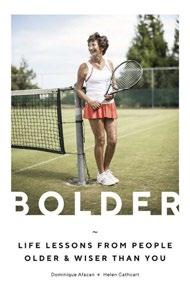
co-authored with Dominique Afacan
Cover model: Sue Kreitzman
Celebrating Colour
There are several worldwide festivities that celebrate colour in vibrant and harmonious events. Let’s take you around the world to see how colour brings people together.
INDIA AND NEPAL - Holi: Also known as the “Festival of Colors,” participants throw colored powder and water at each other to celebrate the victory of good over evil.

BRAZIL, TRINIDAD AND TOBAGO, AND VENICE, ITALYCarnival: Participants dress up in colorful costumes and parade through the streets to celebrate the season before Lent.
MEXICO - Dia de los Muertos (Day of the Dead): This holiday is celebrated on November 1st and 2nd. Families create altars with bright flowers, candles, and colorful decorations to honor their loved ones who have passed away.
THAILAND - Songkran: Also known as the “Water Festival,” participants splash water on each other to symbolize cleansing and purification during the Thai New Year in April.
Photos by Freepik
Do you need a break? We’re here for you
At Allity, we are here to support you through the planning of your loved one’s respite care. As a carer, it is important to take time for yourself to rest and recharge.
Whether you are planning a break, have appointments scheduled or should an emergency arise where immediate care is required, we are here for you.
Who can benefit from respite?
• A carer who is unwell needing time to recuperate
• Carers feeling overwhelmed and needing support with a loved one
• GP, Hospital Social Worker or Allied Health Specialist needing a patient care solution
How do I access respite?
• Getting access to respite is as simple as contacting the Allity Home closest to you for more information or assistance
Our Victorian Network
With 17 purposefully designed Homes located across Victoria, the choice is always yours. Be it affordability, convenience, luxury or a combi nation, we are here to provide the support and services that are important to you.
Allity is part of Bolton Clarke Group, Australia’s largest independent, not-forprofit provider of home care, retirement living and residential aged care.
• W ith Aged Care Assessment – Standard Respite Fees apply as well as additional services at the Home.
• W ithout Aged Care Assessment – Resident needs to be over the age of 65 and be likely to receive approval on Aged Care Assessment. Should they not qualify, Private Respite Fees apply

Avonlea Aged Care
3–7 Patty St, Mentone (03) 9545 4800
Located in the picturesque seaside suburb of Mentone, Avonlea offers modern and comfortable accommodation and peaceful gardens within a friendly community atmosphere.
Bayside Aged Care
5 McDonald St, Mordialloc (03) 8543 3100
Located 500m to the beach and 300m to the local shopping village, our Home specialises in dementia care. Residents enjoy the privacy and security of their own bedroom and ensuite in a warm, family atmosphere.
Camberwell Green Aged Care
12–14 Hunter Rd, Camberwell (03) 9888 6133

This newly renovated Signature class Home offers aspirational lifestyle and quality services of residential aged care in a small boutique apartment-style environment.


Making every day the best it can be
B16075
Claremont Terrace Aged Care
231 McKinnon Rd, McKinnon (03) 9964 9000
This newly-renovated Signature Home offers unique and stylish apartments with access to pool, gardens, courtyards and balconies. The Home is known for its exceptional dining experiences, offering choices like no other.
Glendale Aged Care
265 Heaths Rd, Werribee (03) 8742 8888
Glendale offers specialist care for people living with dementia. The Home is unique in its architectural style offering the privacy of generous apartments with ensuite bathrooms and onsite café.

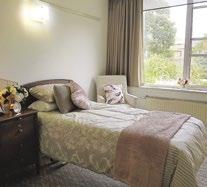
Greenview Aged Care
33–37 Mitcham Rd, Donvale (03) 8841 0800
Greenview is a sophisticated Signature class Home that is newly renovated, offering single rooms with private ensuites and a selection of elegant social spaces to enjoy with family and friends.

Highwood Court Aged Care

359 Warrigal Rd, Burwood (03) 8831 0500
A stylishly renovated Premium Home offering a contemporary home-like environment. There are enclosed courtyards, a quiet library, social lounges and a selection of newly refurbished single rooms with private ensuites.

Lexington Gardens Aged Care
18 Villa Rd, Springvale (03) 9574 6699
A Premium Home completed with 38 new room extensions, offering enhanced dining and hospitality experiences. Onsite café and a variety of different bedroom options with private ensuites.
Lilydale Aged Care
475 Swansea Rd, Lilydale (03) 9739 3300
A newly refurbished state-of-the-art Home located on the picturesque shores of Lillydale Lake. Stylish and modern communal areas and a variety of single and companion rooms designed to ensure comfort and security.
Medina Manor Aged Care

200A Smith St, Thornbury (03) 9290 6400
Located within the heart of Melbourne’s North West, offering large private rooms with ensuites. The Home specialises in caring for people living with dementia by staff specifically trained in dementia care.
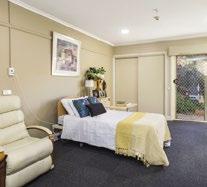


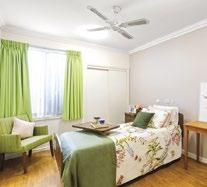
Montclaire Aged Care
18 Montclair Ave, Brighton (03) 9596 8858
Located in Brighton, this heritage listed Home is unique, offering elegant private single and couple rooms with ensuites. This Extra Service Home provides peaceful garden courtyards and a variety of intimate sitting areas.

Princeton View Aged Care
29 Heathfield Rd, Brighton East (03) 8591 0200
Freshly renovated Signature Home with the elegance of manor style architecture. Offering onsite barista café, stylish lounge, alfresco spaces and a variety of luxurious single and couple rooms with superior furnishings.

Riddell Gardens Aged Care
Corner Spavin Dr & Riddell Rd, Sunbury (03) 9218 5200
Riddell Gardens in Sunbury has an atmosphere of traditional country charm offering large single rooms with ensuites. Residents can relax and enjoy the peaceful enclosed courtyard abundant with flora and fauna.
Riverwood Aged Care
990 Padman Drive, West Albury (03) 6023 9700
Country comfort and city style with the convenience of shopping centres and services close by, the Home provides a warm and welcoming environment where family and friends are an integral part of the Home’s special community.
Tannoch Brae Aged Care

46 Aldershot Rd, St Albans Park (03) 5248 5814
Located in St Albans Park, designed to ensure comfort and quality care in a home-like environment. The Home offers a peaceful enclosed courtyard, a variety of quiet sitting areas and spacious rooms with ensuites.
Templestowe Manor Independent Living and Aged Care
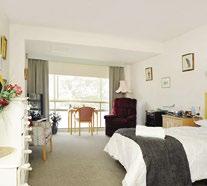
410–418 Thompsons Rd, Lower Templestowe (03) 9850 8877
A Signature Home that presents quality internal furnishings and landscaped gardens. 20 independent living units co-located with residential aged care with newly refurbished apartment style suites.
Trevi Court Aged Care

95 Bulla Rd, Essendon (03) 9374 3500
Encompassing a friendly community atmosphere where family and friends are always welcome. Spacious, vibrant and classic in style this Home offers the privacy of spacious rooms with ensuite facilities and a variety of quiet sitting areas.
www.allity.com.au
Ita TwoPart
The Legend
She’s one of the country’s living treasures: a publishing legend, best-selling author, advocate for older Australians and those with dementia, and chair of the ABC. ACG publisher Paul Koury continues this honest and insightful interview with Ita Buttrose.
Paul Koury: I know of many aged care facilities that have waiting lists and yet their beds remain empty beds because there’s just no staff to care for them. Why do you think there is a concerning shortage of carers within Home Care and our residential facilities?
Ita Buttrose: While there are a few things, the obvious one is the need for better working conditions and commensurate pay for the work they do. It’s not well paid at all.
We need to lift them up by lifting their pay.
Paul Koury: I spent many years visiting my mother in her nursing home and saw the incredible work they do. I thought they were fantastic and always had a great attitude of love, care and nurture. They are special people who would do things beyond service and things that most won’t even entertain.
Paul Koury: What did you think of the Royal Commission’s final report titled Care, Dignity and Respect.?
Ita Buttrose: Respect is the keyword. I believe that our

older Australians and those with dementia should be valued and treated with the respect they deserve. It’s crucial for their well-being not to be written off just because they are old. The Report contained over 100 recommendations, and I believe the government agreed to most of them which is good news.
Now we need to see their recommendations implemented, particularly the need for more trained staff.
Ita Buttrose: You don’t have to convince me. Some carers have moved on to find better paying jobs, some to find better conditions and some to find appreciation and respect for the work they do. In the two years since the final report was released, the cost of living has risen dramatically. Providing better working conditions and lifting their pay rate substantially would make a huge difference. I believe carers will be attracted to the profession as a result of these incentives.
I AUSTRALIAN CARERS GUIDE 22

AUSTRALIAN CARERS GUIDE I 23
If a carer can no longer work, then their loss of income usually results in a great drop in their quality of life.
Paul Koury: Let’s not forget our unpaid carers who desperately need an increase in the carer payments as well. Deloitte released a report last year that said that because some 1.3 million elderly people are being cared for at home by their loved ones, the government saves around $77 billion a year from the healthcare sector. Concurrently, carers receive only $140 a fortnight which for fulltime 24/7 carers equates to just 43c per hour. It’s a little unbalanced and unfair, don’t you think?
Ita Buttrose: I know the financial pressures that many of our unpaid carers are under which certainly makes life far more difficult for them, and it should not be so. Even more so for carers who work. If a carer can’t go to work or wants time off because their loved one needs help, some bosses get annoyed which can place people’s jobs at risk. If a carer can no longer work, then their loss of income usually results in a great drop in their quality of life. People are living longer, so carers are caring for longer. Being a carer is such a demanding role, and they should be compensated accordingly.

Paul Koury: We’ve known this for years and years. We live in an ageing society. But what can the government do about it?
Ita Buttrose: Sooner or later, providing care for older Australians was going to put special pressure on the
government’s budget. Like all fiscal decisions, it’s a matter of priorities.
Paul Koury: What do you mean by priorities?
Ita Buttrose: The government doesn’t have a bottomless pit of money so it has to work out where it can spend and where it can’t spend. Perhaps it needs to ask itself: Is aged care more important than sport? More important than childcare? Maybe we need to limit the population. I don’t know what the answers are, but we need to have a discussion about the challenges ahead. Aged care and growing older aren’t going away any time soon. These are the serious questions and conversations that the government should be having.
Paul Koury: Speaking of serious questions, there seems to be a lot of carers who haven’t created an Aged Care Plan. I remember when we did ours with our mother, we also talked about a plan if something were to happen to us. Why do you think this is important?
Ita Buttrose: Having a frank discussion with someone you care for is very important. You need to know what to do when the unexpected happens.
It could be things like driving. What happens when the time comes when it is no longer safe for an older person to continue driving. Would they be willing to surrender their license? Is there a plan to give them some alternative means of transport?
I AUSTRALIAN CARERS GUIDE 24
People are living longer, so carers are caring for longer. Being a carer is such a demanding role, and they should be compensated accordingly.
Just think about it - How would you cope if you couldn’t drive? Do you live near public transport?
On the other end, do you know what their end-of-life wishes are? Maybe they want to live at all costs, or perhaps they want a do not resuscitate directive (DNR).
These are not easy things to discuss but they must be talked through.
Then there’s you, the carer. What happens if you get an illness that limits the care you can provide? Who will care for your loved one?
There are so many things to discuss which is why it’s essential to have a plan in place and make important decisions while you’re well and able to do so.
Paul Koury: I couldn’t agree with you more. Those who would like help or more information on what points should be included in a care plan can find out more at Advanced Care Planning Australia.
Paul Koury: Everyone I talk to about you remark on how incredibly well you look. You obviously take care of yourself. Do you think that as well as aged care planning, we should have a self-care living plan?
Ita Buttrose: Yes, we are all living longer so we should all have a plan to maintain our health as best we can. It crucial that we don’t let ourselves go. That means watching our weight, exercising regularly, having interests, and being socially active ourselves.
We should get up in the morning and think, who needs me, what can I do to help myself or someone else?
It’s no good thinking, I’m lonely and feeling sorry for yourself. We are all lonely at some time or another. You have to push yourself to participate.
We’re not meant to live isolated lives. And if there is no one around or accessible on a particular day, then read a book and stimulate your mind as well as entertain yourself.
Paul Koury: So, you think that there is some personal responsibility and actions our elderly can take to keep themselves as buoyant as possible?
Ita Buttrose: Yes. I know some older people tend to isolate themselves, however, there are some simple things we can do. It could be as simple as saying, good morning or saying hello to someone you may not know. I sometimes say hello to people that I know will not say hello back, and I conversely say hello to them every time I see them until I get them to say hello back. With getting older, things change. We will have some of our friends die and we will have to make new friends. We may never replace old friends, but we can make new friends.
Paul Koury: What are your thoughts on our housing crisis?
Paul Koury: I agree, however not everybody has the same personality as you. Obviously, you’re an extremely high achiever. You’ve got the energy; you’ve got the attitude that drives you forward and that’s why you are still at the top of your game.
Ita Buttrose: Well, you wouldn’t want everyone to be like me. And I don’t wish everyone to be like me, but if you are here and you are alive, you have to say to yourself, how do I want to live?
Ita Buttrose: Ah, social housing. I have shared my thoughts about this issue at some of the recent functions at which I’ve spoken. I think that the government needs to have some sort of agreement in place before granting permits to developers. For instance, if developers apply to build a complex or apartments, they should be required to provide a few social housing units, whatever the ratio is.
Paul Koury: Great idea. please share more…
Ita Buttrose: Let’s say that one out of every ten apartments has to be social
1.3 million elderly people are being cared for at home by their loved ones
AUSTRALIAN CARERS GUIDE I 25
housing. I don’t see how else we’re going to fix the problem.. So, it’s fine to keep selling large plots of land off to developers if that’s what we must do, but you have to think about the people who can’t afford these places and what are we going to do about it?
I’m looking outside my office window and I can see that there are lots and lots of apartments going up. I can tell you that people on a pension wouldn’t be able to rent them let alone afford to buy them. But they are ideal not only for older people but care workers as these apartments are close to town, hospitals and transport.
Paul Koury: I believe you’ve even written a book, “How much is enough?”
Ita Buttrose: It’s about planning for retirement and how much a person needs to live comfortably in retirement. Someone once said to me that for people who are really wealthy, enough is never enough.
Paul Koury: So true. But we should view success as not merely a question of monetary profit, but also social and environmental responsibility. In the absence of any direct accountability by our government for developers to show community and environmental responsibility, making as much money as possible is what they will keep doing.
Ita Buttrose: I mean, you can see people paying 50 million and a hundred million for houses and you just think, really?
Paul Koury: And I bet some are empty and have no occupants.
Ita Buttrose: Precisely. Why don’t they put their excess money into social housing? Or, why don’t they just give it away?
superannuation. The “experts” felt that people with mega millions, were abusing the purpose of a retirement fund and making it more of a tax haven. The rest of us have a relatively small amount in superannuation to get us through the last years of our lives which is the way it should be.

I suspect the government might be going to have a look at superannuation. They might be thinking of a different way of taxing contributions. Won’t be an easy thing though as wealthy people have savvy accountants who know how to do all sorts of things that the rest of us don’t.
Paul Koury: We might all be in the same ocean, but we are not all in the same boat.
Ita Buttrose: I do think there could be increased philanthropy in Australia. We’re not renowned for being the most generous of philanthropists.
Paul Koury: If they don’t give it away or use their excess to help our community. It might just be taken away from them in other ways.
Ita Buttrose: Interesting that you say that. I was listening to the radio this morning and some “experts” were talking about the money some people have in
Paul Koury: Well, Ita, I can’t thank you enough for your time. I appreciate every second I’ve had with you and I know our readers will be blessed by the things you have openly shared. Ita Buttrose: You are most welcome, Paul and congratulations once again on putting together this wonderful magazine. ACG
PART 1 of this interview can be found in the Autumn issue.
It’s about planning for retirement and how much a person needs to live comfortably in retirement.
I AUSTRALIAN CARERS GUIDE 26
Your family is our family.
For the team at Oak Towers Aged Care, care is our calling. We are passionate about making a difference in the lives of the people who call Oak Towers home.
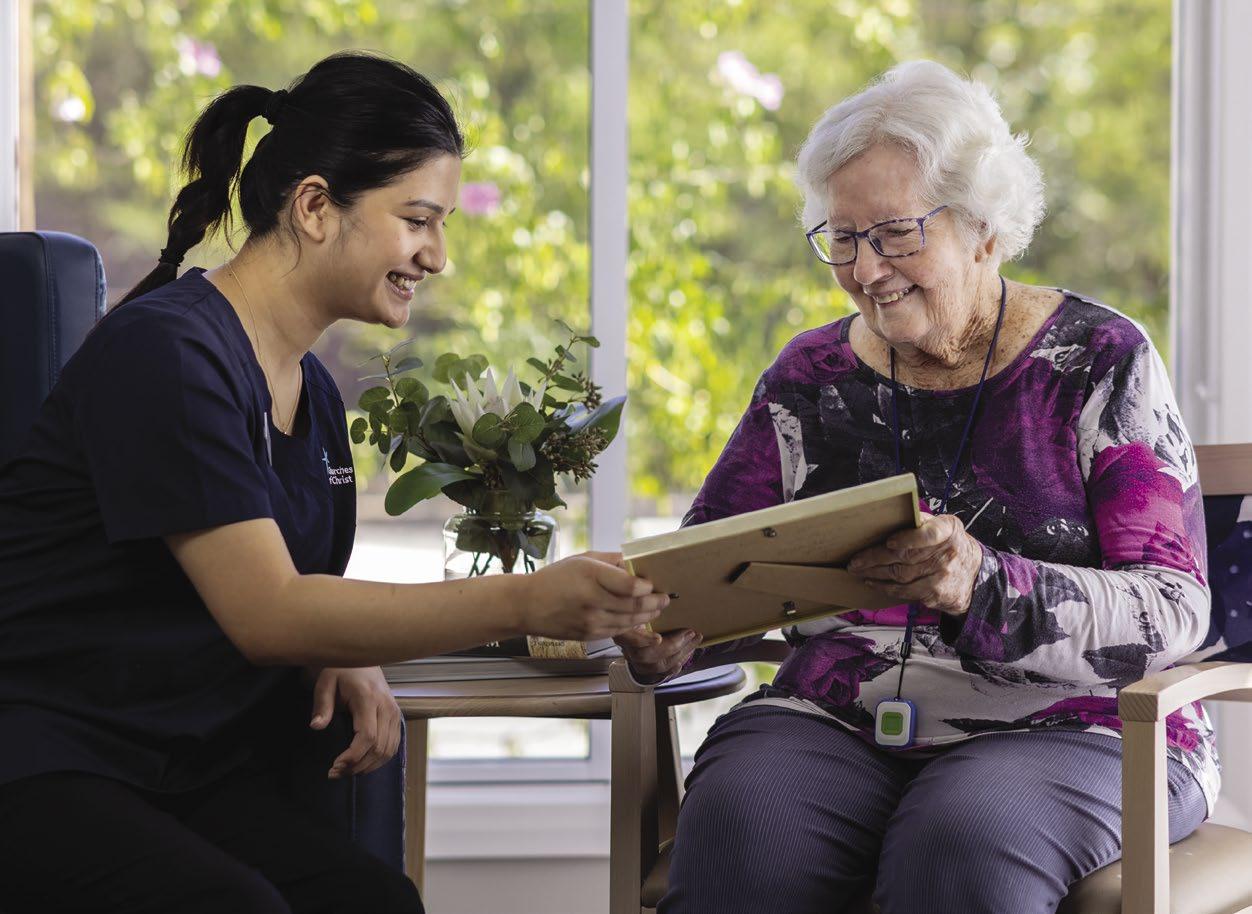
We take the time to get to know what’s important to you, and your loved one, including their care needs, interests and worries. Then, we design a holistic care and lifestyle program to enrich their physical, mental, and spiritual health.
In our warm and welcoming community, your loved one will enjoy nutritious meals cooked onsite daily, beautiful courtyard gardens, friendly live-in pets, and a range of fun activities. But, most importantly, your loved one can continue doing the things they enjoy most with peace of mind that support is on hand when they need it.
Let us take care of you and yours.
We can provide:
• Residential care
• Respite care
• Palliative care
• Dementia care
• Pastoral care
4.4 STAR GOOGLE RATING* 139 Atherton Road, Oakleigh VIC 3166 OAK TOWERS AGED CARE Book a tour today! Call 1800 900 001 or visit cofc.com.au/oak-towers *Correct at the time of printing
WAYS TO FIND 5happiness

I AUSTRALIAN CARERS GUIDE 28
The role of family carer is not unlike other important roles we may play in life— bride or groom, mother or father— except for one thing: It doesn’t come wrapped in happiness. You don’t enthusiastically share with co-workers that your mom has Stage 4 lung cancer or excitedly tell neighbours that your husband was just diagnosed with Alzheimer’s. But there are ways for family carers to find happiness in their caring journey. In fact, happiness research has become a dominant theme of many scientific health investigations— more than 14,000 studies since 2012—and in the words

UNKNOWN
of psychology professor at the University of California Riverside Sonja Lyubomirsky, “Happiness research is the new Holy Grail of science.” When it comes to caregiving, these experts believe happiness is a life choice. It is within a carer’s grasp no matter your life situation, socioeconomic status or where you live. The following is advice from scientific and aging experts on the pursuit of happiness and five prescriptions for family carers to create joy along their journey:
“Joy often sneaks through a door you didn’t know you left open”
As we move through life, there are so many things that can affect our well-being. Keeping an eye on the positive things that make us smile and bring joy is key to happily navigating the hustle and bustle of everyday activities. Here we take a look at what that may mean for those of us in a caring role.
AUSTRALIAN CARERS GUIDE I 29
BY SHERRI SNELLING
LEAN INTO MEANINGFUL RELATIONSHIPS

Many studies show the happiest, and often the healthiest, people have quality relationships in their lives that tend to include family, friends and community. Too often, however, carers lose touch with many friends, co-workers, neighbours and others. This isolation and loneliness—both for older adults and for family carers—can be the health equivalent of smoking 15 cigarettes per day. The landmark Harvard Study of Adult Development, which began 77 years ago, is the longest running look at health and happiness. Researchers found it is not the quantity of relationships, it is the quality that counts. “You can be in a crowd or in a marriage and be lonely and disconnected,” shared psychiatrist Dr. Robert Waldinger, current director of the Harvard study, at a TED event. “Loneliness is toxic,” he continued but stated that quality relationships where you can count on people in times of need make us happier and even make our brains sharper. Laura Carstensen, founder of the Stanford Center on Longevity, underscores this quality relationship concept. Her socioemotional selectivity theory research found that we naturally prune our relationships as we age because we understand shrinking time horizons. We invest more time in smaller groups and focused activities that lead to happier experiences. By investing only in quality interactions, she says, “Older people are happier.” Do not avoid or lose relationships that matter to you. Carve out time for those meaningful friendships.

PRACTICE POSITIVITY, FIND YOUR HAPPY PLACE
Lyubomirsky, has spent years studying happiness and its health impacts. One of her projects required participants to think about happy events for just eight minutes every day for three simultaneous days. The results showed that participants had higher life satisfaction levels for the following four weeks at higher levels than they felt before they joined the study. Visualize places, people, and memories that make you happy for a few minutes a day and feel the residual positive feelings for weeks.

1
2
I AUSTRALIAN CARERS GUIDE 30
3
FIND YOUR TRIBE
In the same spirit as pursuing quality relationships, bestselling author Dan Buettner recently published his fourth book in his Blue Zones series, this one devoted to finding happiness. His globetrotting research in happiness hot spots such as Costa Rica, Denmark and Singapore found if you can find a balance of pleasure, purpose and pride in life, you can achieve happiness even in tough, challenging times. In fact, it is this trifecta of balancing the three P’s that can help carers weather setbacks and crises when caring for a loved one. One of Buettner’s tips is to “find your tribe.” He writes that research shows we are “genetically hardwired to cluster into groups of familiar people who share our values.” Typically this includes younger and aging family members but can also include friends such as those of a similar faith. Rely on your tribe to help. If you accept the concept that the tribe you have chosen—family, friends, faith— will have your back in troubling times, now is the time to ask them to share the care so you can get a break. 4
12 Australia’s ranking for happiness.
Finland has top position
SOURCE: 2022 WORLD HAPPINESS REPORT







ENJOY HUGS, HUMOUR AND HYGGE
Research has looked at the health benefits of a good bear hug. When welcome, it releases oxytocin—the “feel-good” hormone—in our bodies. Scientists have found hugs boost immunity to ward off colds, help calm anxiety and even have a neuroprotective factor to boost brain health. Neuroeconomist Paul Zak prescribes at least eight hugs a day that last 20 seconds each to reach the optimal health benefit from the oxytocin release. Humour can also be therapeutic. Laughter relaxes the muscles in the whole body, decreases the stress hormone to boost immunity and—by increasing blood flow—helps protect the heart against cardiovascular problems. Last but not least is the Danish art of hygge (pronounced HUE-gah) which literally translates as “cosiness.” Many of us need calm; we need to occasionally pause our digital interruptions and unplug from technology. Hygge means finding warmth and quiet time or personal interaction with one or more people where you connect through eye and other physical contact. Whether it is curling up with a good book, going fishing, playing card games with friends or family, just relax and enjoy the moment. For further practical resources, see our Gather My Crew article in this issue.
AUSTRALIAN CARERS GUIDE I 31
ACCOMPLISH ONE SIMPLE THING A DAY
According to noted psychology author and researcher Mihaly Csikszentmihalyi, “Flow is when the best moments in our lives are not the passive, receptive, relaxing times … The best moments usually occur if a person’s body or mind is stretched to its limits in a voluntary effort to accomplish something difficult and worthwhile.” Essentially, flow means finding your strengths and then using them to the best of your ability. However, we have to embrace the caring experience— welcome it, relish it—in order to have the flow and happiness that Csikszentmihalyi prescribes. Author Gretchen Rubin’s bestselling book, The Happiness Project, spawned a movement to create joy in our lives every day. She advises that very simple life tasks (such as making your bed) when done on a daily basis, can actually spark happiness.
Sherri Snelling is a corporate gerontologist, author and CEO of the Caregiving Club with an expertise in caregiver wellness, brain health and Alzheimer’s disease and aging in place design concepts. Visit caregivingclub.com.
All images by Shutterstock


5
The best moments usually occur if a person’s body or mind is stretched to its limits
I AUSTRALIAN CARERS GUIDE 32


1300 698 624 vmch.com.au/carers
CREATING A SAFE & SUPPORTIVE Home Environment
for an Aging Parent
Creating a safe and supportive home environment for aging parents is essential to ensure they can continue living independently and enjoy their golden years with dignity. From installing grab bars in the bathroom to decluttering their living space, there are many simple steps that you can take to make your parents’ home safer and more comfortable. Fortunately, a few simple precautions can prevent most falls in the home. The following helpful tips will guide you through a series of modifications to make your parent’s home safer and more comfortable.
Challenges of Aging & Potential Risks
As we grow older, the places we consider our homes can pose a more significant challenge to navigate. There are various factors that can make things harder and
increase the risk of accidents and injuries. Below are some of the challenges that your aging parent may have to face:
1. Decreased mobility and balance
As individuals age, their mobility and balance may decrease due to a variety of factors, such as muscle weakness, joint pain, and reduced flexibility. This can increase the risk of falls, resulting in serious injuries such as fractures, head trauma, and bruises. Some potential risks associated with decreased mobility and balance include:
• Tripping on loose carpets,
rugs, or cords
• Slipping on wet floors
• Losing balance while climbing stairs
• Losing balance while getting in and out of a bathtub or shower
• Losing balance while reaching for objects on high shelves
2. Changes in vision
A change in vision, such as cataracts, can make it challenging to see objects clearly, especially in lowlight environments. This can increase the risk of accidents and injuries, particularly if the aging individual navigates an unfamiliar area of their home. Some potential risks associated with vision changes include:
• Tripping over objects that are difficult to see
• Misjudging the distance between objects can result in collisions or falls
• Having difficulty reading labels on medication bottles, which can result in incorrect dosing
As our loved ones age, it’s natural for us to worry about their safety and well-being, especially when they are living on their own.
I AUSTRALIAN CARERS GUIDE 34

AUSTRALIAN CARERS GUIDE I 35
As individuals age, their mobility and balance may decrease due to a variety of factors
3. Hearing loss
Hearing loss caused by aging can pose a safety risk if emergency alarms or warnings go unnoticed. Some potential risks associated with hearing loss include:

• Not hearing smoke alarms, which can delay evacuation in the event of a fire
• Not hearing the doorbell or phone, which can result in missed appointments or deliveries
• Not hearing warnings or announcements in public spaces, which can increase the risk of accidents or injuries
Assessing the Home Environment
Creating a safe and supportive home environment for an aging parent begins with a thorough assessment of the home environment. This assessment should identify potential hazards and evaluate the accessibility of key areas within the home.
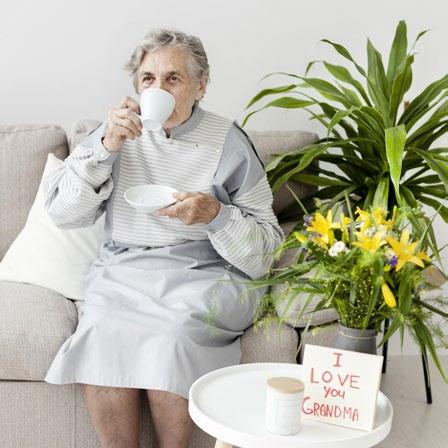
Identify Potential Hazards in the Home
The first step in assessing the home environment
is identifying potential hazards that may increase the risk of falls or accidents. Uneven flooring, poor lighting, and clutter are common hazards that should be addressed. Ensure that walkways are clear and free from tripping hazards. Installing grab bars or handrails in high-risk areas such as the bathroom can also help reduce the risk of falls.
Consider the Layout of the Home
The home layout should be evaluated to determine if modifications are needed to accommodate the parent’s mobility or cognitive abilities. Consider installing ramps or stairlifts to improve mobility or rearranging furniture to create wider walkways. If the parent is experiencing cognitive decline, labeling cabinets or drawers with important items can help them find what they need more easily.
Evaluate the Accessibility of Key Areas
Key areas such as the bathroom, kitchen, and bedroom should be evaluated for accessibility. Make sure that there are no tripping hazards in the bathroom and that grab bars are installed where needed. Consider lowering countertops or installing pull-out drawers in the kitchen to make accessing items easier. In the bedroom, ensure that the bed is comfortable and has ample lighting for reading or other activities.
Making Physical Modifications
When it comes to ensuring the safety and accessibility of a home for an aging parent, physical modifications can be incredibly helpful. Here are some modifications that you may want to consider:
1. Make safety modifications:
• Add handrails along staircases and in high-risk areas like the bathroom
• Install grab bars in the shower and near the toilet

• Remove tripping hazards like loose rugs or cluttered walkways
• Improve lighting to reduce the risk of falls
2. Improve accessibility:
• Install ramps for easier access to the home
I AUSTRALIAN CARERS GUIDE 36
Hearing loss can pose a safety risk
All Images by Freepik
• Widen doorways to accommodate mobility aids like walkers or wheelchairs
• Lower countertops in the kitchen for easier access
• Install pull-out drawers in cabinets for easier access to items
Making these physical modifications can greatly improve an aging parent’s quality of life and safety in their home. It is important to consult with professionals and experts to ensure the modifications are done properly and safely.
Utilising Assistive Devices
Numerous assistive devices are available to improve older parents’ quality of life and help them navigate their home environment more easily. Here are some examples to consider:
Mobility aids:
• Canes, walkers, and wheelchairs can help improve mobility and reduce the risk of falls.
• Stairlifts and ramps can make it easier to navigate stairs and enter/exit the home.
Hearing aids:
• Hearing aids can improve the parent’s ability to communicate and hear alarms or warnings.
• Amplified telephones and doorbells can also improve communication and safety.
Communication devices:
• Devices like tablets or smartphones can help the parent stay connected with family and friends, access medical information, and even control devices in the home like thermostats or lighting.
Using assistive devices can make aging parents more independent and confident in navigating their home environment. It is important to consult with professionals and experts to ensure the devices are fitted and functioning correctly.
Creating a Supportive Environment
You can create a supportive environment for your aging parents by following these steps:
Supportive Environment
Creating a supportive environment for aging parents involves making the necessary modifications to the home to ensure safety and accessibility. Regular transportation for errands and appointments can also ease their daily stress and provide a sense of independence. Also, hiring a housekeeper or lawn care service can enhance their living space by maintaining a clean and organized environment.
Many older adults have the desire and the ability to live safely and independently at home but need a little help.
Take steps now to ensure your parents’ safety and the home environment. We wish you the best of luck creating a safe space for your aging parent! ACG
AUTHOR: Evelyn K. Grier is a writer and editor with years of experience in the healthcare industry.
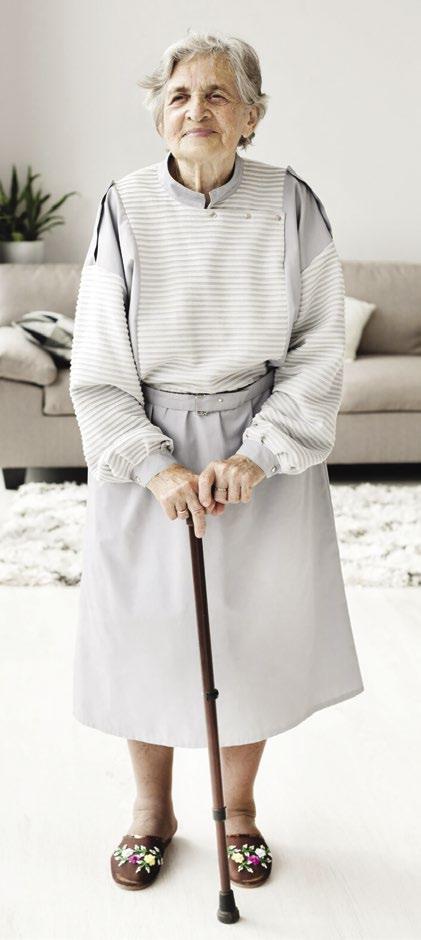
AUSTRALIAN CARERS GUIDE I 37
Canes, walkers, and wheelchairs can help improve mobility
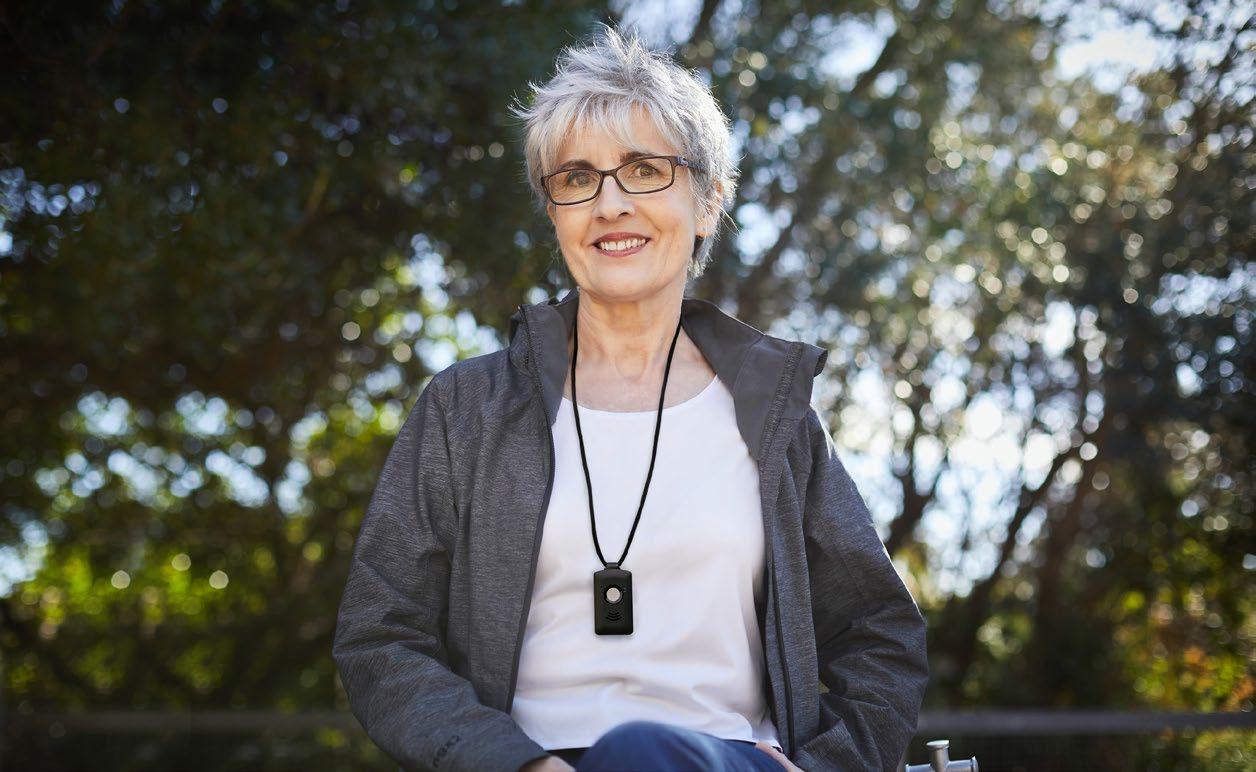
ELDERLY HOME SAFETY CHECKLIST
BATHROOM KITCHEN BEDROOMS HALLS & STAIRWAYS GENERAL
�� �� �� STAIRS RUG
■ Grab bars in shower/tub and by toilets
■ Bath seating or a shower stool
■ Non-slip mat in tub
■ Install a toilet seat riser
■ Remove clutter or debris on floor to reduce chance of trips and falls
■ Remove locks from doors for easier accessibility by family or first responders in an emergency
■ Multiple bath mats with non-skid backing
■ Ensure smoke detec- tors are present and working properly
■ Make sure a fire extinguisher is avail- able and easy to access
■ Place food and dishes in cupboards and cabinets within reach
■ Stock kitchen with no-prep or easy-to-make meals
■ Replace small appliances, such as toasters and slow cookers, with auto shutoff features
■ Install auto shut-off device on stove
■ Cleaning products and poisonous materials are easily identified and stored separately
■ Ensure that lights are accessible
■ Lamps have pull chains for easy access
■ Phone and charger within reach of bed
■ Heating/air conditioning working properly
■ Extra blankets easy to access
■ Replace bed frame with low-profile frame if getting in and out of bed is difficult
■ Install a night light
■ Install handrails on both sides of stairs
■ Cover wood or tile stairs with non-slip carpet runners
■ Motion lighting or night lights in hallways
■ Non-skid rugs or carpet runners on hard flooring in halls
■ Clutter and debris removed from stairs
■ Secure area rugs or replace with heavier, non-skid rugs
■ Replace rugs with curled edges that can cause a fall
■ Ensure dailyuse items are within reach and easily accessible
■ Replace round door handles with levers for arthritic seniors
■ Install carbon monoxide detectors
■ Check that outdoor stairs and railings are present and sturdy
■ Ensure cords and cables are out of footpath to prevent trips
AUSTRALIAN CARERS GUIDE I 39
Gateway? What is Carer
Carer Gateway is an Australian Government program providing free services and support for carers.
If you care for a family member or friend with disability, a medical condition, mental illness, or a person who is frail due to age, then Carer Gateway can help you.
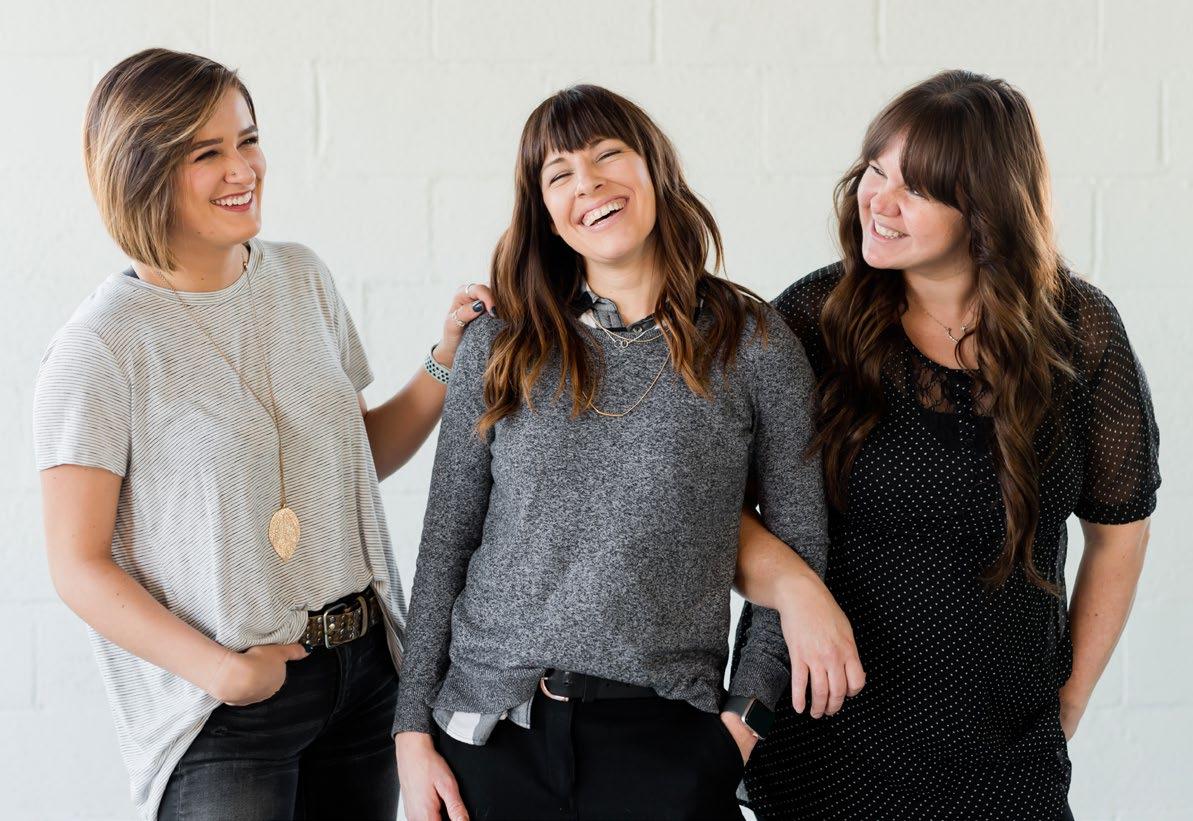
The Australian Government works with a large range of health and community care organisations across Australia, known as Carer Gateway service providers, in order to deliver services to carers no matter where they live in Australia.
Introduction of Carer Gateway
Carer Gateway was first introduced in 2015 as a website and phone line to help carers find and access the right support to help them in their caring role.
Carers have access to a range of tailored supports and services, to help them manage daily challenges, reduce stress, plan for the future and ultimately improve their well-being.
Carer gateway in its current form was
implemented in a two-phase approach, with the first phase implemented in July 2019 and the second from April 2020.
Phase One included the introduction of new online and phone-based supports including free phone counselling, online peer support, self-guided coaching, and practical educational resources. These supports aim to improve carer wellbeing, skills and their knowledge.
Phase Two followed to include the delivery of in-
I AUSTRALIAN CARERS GUIDE 40
person services through organisations across Australia known as Carer Gateway service providers. What Services and support do they offer Carers can get a wide range of help from counselling and peer support groups, to respite care, home help and use of equipment.
Services are delivered in-person, online and over the phone, and are available to all carers no matter their age or where in Australia they live.
Carer Gateway packages are tailored to your needs. All caring situations are different and what benefits you may not be so helpful for others. Call Carer Gateway and speak to your local service provider to begin the planning process.
Carer Gateway provides many services to support carers in their caring role, which include:
• In-person and online peer support groups –you might like to meet with people like you who care for someone, and share stories, knowledge and experience. You can do this with people in your area or you can join the carer forum online.
• Tailored support packages – these are supports and services tailored to help you in your caring role. You may be able to get:
• services or equipment to help with your education - for example, tutoring, educational supplies or training courses.
• Planned respite, where a service provider steps in to take care of your family member or friend while you take a break
• cooking and cleaning services
• assistance with shopping
• transport, to help you do things like go to medical appointments or do shopping
reflect on your experience and needs, identify personal goals and create a plan to reach these goals, or you can work through interactive online coaching sessions at your own pace. There are a range of topics to help you in your caring role.
• Online skills courses – carers can learn new skills in caring for someone and their own wellbeing, including dealing with stress and legal issues. Each course covers a different topic and you can complete them online at your pace and in your own time.
• Emergency respite –if you get sick or hurt unexpectedly and you can’t continue to look after the person you care for, emergency respite services can help to take care of them while you get better. Call 1800 422 737 at any time for help with accessing emergency respite.
• In-person and phone counselling – if you are feeling stressed, anxious, sad or frustrated, a counsellor can talk with you either in-person or over the phone in the comfort of your own home.
• In-person and online self-guided coaching – you can talk to a professional coach to
In-person peer support
groups
Carer support groups enable carers to meet with other carers in their local community in a safe and supportive environment. The groups are led by a facilitator who will work with your group to design and run a program with topics of interest to you, and also give you the opportunity to build connections with the other carers.
AUSTRALIAN CARERS GUIDE I 41
Photos by Adam Winger on Unsplash
Services are delivered in-person, online and over the phone.
To find out more about the in-person peer support groups available near you, call Carer Gateway on 1800 422 737, Monday to Friday, 8am-5pm and select Option 1 to speak with your local Carer Gateway service provider. They will register you with Carer Gateway and start the planning process.
Online community forum
The online community forum gives carers a safe, moderated space to come together and ask questions, share advice and experiences and gain emotional support.

You can read through previous discussions or create a login account to start a new discussion topic or youcan add to an existing discussion.
All forum users remain anonymous, and there are trained moderators to ensure the space is safe, friendly and helpful for everyone. Find out more about the forum and join.
What is respite
‘Respite’ or ‘respite care’ is when someone else takes care of the person you care for, so that you can have a break. A break can give you time to undertake everyday activities or to relax, to deal with any stress and look after yourself.
What does respite care involve Respite care can be given by family or friends or by a respite service. It can take place at home, in the community, at a centre or in a residential care facility.
Respite care can be:
• for a short time (for example, for a few hours each week)
• for a longer time, including overnight (for example, a weekend)
Services like My Aged Care or the National Disability Insurance Scheme (NDIS) may support respite care for the person you care for.
Some community organisations offer care for particular groups (for example, activities for children or cultural groups). They may also offer activities for the person you care for, such as social events or therapy sessions. This can give you time for yourself. Some carer groups also offer activities for carers (for example, morning teas or yoga classes) to help you get a well-earned break.
How do I access Carer Gateway Services?
Carers can talk to someone about accessing these services by calling Carer Gateway on 1800 422 737 (selecting Option 1) Monday to Friday between 8am and 5pm local time or visiting the website carergateway.gov. au and requesting a call back. They will talk you through the registration process and start the planning process. This process helps the Carer Gateway staff learn more about you and your caring role so they can match services to your individual needs. ACG
The online community forum gives carers a safe, moderated space
I AUSTRALIAN CARERS GUIDE 42
Carer Gateway coaching inspires artist
Thuc lives in Melbourne’s west and registered with Carer Gateway in March 2022. Thuc, who has a Bachelor of Fine Art and a Diploma in Graphic Art, has been in her caring role for more than 13 years.

She previously worked in animation, and once painted a piano for the Vietnamese Families with Special Needs Play Me, I’m Yours project, which places pianos in public places for people to play.
However once Thuc married and had children, she became focused on her family.
After Thuc registered with Carer Gateway, she began using the free coaching service for carers.
Thuc has since worked with Merri Health carer coach Brenda to focus on goal setting, future planning and identifying actions to take to achieve her goals. The carer coaching supported Thuc to reach her personal goals and reclaim her artistic identity now that her children are older and she has capacity. Alongside wanting to work on her own art pieces, Thuc wanted to be a part of a creative
community. The coaching helped her identify and join art hubs where she could meet like-minded artists to help achieve this. Thuc’s ultimate goal is to one day have her own art exhibition.
Thuc is well on her way to reaching her goals! The coaching has reignited her artistry. Thuc has expressed feeling like her life is starting again, and that she is enjoying her day-to-day life more.
If you provide unpaid care for a family member or friend with disability, mental illness, addiction, age or health issues, contact Carer Gateway. Apart from carer coaching, Carer Gateway offers free peer group support, emergency respite care, counselling, information, tailored support packages, and skills courses.
Where carers can find free support, visit carergateway.gov.au today or call 1800 422 737.
Relationships dementia &
Living with dementia increases the complexity of intimate and family relationships and, as dementia progresses, these need to be reframed and constantly renegotiated.

I
GUIDE 44
Photo by Matt Bennett on Unsplash
AUSTRALIAN CARERS
I DEMENTIA I
The experience of dementia is different for everyone and is influenced by a range of factors. Each individual with dementia, their carer/s and family, will experience different challenges as dementia advances and relationships change. This process can be unpredictable, individual and inconsistent.
As dementia symptoms progress and the person’s abilities change, you may find yourself gradually taking sole responsibility for tasks previously managed by your loved one. This may happen without you making a conscious decision to do so. Some tasks may require you to learn new skills. Others may also impact on aspects of your relationship as you adapt to this new role
of ‘carer’. It is important to take care of yourself and seek support when you need it.
What happens if the partner of a person living with dementia

wants to start a new relationship?
As the caring role changes, partners may feel a shift in the balance in their relationship. Deciding to
AUSTRALIAN CARERS GUIDE I 45 I DEMENTIA I
Partners may feel a shift in the balance in their relationship
start a new relationship is a personal choice and a consideration that can sometimes happen when the person living with dementia moves into residential care.
In many situations where this occurs, the new relationship may develop out of a need for comfort and companionship that is no longer available. Often partners continue to visit and support their loved one living with dementia.
There is the potential to feel a sense of guilt or that the partner is cheating on the person living with dementia. However, continuing to support the person living with dementia in care, alongside developing a relationship to meet the partner’s own needs for comfort and intimacy, can be a positive way to maintain wellbeing for both the person living with dementia and their partner.
What happens if the partner wants to end their relationship with a person living with dementia?
This consideration does arise for some partners as taking on the role of carer can be a demanding one both physically and emotionally.
Some partners may not have the physical or emotional resources to care for a person living with dementia for an undefined period. There may also be
Tips to take care of yourself
• Pay attention to your diet and exercise.
• Maintain your social contacts.
• Balance your own needs with caring daily demands.
• Contact support services to arrange regular respite from your caring role.



• Attend support group meetings and carer education workshops. These are great for learning new tips and strategies from professional facilitators as well as from other participants who are going through similar. Many organisations throughout Australia offer support groups for carers.
• Appreciate that even with the best intentions, you may cause some discomfort or agitation for the person you are caring for. Do not judge yourself harshly in these situations and accept that you are providing care in the best way you can. Both of you are learning.
historical factors in the relationship that partners consider when deciding to become a carer, or to leave a relationship.
Identifying and acknowledging the partner’s own limitations is a wise approach and supports the wellbeing of both the partner and the person living with dementia.
Engaging family, friends or professionals in a support network and leaving a relationship is not failing but can be an essential approach for some couples in navigating complexities that may arise after a diagnosis of dementia.
If you live with dementia or are in a relationship with a person that does, we are here for you. Call us any time on 1800 100 500. We are available 24 hours a day, seven days a week, 365 days a year. ACG
AUTHOR:
Maree McCabe AM, CEO, Dementia Australia

I AUSTRALIAN CARERS GUIDE 46 I DEMENTIA I

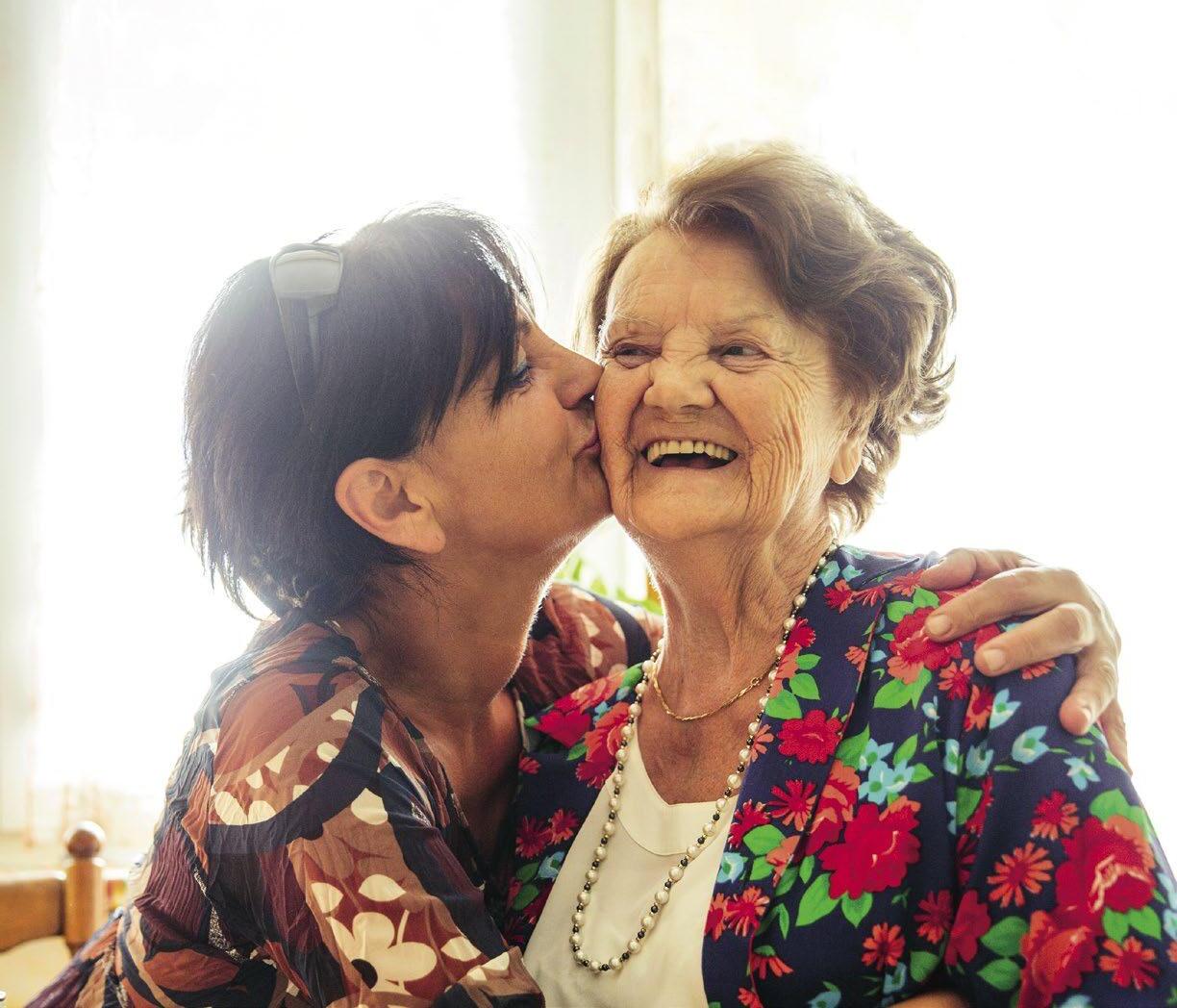
RESIDENTIAL Aged Care Call 13 22 78 Baptcare has 16 aged care communities in metropolitan Melbourne and regional Victoria and Tasmania. y Residential respite care y Permanent residential care y Palliative care y Freshly prepared, nutritious meals y Registered nurse on site 24 hours a day, 7 days a week y Allied health practitioners y Lifestyle activities y Lounge, dining and recreational areas. baptcare.org.au A place that’s right for you !
Baptcare provides a wide range of services to support older people to live their best life at home.

y Transport to social events, shopping or appointments
y Social support groups
y Day/overnight respite
y Meal preparation
y Nursing and allied health.
y Help around the home including vacuuming, changing sheets, cleaning, gardening
y Help with daily tasks such as showering or dressing.
Call 13 22 78
baptcare.org.au
Home Care SERVICES
Home Need some help at ?
BY JEAN KITTSON
TIME MOVE? to
There always comes a point, usually after an incident of sorts - a burn from the oven, a fall, the loss of eyesight, loss of memory, the death of a partner, or the house just plain falling apart because Dad can’t do the maintenance anymore –when we look at our parents and ask ourselves, ‘Is it time for them to move to a retirement village or even an aged care home’?

Traditionally, we do not ask them first. Perhaps we suspect they will have the
whole bowling club filling sandbags for barricades while Dad tinkers with electrifying the front fence.
Or worse, we fear they will be scared and sad, and very cross with us.
In any event, we can’t answer this question until we have answered a whole lot of others. For example, you’ll
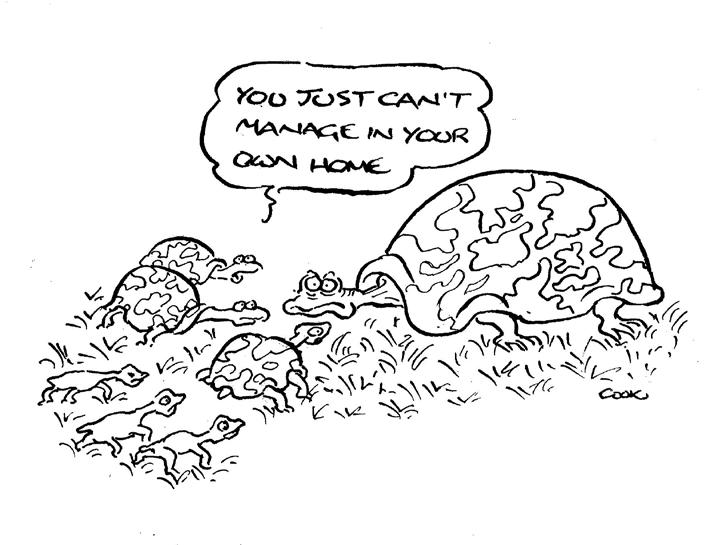
ask, why leave what may be the family home? To have a safer and easier environment for increasing disability? To have easier access to shops, to transport? Better access to care? More help? More community and security? More support and comfort?
When Mum went to hospital after a coronary episode, I said to Dad that perhaps now, they may like to consider moving somewhere closer to support and help. And Dad, who was losing his sight and would, we thought, also soon lose his licence, and then neither of them would be able to even get to the shops, said, ‘Don’t worry about it. I think Mum’s heart attack was a “one-off” ‘.
And I wanted to take Dad’s hands in mine and say to him gently, ‘Dad, there is a
I AUSTRALIAN CARERS GUIDE 50 I JEAN KITTSON I
Or worse, we fear they will be scared and sad, and cross with us.
Illustrations by Patrick Cook
It’s never an easy decision to make but there is a simple checklist you can follow to suit everyone’s opinions, particularly those of your elders.
fine line between denial and behaving as if you’re smoking crack. Do not cross that line now’.
But a rude break with the past can be far more traumatic than the difficulties that come with ageing. The future can seem an alien and empty place, however necessary and ‘suitable’. Because, let’s face it, moving our elders means throwing a whole lot of things out. We may call it ‘passing things on’, we may ask, ‘will they really ever use the waffle iron/ welding set/motorcycle parts/ ski suits/horse harness/fifteen hats, again’? Don’t let anyone say it is just stuff. Their things are totems and mandalas of their life. They hold memories and emotions. They are very much tangible and spiritual at the same time.
Their memories matter
My friend Sam said this about his mother: ‘As her memory is fading and as she is expected to cull more and more of her stuff to fit into the retirement unit, I see the memories of her life being whittled down to the photo of her tennis group from the thirties. Is this what the memory of her life will be? Will her life be diminished?’
Short answer, yes. Ageing is a process of diminishing and relinquishing.
Diminishing abilities and capabilities and relinquishing our stuff, our interests, our activities. It happens whether we like it or not. It happens naturally and necessarily. But what we

must not do is coerce our parents into diminishing and relinquishing unnaturally and unnecessarily. Don’t make the mistake of uprooting and transplanting reluctant aged relatives. It’s hard enough with gardenias.
Happily, there is help at hand in a sensible checklist to determine how safe your elders are, physically, mentally, emotionally. The checklist measures ‘functional ability’, which is a medical term meaning ‘ability to function,’ a much better indicator than age of how things are going.
Try this checklist, just for yourself, in private.
HOW DOES YOUR LOVED ONE OR LOVED ONES1 Manage the normal activities of daily living. Are they managing bathing, dressing, grooming, cooking?
2 Manage the administration side of their daily living. Can they do the shopping, banking, pay bills, maintain the house, drive safely?
3 Manage cognitively. Are they making good decisions? Legal, personal, medical, financial?
4 Manage emotionally and psychologically. Are they connected with the community? How are they feeling? Depressed, anxious? Just fine, thank you. Please rack off now.
Also, check their fridge. Is there any food in it? How long has it been in it? Is there moss on the chops?
We did this checklist, and eventually, sadly, inevitably, my brother and sister and I decided to persuade our parents to move from the family home. Although, in the end, the decision to move wasn’t made because of the
AUSTRALIAN CARERS GUIDE I 51 I JEAN KITTSON I
checklist - it was their house. Mum (legally blind and loudly deaf) and Dad (two new hips and a couple of health issues which are unresolved because he isn’t letting any bloody doctors NEAR him), were holding themselves together. But their house wasn’t. It had an upstairs balcony which was held up by two loose bricks and was ready to plummet into their little pool because Dad was either fixing one or cleaning the other, or both. And there were a few things they simply could not do anymore. Riding an avalanche of rubble was just one of them.
Weigh up the options
And so, naturally, their three devoted children came up with three completely different solutions.
PLAN A: My sister is an actual social worker who specialises in helping people with disabilities, or people of a certain age, to remain independent at home, and have help and care provided for them. Her plan was that Mum and Dad should remain at home for as long as possible, with home help and regular visits from us to make notes about how they are coping mentally and physically on their own. And that we get a professional builder to replace the balcony, and a large enforcer to stop Dad trying to do it himself, especially by climbing onto the roof because if he drops his glasses he will be stuck up there shouting pointlessly
for my deaf mum to get him down, or send up his dinner. This was Plan A.
PLAN B: Plan B was provided by my brother. He is a structural engineer, who had professional advice about the balcony, involving gelignite, and who wants immediate solutions to immediate problems, and so he bundled Mum and Dad into his car and took them on a little drive to look at attractive retirement villages, and have them described to Mum, in order to wake up and smell the ‘brochures’.
PLAN C: Plan C was mine. This is the one where we turn the spacious old garage cave under our house into a delightful open plan apartment, or granny flat, which is easily the size of their present living room, so that Mum and Dad can throw away nine-tenths of their possessions and furniture and move in with us. And without further consultation, we went right ahead and built it, as a surprise.
But all decide together

As you will have guessed, these well-meaning solutions were met with mixed responses. Maybe later. Not yet. No way. Plus my father saying bluntly, ‘When did you children start taking such an interest in us’? What our plans left out was that every plan sounded more like an ultimatum. ‘Put down that spanner, leave your hands where we can see them, step into the spare room. NOW!’
And then time barged into the conversation. It wasn’t their health, it wasn’t even their house, it was Dad’s driver’s licence. My mother’s macular eye disease meant Dad was her chauffeur. Walking was not an option as they lived on top of a steep hill impossible to access without a Sherpa. Then Dad was diagnosed with macular dystrophy. We were sure that he wouldn’t be able to renew his driver’s licence and they would be stuck on this peak
I AUSTRALIAN CARERS GUIDE 52 I JEAN KITTSON I
unable to reach base camp for any milk or even engine oil, let alone to take Mum to the doctor next time she had a ‘one-off’ heart event. As it turned out, four years later Dad was still driving – safely and well. They could have stayed at home for just a little longer, couldn’t they?
OK, based on what we did not do, here is a guide to how to even talk about it:
• Make sure all family members are present. Especially the elders.
• Brainstorm all options and record them in The Notebook you are jointly keeping.
• Allow all members to comment on the options, beginning with your elders who, let’s remember, have right of veto.
• Record each person’s comments.
• At the end of the discussion, read
Key takeaways
through the comments and ask everyone to agree that A, B, C was discussed, that X, Y, Z are the opinions, and resolve to meet again soon and discuss it all over again.
The discussion will start informally, probably with cake, but write things down. Rotate stenographers. Agreements between family members are tricky because, without fail, different people will remember different accounts of the same conversation and different interpretations of the same. Some won’t remember all of it, and some may not actually hear any of it.
The good news is that everything will follow an orderly, rational path to arrive at the best solution (on some other planet). At least you will all literally be on the same page. And the elders aren’t Exhibit A. They are the video refs, the High Court. Families have their own structures, their stress points, their rivalries, feuds and alliances. A decision to move is informed by the most deeply felt senses of home and family, from love in the room right through to a desire to grab the family real estate. And don’t forget the wild cards, the in-laws. This will affect them also. There may be raised voices on the way home. ACG
1
You may wonder if your elders need to move before they do. Sometimes the catalyst will be a medical event and you will have no choice. Sometimes it will be a gradual diminution of the capacity to cope, and the decision will be more difficult.
2

To help decide if the time has come, there is a checklist which measures how they are coping with normal daily life activities, physically, cognitively and emotionally.
3
If it looks like the time has come, talk with your elders but remember the decision should be theirs whenever possible. It is essential to involve family also. Encourage everyone to contribute their thoughts, ideas and feelings.
4
You will need many meetings. Everyone may have different ideas but there is a methodology that will help everyone come to a mutual agreement.
5 Start a family group chat or group text or Facebook page to share latest information and thoughts and keep everyone up to date with what is happening. Yes, give the elders the passwords, or be surprised by how soon they can hack it.
Tailored support for you and your loved ones
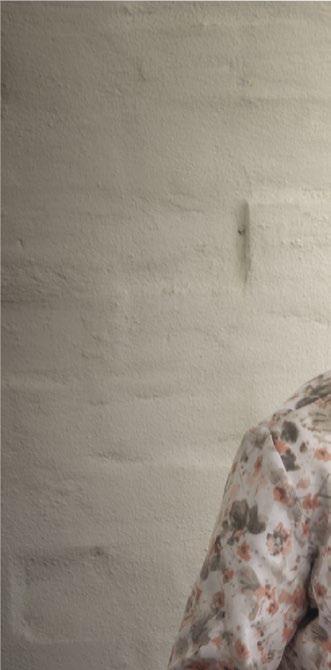
Brotherhood of St. Laurence Aged Care

For over 80 years the Brotherhood of St. Laurence (BSL) has worked in the community supporting people of all ages to live the life they choose. At BSL Aged Care we take the time to get to know you and your loved ones and work with you to tailor a plan to suit your individual needs.
Whether you’re looking for in-home support, quality residential care, or day and overnight respite care, we’ll help you find a solution that works for you.
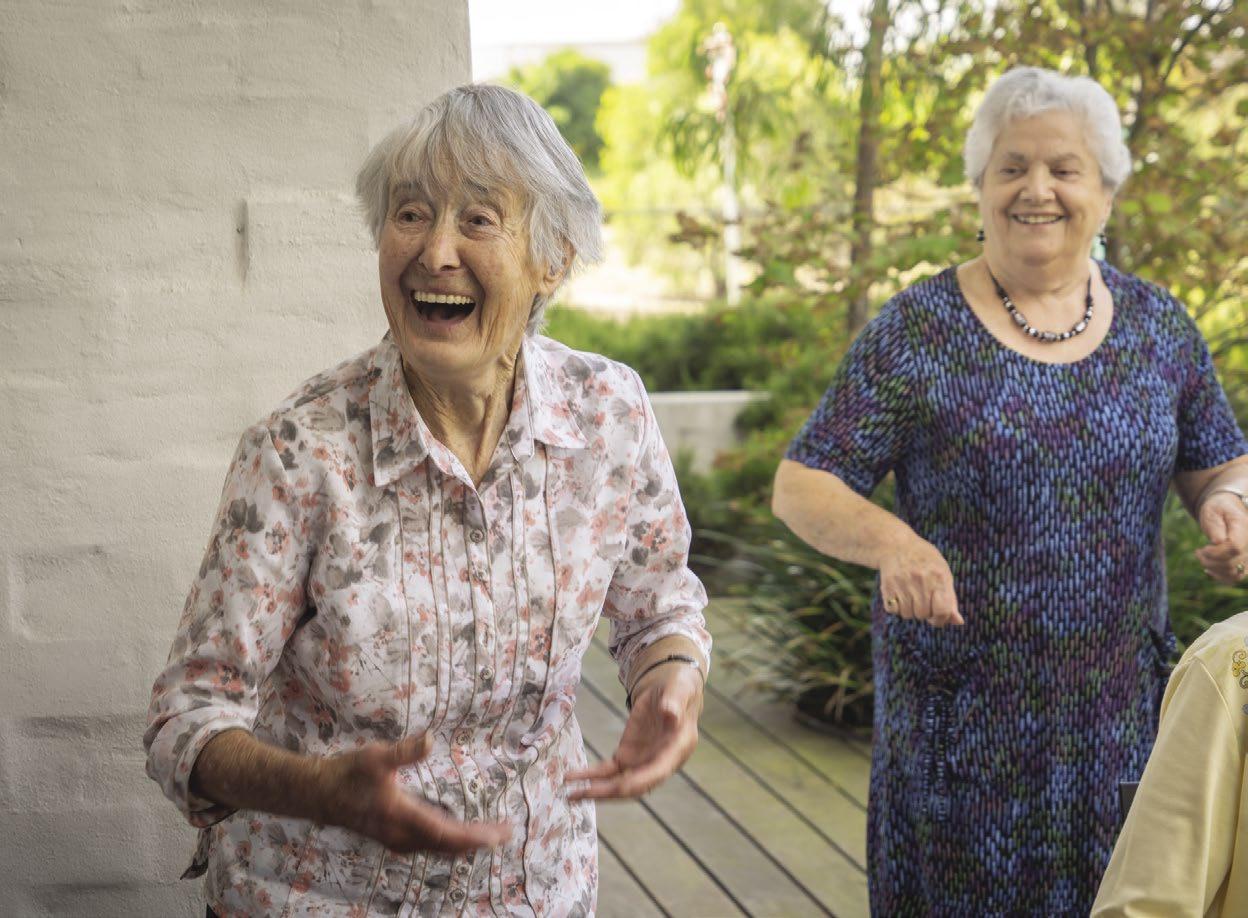
147
agedcare@bsl.org.au agedcare.bsl.org.au © 2022 Brotherhood of St Laurence (ARBN 100 042 822, ABN 24 603 467 024)
1300
147
CARER PAYMENTS
Explained
You may be eligible for government payments depending on your circumstances as well as those you care for.
Carer Payment
Is a payment you can receive if you give constant care to someone who has a severe disability, illness or an adult who is frail aged.
Who can get it
Both the carer and the person they are providing care for need to be eligible.
How much can I get
There are different rates of Carer Payments for single and partnered people.
Carer Payment maximum rate for a single person is $967.50 per fortnight or $729.30 for a member of a couple.

Carer Allowance
additional costs of caring on top of their usual costs of daily living.
How can I get the Carer Allowance
There is no assets test for Carer Allowance but there is an income test.
To get Carer Allowance your and your partner’s combined adjusted taxable income must be under $250,000 a year.
How much is the Carer Allowance
Carer Allowance is $144.80 each fortnight. There is no Health Care Card for the person you provide care for.
medical condition or who is frail aged. Carer supplement is up to $600 each year for each eligible payment.
You’ll get this amount on top of your regular payment.

Back Payments
Does Centrelink back pay the carer payment?
Carer Allowance claimants will no longer be able to have their payment backdated up to 12 weeks prior to contacting Centrelink about the payment.

Carer Supplement
Paid annually if you care for a person with a disability or
For further information including how to apply, please visit: servicesaustralia.gov.au/ how-to-claim
The Carer Allowance is a fortnightly payment to carers of someone with a severe disability or illness or who is frail aged to assist with the Pension rates per fortnight Single Couple each Couple combined Couple separated due to ill health
Energy Supplement $14.10 $10.60 $21.20 $14.10 Maximum basic rate $936.80 $706.20 $1,412.40 $936.80 Maximum Pension Supplement $75.60 $57.00 $114.00 $75.60 TOTAL $1026.50 $773.80 $1,547.60 $1026.50 Image
freepik
by
AUSTRALIAN CARERS GUIDE I 55
Is your home, your car and even your wallet, filled with too much stuff? Do you ever ask yourself how on earth you acquired so many things? Well here are ideas for you to reclaim your space and start to live an easier life.
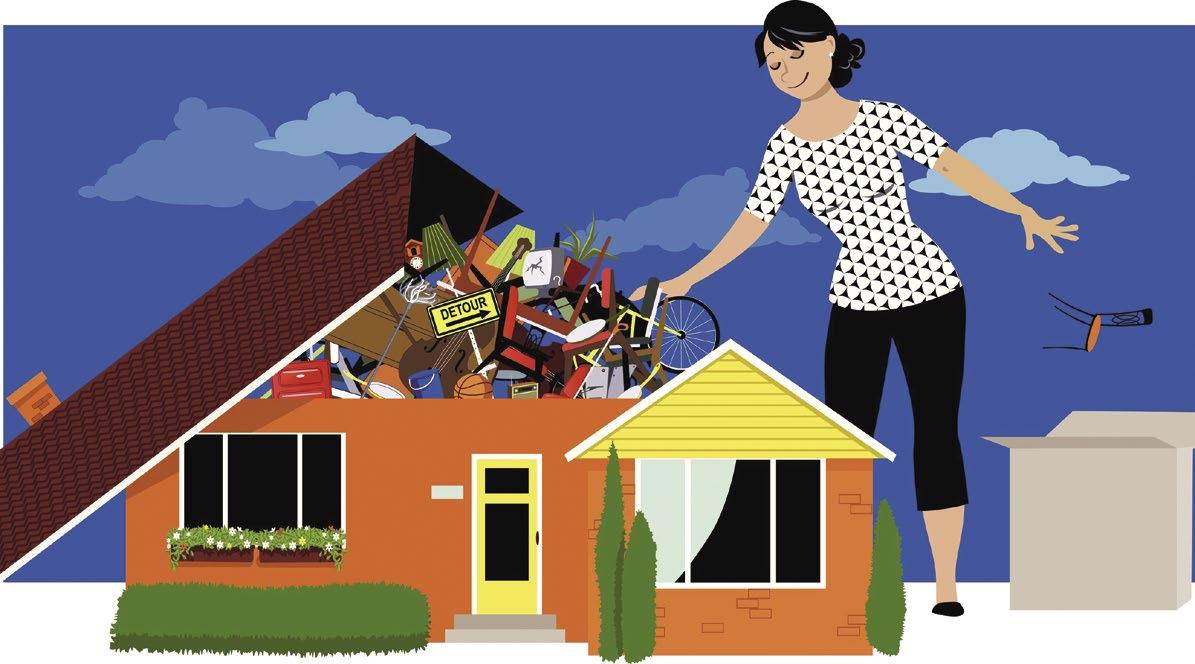
Simply explained, clutter is anything we have that does not bring us joy or does not add value to our lives. By decluttering, we free ourselves of things that don’t matter for those that do. According to Donna Smallin, author of Clear the Clutter, the clutter in your physical surroundings also has the ability to clutter your mind and spirit. “Clutter can distract you, weigh you down, and invite chaos into your life. Clutter causes stress, and clutter is one of the main barriers of productivity. Clutter is anything that does not support a better you, even if it’s organized.”
Ways to tackle the tasks on your own

1Establish realistic timelines and goals.














As the old saying goes: “Plan your work and work your plan”. To feel a sense of accomplishment and progress quickly, try decluttering for 15 minutes each morning for seven consecutive days. Evaluate and, if you can, keep this pace or increase time spent to 30 minutes a day. Experts suggest that the key to making progress is tied to making decisions about your priorities. If you keep yourself focused on your chosen key tasks you’ll get the job done faster, more efficiently and begin to relish your work becoming increasingly more successful. Donate or recycle

I AUSTRALIAN CARERS GUIDE 56
HOW TO DECLUTTER YOUR WORLD?
Tackle one area or one room at a time. “How do you eat an elephant? One bite at a time.” This same mind set should be used when attempting to declutter. It took time to acquire these items so it will likely take time to sort, properly reorganize, and toss. Decide what area or room will have your full attention until you are happy with the final result. Start small, perhaps with a drawer or a shelf. If you work on too many areas at the same time, your sense of purpose and success will be much lessened.
2
As you sort through a room, make a pile of similar items. Then decide which ones you like the best and donate the rest to charities.
4 Create a sorting system that suits you. Some people like the system of creating five categories:


1 Put Away


2 Donate
3 Mend/Fix

4 Recycle
important to you any more. The real key to developing a strategy is to think about what will help you move forward and what will work for you and your lifestyle
5 Free up surfaces







3 Purge duplicates. Have you ever asked yourself why you have three potato peelers, 10 spatulas and way too many flower vases? Perhaps it is because you could not find them easily or you simply forgot where you put them.
5 Garbage. Using this method, you can more easily decide which items are useful, useless or meaningful. Others like the sorting system that puts all similar objects together. Think about a pile of frying pans, all your pairs of pants or all the red tops. Once the items are all grouped together, you can see clearly which are in the best shape, which are worn out, worth saving or simply not
Furniture surfaces and countertops are catch-all magnets. Keeping them clear and clean is a big step forward. Ideally, they should house items you use every day: cutting board, toaster, kettle or TV remote. By removing as much as possible from these surfaces, you show yourself (and the world) that everything is in order and has a rightful place in your home.
Think about what will help you move forward
AUSTRALIAN CARERS GUIDE I 57
1Make your storage spaces beautiful and very practical.
Gone are the days when we stored our items in cardboard boxes and rusty tins. Now there is a wide variety of storage containers that are not only pretty but practical. Some complement décor or offer see-through storage bins with labels. Others are made of cloth, plastic and woven materials. You can chose to look for similar items and pack them up all together. For example: cleaning products, winter coats and sports equipment can be put into easy-to-find
What to do to make more space
zones. Seeing like items together can also stop you from buying more of the same thing. Looking at each space with a creative eye is wise. How could hooks, door-mounted shoe racks or hanging jewellry bags be used for a variety of purposes? If you think outside of the box, your storage solutions can be functional, fun and more fabulous than you expected.
2 Ask for fresh eyes. Letting go of items can be hard, so ask for help from family or trusted friends. What do they see? What is their first impression of your home and your rambling life? When decluttering becomes overwhelming or you are pressed by a deadline, think about hiring a professional organizer or downsizing expert. Guaranteed, if you can afford it, working with a professional will be less painful than tackling everything on your own.
3Become a frequent tosser, often.
Clutter often happens without us noticing it and without our approval. Suddenly things often get messy again. Accept that decluttering will never end and it will always be a constant battle to keep
clutter to a minimum. Know that even after you have organized a room or area, it will get cluttered again. Pick bad weather days to tackle small areas as “minidecluttering” opportunities.
4Are they family heirlooms or not? What can you do with those special keepsakes or family heirlooms that have been given to you but don’t really fit your style and plans right now. How do you decide what to not keep—guilt free!
• How does the item make you feel? Do you expect to feel the same one year from now?
• Does it make you smile, give you a sense of connection or bring you valued peace?
• Do you have the space to store it?
• Would a family member, friend or charity want it or be able to use it?
• Would it be worth selling to help solve one of your financial issues?
• Would the person who gave it to you be pleased that it will find a purpose in a new home?
If you decide to keep an item, find creative and fun ways to display it or store it properly. Try showcasing old war medals or a travel destination spoon collection
Images by © Can Stock Photo and Freepik
I AUSTRALIAN CARERS GUIDE 58
Start small, perhaps with a drawer or shelf.
Loving Life Never Gets Old
With your Home Care Package or private funding arrangements, BlueCross can provide aged care services in your home so you can keep living the life you want.


in a wall mounted memory box. Digitally store and share old photos. Wedding dresses and religious outfits such as baptism dresses should be dry cleaned and stored in either moth balls or cedar chests. No matter what you decide to do, these special items usually require extra thought and consideration as you decide if you’re still willing to dust, clean and sort them year after year.
5It sometimes takes two. Decluttering can be lonely, boring and slow going. Inject fun by taking before and after pictures and sharing on social media. For further motivation, find a buddy who is doing the same thing in their own home. Decide whether morning, afternoons or evenings are best for each of you and zoom while
you work. Share sorting tips and then celebrate online when the day’s job is done. Remember, try to have a little fun on your clutter clearing journey. Be patient with yourself and others during the process and keep your eye on the end goal – a bit more space and a whole lot more freedom. Not only is decluttering liberating in so many ways, it gives you back control and permission to explore, create new memories and enjoy new life experiences. ACG
Why declutter?
Getting rid of things that are no longer of value honours who we are today by reflecting our current interests, habits and lifestyles. It also:


l Brings us a sense of accomplishment and control.
Donate good stuff you don’t want to needy charities.








l Gives us space for things we value.
l Saves us the stress, time and frustration of looking for things.
l Allows us to see what we already have so we don’t waste money buying more of the same.
l Confirms which items can bring us joy and are worth for us to keep.
l Makes our homes safer and healthier places to live.

I AUSTRALIAN CARERS GUIDE 60
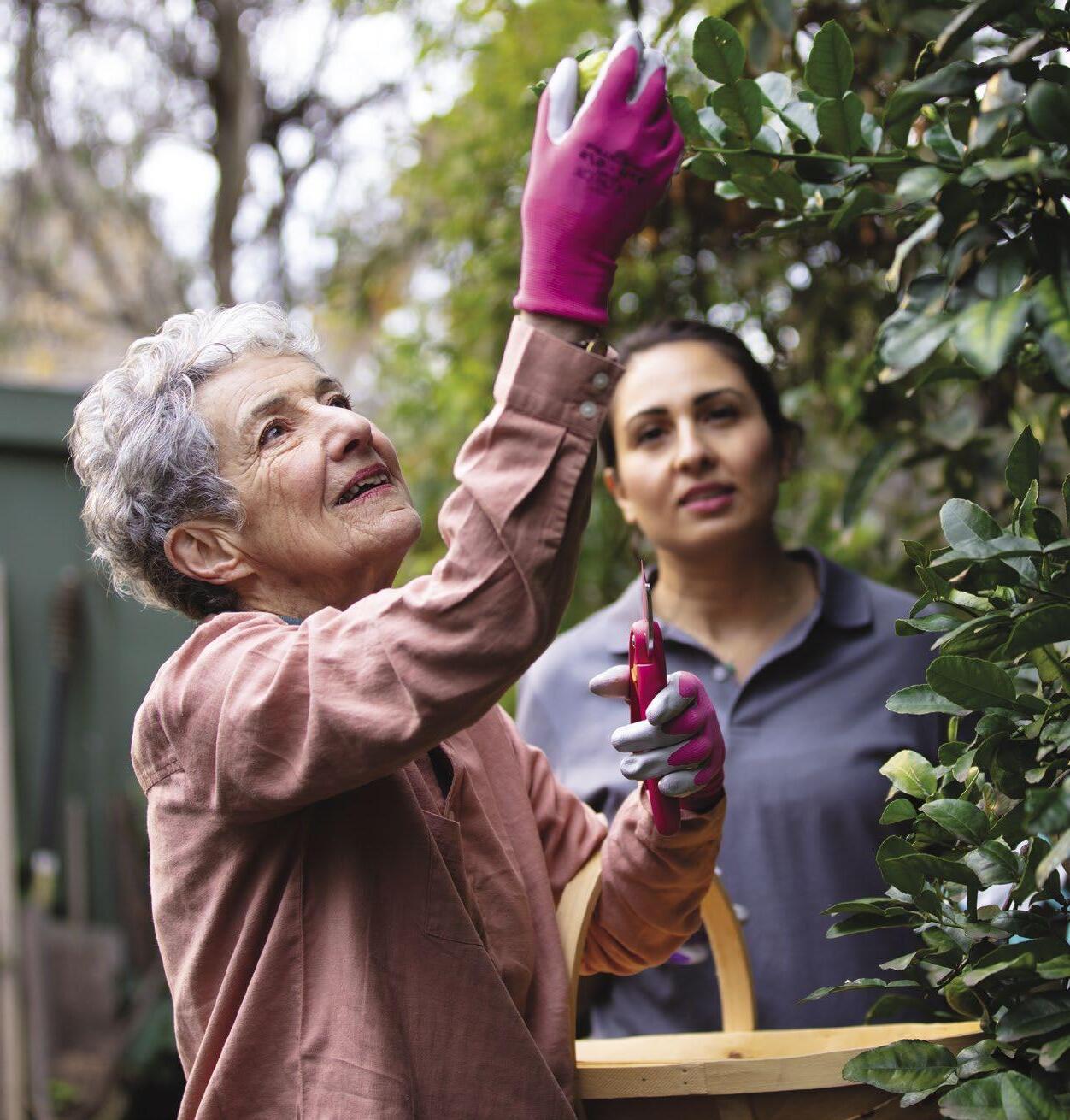
Call 1300 726 291 or visit bodewellcommunitycare.com.au Make more possible BodeWell Community Care 24 hours a day, 365 days a year

I AUSTRALIAN CARERS GUIDE 62
The abuse of older people is a complex issue, with silence being its biggest ally. Knowing which way to turn for help starts by defining elder abuse, recognising its signs, and knowing where to seek support.
A LOUDER voice & action NEEDED FOR ELDER ABUSE
BY DEBRA NICHOLL, CEO, ELDER RIGHTS ADVOCACY
Often older people won’t speak up or speak out about it because their loved ones are often perpetrators. As a result, they may not recognise what they are experiencing as abuse, or they will say, ‘Yes, I am suffering, but I’m not going to say anything because I don’t want to get them in “trouble”’.
Our work at Elder Rights Advocacy is around empowering the older person with information about the support that is out there so that they can make an informed choice about what to do.
Like other forms of family violence, many incidents of elder abuse occur behind
closed doors, so loved ones and carers need to watch out for signs, listen and offer help.
Elder Rights Advocacy is a founding member of the national Older Persons Advocacy Network (OPAN),
Elder abuse includes a single or repeated act or failure to act,
delivering the National Aged Care Advocacy Program (NACAP).
Our services are available to older people and their families/representatives who are accessing, or eligible to access, Australian Government-funded aged care services, including elder abuse.
What is elder abuse?
Elder abuse includes a single or repeated act or failure to act, including threats, that result in harm or distress to an older person.
This occurs when there is a relationship or an expectation of trust and a power imbalance between the party responsible and the older person.
AUSTRALIAN CARERS GUIDE I 63
Elder abuse is family violence and is unacceptable.
• Anyone can experience elder abuse. But there are some characteristics that mean some people are at higher risk of abuse. These include being of lower socio-economic status, single, separated or divorced, living in rented housing, or owning a house with a debt against it.
• The age group most at risk of abuse are those in the 65–69 bracket, although the likelihood of neglect rises for those aged 80 and above.
• People with poor physical or psychological health and higher levels of social isolation are also at higher risk of abuse.
• People who experience elder abuse are more than three times more likely to have psychological wellbeing scores indicative of probable serious mental illness than those who don’t experience it.
• Having poor health or a disability or a medical condition lasting at least six months and causing
difficulty in everyday life doubles the risk of experiencing elder abuse.

• Those who experience elder abuse have a much lower sense of social support than those who don’t experience elder abuse.
As part of the National Plan to Respond to the Abuse of Older Australians (National Plan, Council of Attorneys General, 2019), the AttorneyGeneral’s Department commissioned the National Elder Abuse Prevalence Study (NEAPS) to investigate elder abuse. This is Australia’s first national survey and the most comprehensive study of elder abuse.
This research shows that 15% of the population aged 65 and over who live in the community (rather than in residential care settings) have experienced elder abuse in the 12 months before the interview.
Psychological abuse is the most common subtype (12%), followed by neglect (3%), financial abuse (2%), physical abuse (2%) and sexual abuse (1%). Some people experience more than one subtype of abuse (4%). However, the most common combination of abuse is psychological abuse and neglect.
Who commits elder abuse and neglect?
• Adult children were the main perpetrator group for psychological abuse (18%). The next largest perpetrator group was acquaintances (12%), followed by sons and daughters-in-law (10%), friends (10%) and intimate partners (8%).
I AUSTRALIAN CARERS GUIDE 64
The age group most at risk of abuse are those in the 65–69 bracket
• For physical abuse, children are still the biggest perpetrator group (17%), followed by spouses (12%), neighbours (12%) and friends (10%).
• Perpetrator profiles differ significantly for sexual abuse, with friends (42%) followed by acquaintances (13%) and spouses (9%) most likely to commit this type of abuse.
• Children and intimate partners are significant perpetrators of neglect (24–25% for each). Professional carers (14%) and service providers (13%) are bigger perpetrator groups for neglect than other abuse subtypes.
Ageism is one of the drivers of elder abuse and occurs in families and the wider community.
• Entrenched ageist attitudes further hinder older persons from claiming their rights and undermine their autonomy to make their own choices and decisions, hence the importance of educating older people about their rights.
Types of elder abuse
There are six types of elder abuse: physical, sexual, psychological, social, financial and neglect.
Physical involves pushing, shoving and rough handling. And according to The Report into Residential Aged Care Abuse and Neglect, one in every 20 residents in residential care reported having been physically abused. Common signs are bruising to the body and significant and unexplained weight loss.
Signs of sexual abuse may include bruising, bite or burn marks to genitals, thighs,
breasts, rectum or mouth, as well as torn, stained and bloodied clothing.
Financial exploitation of older people is the most common reported abuse to support organisations. It ranges from the theft of small amounts of money, which, whilst low in value, may significantly impact those living on low incomes, to older people being coerced into gifting large amounts of money or even selling their homes. Examples may include threats or coercion to gain Power of Attorney, pressuring for early inheritance and living with someone without helping to pay for expenses. Signs may include ‘missing’ money or possessions, forcing someone to sign a will and changes to banking habits.
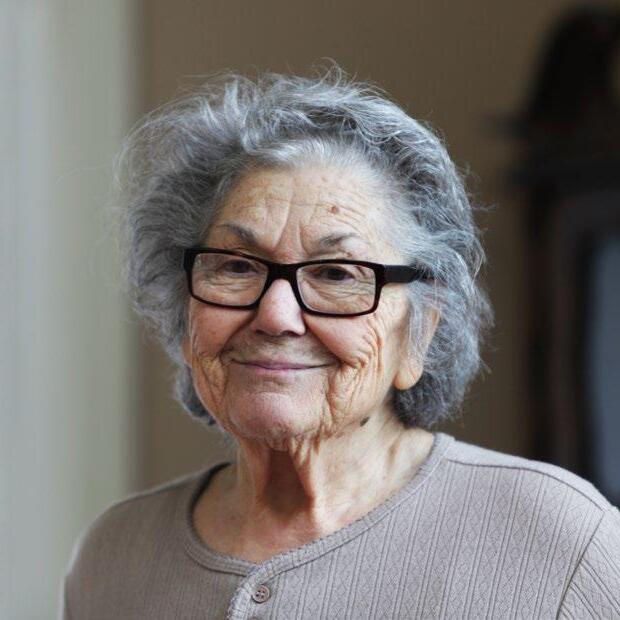
AUSTRALIAN CARERS GUIDE I 65
Financial exploitation of older people is the most common reported abuse
Psychological or emotional abuse appears to be one of the most common types of elder abuse and often occurs concurrently as an enabler and sustainer of financial abuse. Some signs may include fear, confusion and loneliness, feelings of helplessness, low mood, and depression.
Social abuse is forced isolation that prevents or restricts the older person’s contact with friends, family or the community. It may include preventing a person from answering the door/ accessing friends and family/ receiving mail and phone calls, derogatory put-downs, and taking over their home without consent.
According to Aged Care Royal Commission in December 2020, the most prevalent type of elder abuse was deemed to be neglect (experienced by 30.8% of people). This may include the mis-administration of medications, not bathing or wearing soiled clothing, and not being fed adequately.
Why don’t older people say they are being abused?
They are often fearful of more abuse, as well as feeling ashamed and humiliated. There may also be the threat of losing relationships with family, especially grandchildren and the additional threat of being moved from home into residential care.
How to protect yourself?
It is important to stay socially connected, know your rights, control your finances, and access available support services.
Elder Rights Advocacy is to support the resident and or family with information about older person’s rights. Connect them to information or services that can support them and encourage them to report it. We have a warm referral relationship with Senior Rights Victoria as they have a legal service.
Elder Rights Advocacy supports older people and their families or representatives with information about older person’s rights. We connect
people to services that can support them and encourage them to report elder abuse. For instance, we have a close partnership with Senior Rights Victoria, a legal service provider, to ensure prompt and appropriate referral if legal aid is needed.
It is essential to respect older people, call out ageism, and recognise the signs of potential elder abuse. This means noticing the changes in behaviour or appearance and encouraging people to understand their rights in seeking social networks and connections.
• Elder Rights Advocacy 1800 700 600
• Free, confidential elder abuse helpline1800 353 374
• Emergency-Police000
Older people can reduce the risk of elder abuse by ensuring their financial, medical, legal and other affairs are clearly stated and recorded in legal documents and/or discussed within the family. Older people must also be empowered to recognise the signs of elder abuse and encouraged to state when uncomfortable with an arrangement.
National 1800
ELDERHelp Telephone: 1800 353 374 (national free call phone number that redirects callers to an existing phone line service in their state) ACG
the most prevalent type of elder abuse was deemed to be neglect (experienced by 30.8% of people)
I AUSTRALIAN CARERS GUIDE 66
What you need to know for better aged care
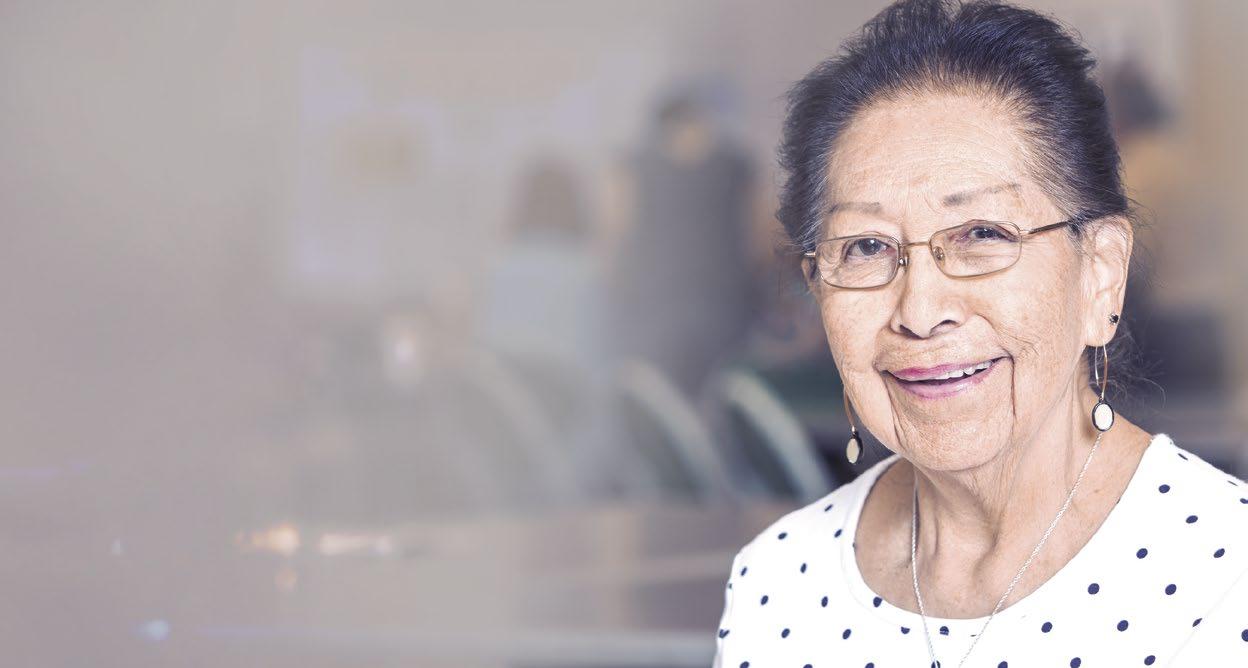
Do you or someone you care for receive or need governmentfunded aged care services, either at home or in residential care?
We can assist with information and resources on:

• how to speak up for better care


• aged care provider fees and services








• transitioning between packages

• help with decision-making
• moving to residential care.
Our advocates assist you with free and confidential support and advocacy
• we listen carefully to what you have to say

• we do not talk to other people about you without your permission
• we are independent of the government and providers
• our goal is to ensure older people are treated with dignity and respect.
Chat with us 1800 700 600






Elder Rights Advocacy is a member of the Older Persons Advocacy Network. To find out more visit opan.org.au or scan the QR code Supported by funding from the Australian Government Department of Health and Aged Care
In 2021, the Royal Commission into Aged Care Quality and Safety provided Australia with a unique opportunity — to make positive, lasting changes to aged care that deliver safety, dignity and respect for older people.

AGED CARE REFORM
Updates
BY AGEING AND AGED CARE GROUP AUSTRALIAN GOVERNMENT DEPARTMENT OF HEALTH AND AGED CARE
I AUSTRALIAN CARERS GUIDE 68 I AGED CARE REFORMS I
The Australian Government is making changes to the aged care system. These changes are in response to the recommendations of the Royal Commission.
These changes – known as the aged care reforms – will improve aged care in Australia.
What we’ve delivered so far
We have made – and will continue to make – positive changes to restore dignity to older people in Australia. Here are just some of the changes we’ve made:
• capped Home Care Package admin fees
• supported a meaningful pay rise for aged care workers
• legislated 24/7 nurses in aged care homes from July 2023
• legislated more care minutes in aged care homes from October 2023
• improved transparency and accountability requirements of aged care providers
• introduced the Star Ratings system as a comparison rating for all residential aged care services
• established the Office of the Interim InspectorGeneral for Aged Care, and appointed Mr Ian Yates AM as the Interim InspectorGeneral from January 2023.
Read about how aged care reforms affect people you care
for
A new booklet –Reforming aged care in Australia – is available for download and ordering from the Department of Health and Aged Care website.
The booklet is for older people and their carers and families who want to learn more about the changes being made to aged care.
It features stories that show how existing and upcoming reforms might affect older people, and information explaining what exactly is changing. By reading this booklet, you can learn more about the aged care reforms and get an idea of how they might work in real life.
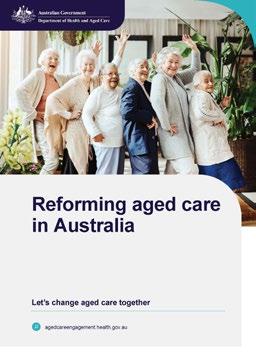
You can view the booklet online or order a hard copy at: health. gov.au/resources/ publications/ reforming-aged-carein-australia
Creating a system of choice and control
Whether it’s for you, or someone you care for, it’s a good idea to start thinking about your health and wellbeing needs for the future.
We are reforming the current aged care system – into one that allows for more choice and control – so you get the care and support you need where and when you need it.
We know that people want to stay in their homes for longer as they age. Reforms to in-home aged care will ensure the right level of support for older people at home, when they need it. That means having the choice to stay mobile and at home for as long as you want, receiving the care that you need.
As at 31 March 2023, the current wait for people with a high priority is less than one month. Additionally, the number of people waiting to receive a Home Care Package (HCP) continues to decrease, with a drop of 47% in the 12 months to 31 March 2023.
The traditional image of aged care is often associated with residential care. While it’s true that the majority of expenditure is in the residential care sector, in fact, the majority of people remain independent and stay in their home –connected to family and community – for the duration of their lives.
For some, home support and home care packages provide the support they need to maintain independent living. Only a small proportion of older people are accessing residential care at any point in time.
AUSTRALIAN CARERS GUIDE I 69 I AGED CARE REFORMS I
Photo by Ageing and Aged Care Group Australian Government Department of Health and Aged Care
How to access aged care information
We’ve heard that people in Australia want accessing aged care to be easier. Older people want it to be easier to understand, easier to get support and easier to find information and make decisions about aged care.
The Australian Government is committed to reforming aged care and providing easy, consistent and equal access to aged care information, support and care.
We want to ensure that older people have the support they need when making important decisions about their aged care journey.
Australia’s aged care system
The aged care system offers a continuum of care under 3 main types of service:

• Commonwealth Home Support Programme
• home care packages
• residential care.
There are also several types of flexible care available to older people (and their carers) that extend across the spectrum from home support to residential aged care.
During 2021–22 there were 1.5 million recipients of aged care. Each person’s life experience is unique and therefore there is no ‘typical’ aged care recipient. The aged care system is designed to be flexible and responsive to varying needs, including physical and mental health and wellbeing, social support and inclusion.
Who pays for aged care?
The Australian Government is the major funder of aged care, with aged care recipients contributing to the cost of their care where they are able to do so. Australian Government expenditure for aged care throughout 2021–22 totalled $24.8 billion, an increase of 4.9 per cent from the previous year.
I AUSTRALIAN CARERS GUIDE 70 I AGED CARE REFORMS I
Source: 2021–22 Report on the Operation of the Aged Care Act 1997
Source: 2021–22 Report on the Operation of the Aged Care Act 1997
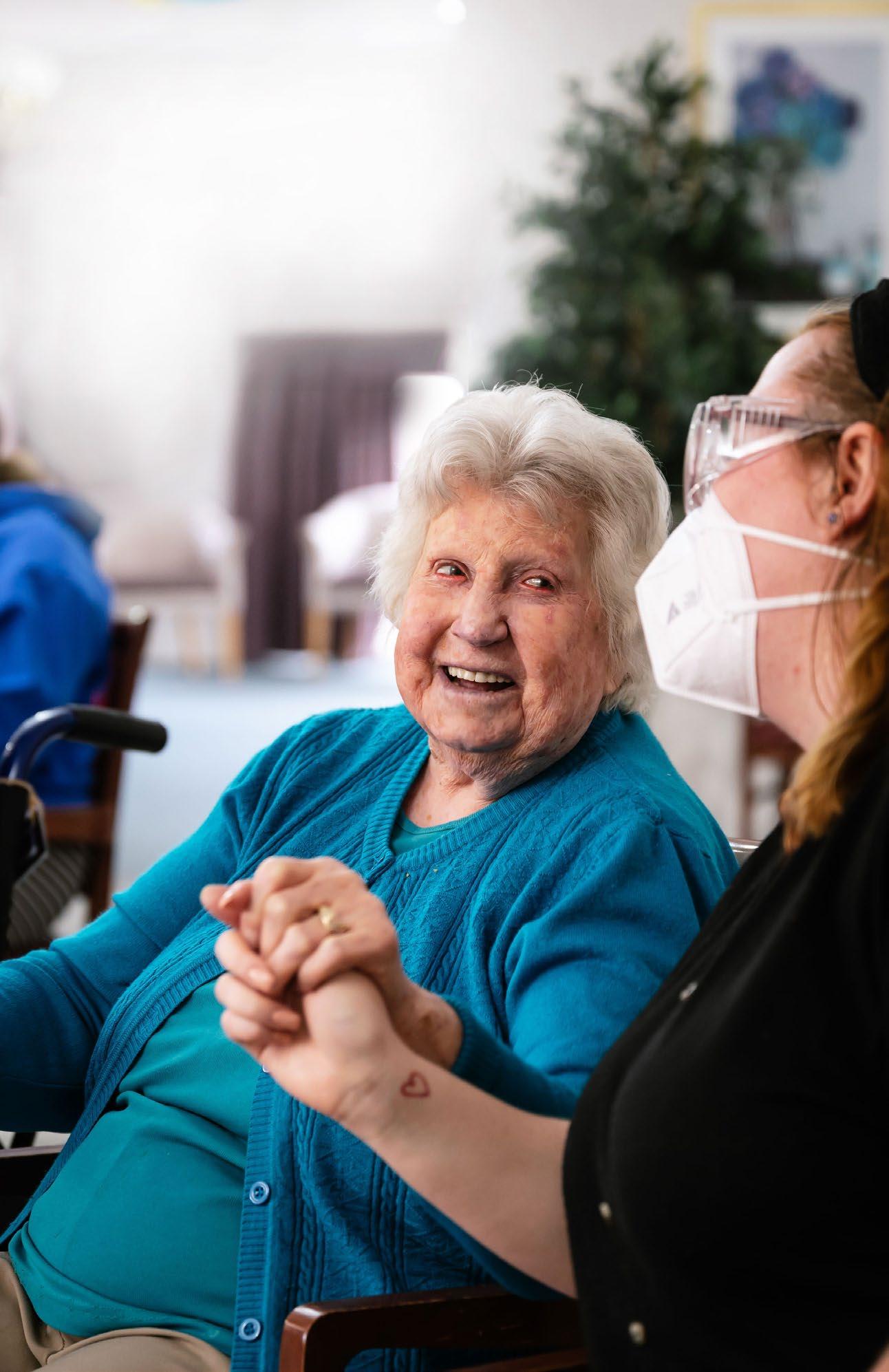

Is someone close to you struggling to live on their own? Find a sense of belonging Experience meaningful connections Rediscover purpose Enjoy peace of mind knowing they are in the right hands. Bacchus Marsh � Ballarat � Benalla � Burwood Bendigo � Footscray � Flemington � Melbourne Moe � Flemington � Safety Beach � Sale Sydenham � Wantirna South royalfreemasons.org.au Discover more about our aged care home today Phone 1300 176 925
Aged Care Specialist Officers
Did you know you can get face-to-face help from an Aged Care Specialist Officer (ACSO) in over 80 locations across Australia?
Aged Care Specialist Officers are part of My Aged Care face-to-face services and can:
• provide information on the different types of aged care services
• check if you are eligible for government funded services and refer you for an aged care assessment
• provide financial information about aged care services
• help you appoint a representative for My Aged Care
• connect you to local support services.
You can book a free appointment by calling 1800 227 475 or at any Services Australia centre across Australia.
See where Aged Care Specialist Officers are located on the Services Australia website: servicesaustralia. gov.au/aged-carespecialist-officer-myaged-care-face-to-faceservices
My Aged Care’s Help Explorer
If you’re not sure what help you need or where to start, My Aged Care’s help explorer lets you see how other people dealt with similar situations, and the services they found helpful.
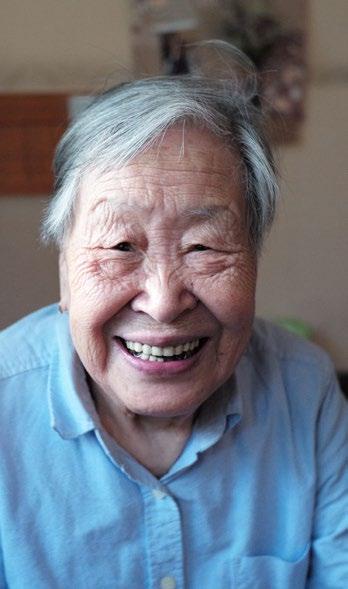
Read the stories that best match your current situation, or the service you want to learn more about by visiting: myagedcare.gov.au/helpexplorer
Before you can access services, you need to apply for an assessment to check if you’re eligible. During your assessment, you and your assessor will discuss your needs and what support might be right for you.
To find out how to apply for an assessment, visit: myagedcare.gov.au/ assessment/how-applyassessment
Have your say about aged care reforms
We are consulting with older people, their families, and carers as we develop, trial and deliver these changes to make sure our aged care system meets their needs.
Thousands of people have been involved in shaping the reforms so far – through surveys, webinars, online workshops, consultation papers and in-person events. There are plenty of opportunities for you to have your say about the changes to aged care:
• Register to be kept up to date on consultation opportunities and outcomes or sign up to receive our monthly newsletter for older people in Australia
– EngAged. Visit the Aged Care Engagement Hub: agedcareengagement. health.gov.au/get-involved
• Call 1800 318 209 to find out more about the reforms and progress, open consultations and for assistance in completing consultation activities.
• Talk with us in person at one of the many upcoming events around Australia that we’re attending, including:
• Care Expo – Melbourne, VIC, 11–12 August 2023
• Care and Ageing Well Expo – Perth, WA
12–13 August 2023
• COTA Seniors Expo –Alice Springs, NT
22 August 2023
• Care Expo – Brisbane, QLD, 1–2 September 2023 ACG
I AUSTRALIAN CARERS GUIDE 72 I AGED CARE REFORMS I
Information correct as at time of printing
Photo by Jixiao Huang on Unsplash
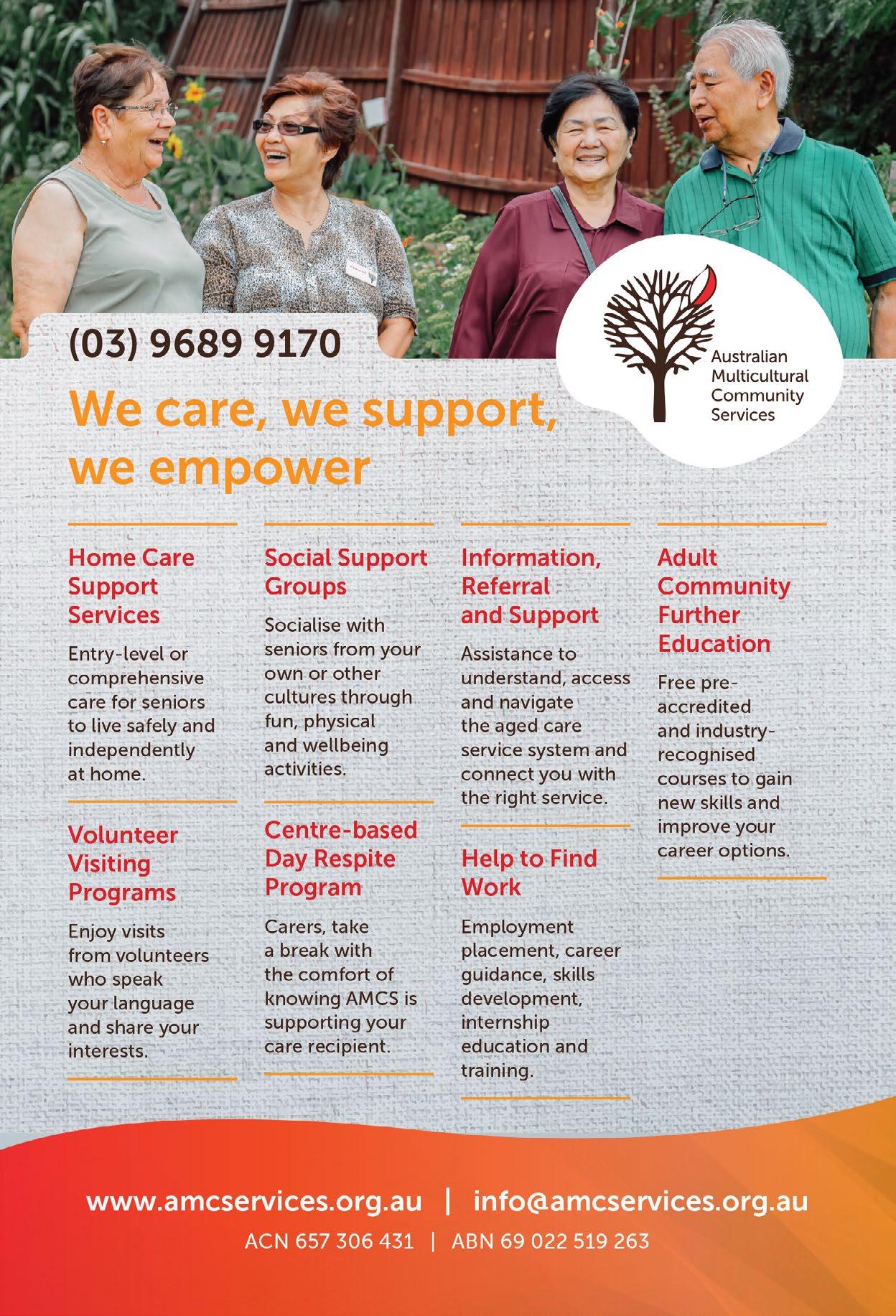

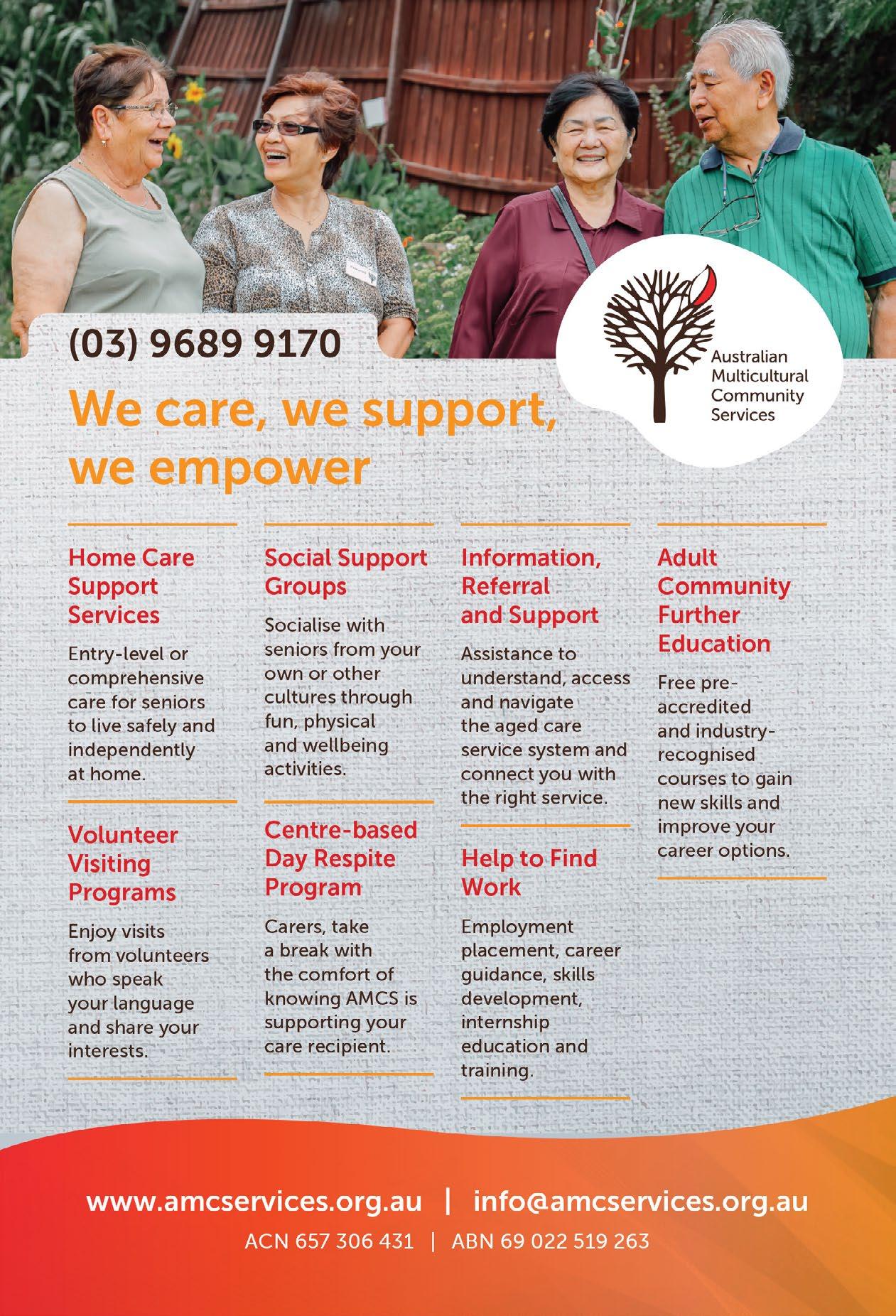
GATHER MY GATHER MY
CONNECTING COMMUNITIES TO SUPPORT THOSE IN NEED
As a carer, you may feel like you need to handle everything on your own. But the truth is, caring for a loved one can be overwhelming and exhausting, and you don’t have to do it alone. We are social creatures, and connections with others are
essential for our well-being, especially during tough times. That’s why Gather My Crew is here to support you.
Aging is one of the main reasons people may need support. As our loved ones get older, they may require more care and attention, which can be difficult to manage on your own. However, often when we’re helping to look after someone we love, we think of it as normal, and we might not realise we are a carer. It’s important to recognize the role you play and the toll it can take on your own well-being.
Gather My Crew is a not-for-profit organisation that is dedicated to creating connected communities that help each other – when and how they need it. The charity


I AUSTRALIAN CARERS GUIDE 74 I TECHNOLOGY I
CREW CREW
does this by providing free tools and resources that make it easier to ask for, offer, and coordinate help.
One of the charity’s tools is an app. The Gather My Crew app is free to download Australiawide and bridges the gap between people who need help and their community of friends and family who want to support.

It does this, by allowing you to create a “crew” of trusted individuals who can help with tasks such as cooking meals, running errands, or providing emotional support. You choose who you want to be part of your crew, and this might include family, friends, neighbours, acquaintances, and paid support staff.
The app is effective at
making it much easier to share the load and to ensure the right help is provided at the right time. By using the app, you can easily communicate with your crew, track tasks, and ensure that everyone is working together to provide the best possible support.
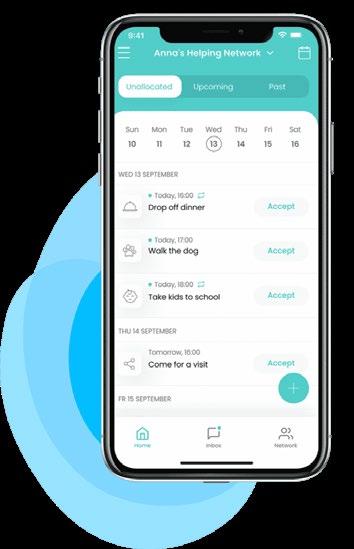
Helen’s daughter set up Gather My Crew for her after she had a terrible fall, leaving her with a broken knee, wrist, and noes. After a month in hospital, Helen was relieved to return home but still couldn’t do basic tasks and this is when her crew truly stepped in to help.
Our close family friend was a wonderful emotional support and he got me to all the medical appointments. My children did what they
Allows you to create a “crew” of trusted individuals who can help with tasks such as cooking meals, running errands, or providing emotional support.
AUSTRALIAN CARERS GUIDE I 75 I TECHNOLOGY I
could but being busy with their own families meant they had limited time to help. However, it was the unexpected kindness of the other residents in my retirement village, many of whom I didn’t even know well, that really made a difference. My neighbour two doors down took care of my bins, collected the mail, and ran errands for me. Three lovely ladies made sure my freezer was stocked and others took me grocery shopping once I was able to do it.
And then there were the little acts of kindness – a bunch of flowers picked from the garden, freshly baked afternoon tea and the encouragement I needed to re-join the social activities in the village.
For Helen, the support of her crew was vital to get her through this difficult time. It was also helpful to her daughter, who although was busy herself, she knew her mum was receiving the help she needed.
The Gather My Crew app is a powerful tool but is just one part of the organisation’s offerings. The charity also provides
resources and tips to help individuals navigate challenging situations and make the most of the support available to them.
If you’re wanting to help someone but the app doesn’t feel like the right option just now, Gather My Crew can provide you with the tools and resources to make a meaningful impact. Here are some tips for how to effectively offer to help:
• Be specific: Ask the person what they need help with and be specific about what you can offer. For example, if you offer
to cook meals, let them know what type of meals you can cook and how often.
• Be consistent: If you offer to help, make sure that you follow through. The person may be counting on you, so it’s important to be reliable.
• Be flexible: Be open to different ways that you can help. The person may not need exactly what you had in mind, so be willing to adapt.
• Be patient: The person may be going through a difficult time, so it’s important to be patient and understanding. Don’t expect them to be able to communicate their needs perfectly or to always be in a good mood.
As people age, they may also need more support than they used to. This can be a difficult transition for both the person and their loved ones. It’s important to
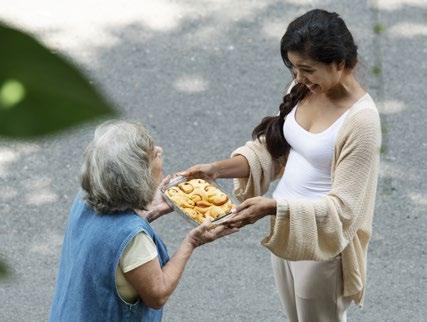
I AUSTRALIAN CARERS GUIDE 76 I TECHNOLOGY I
The charity also provides resources and tips to help individuals navigate challenging situations
recognize when someone needs extra help and to offer it in a compassionate and respectful way. It’s also important to remember that caring for someone else is a form of work, and that it’s important to take care of yourself as well.
Gather My Crew is a beacon of hope for carers and those in need of support. It empowers individuals to ask for help, connects them to their community, and helps to alleviate the burden of caring for a loved one. By embracing the power of human connection, we can make a meaningful difference in the lives of those we care for and in our own lives. So, let’s come together and make a positive impact on the world, one crew at a time.
To find out more about Gather My Crew visit: www.gathermycrew.org.au
1
DOWNLOAD THE APP: You can download the Gather My Crew app from the app store or Google Play. It’s free and secure, with an Australian based support desk who can help you with any questions. The app/crew can be managed by the person in need or by someone on their behalf, or a combination of the two. The person/people who manage the app and crew are called ‘The Captain.’ You can change who the Captain is at any time, so don’t be afraid to initially just download the app and have a play.

2
GATHER YOUR CREW: Within the app, your support network is called your crew. Once you have downloaded the app, the next step is to invite people to join your Crew. Think of friends, family and anyone who’s offered to help. Choose people from your phone contacts to send an SMS invite.
3
IDENTIFY HELP OPPORTUNITIES: When you’re overwhelmed, it’s often hard to suggest ways others can help. To support with this, the app uses your answers from a short questionnaire to build a list of common help requests, outlined in your Help List.
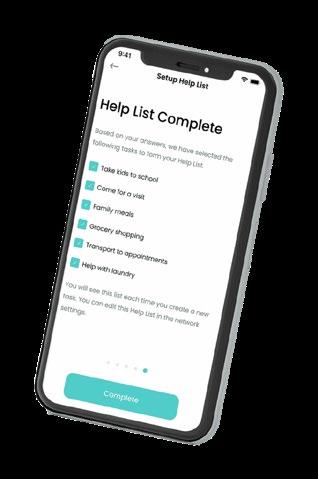
4
CREATE TASKS: To ask for help from your crew, create a task. Easily choose a commonly requested task from your Help List. Or write your own.
5
SHARED CALENDAR: The description, date and time of your tasks will be added to the shared calendar and published task list. Your crew can then ‘Accept’ which tasks they can do.
6EXTRA FEATURES: You can also add appointments to the calendar and can create folders and chats with your crew using the Messages button. This makes it easy for everyone to be on the same page.
I AUSTRALIAN CARERS GUIDE 78 I TECHNOLOGY I
How to get started with the Gather My Crew app
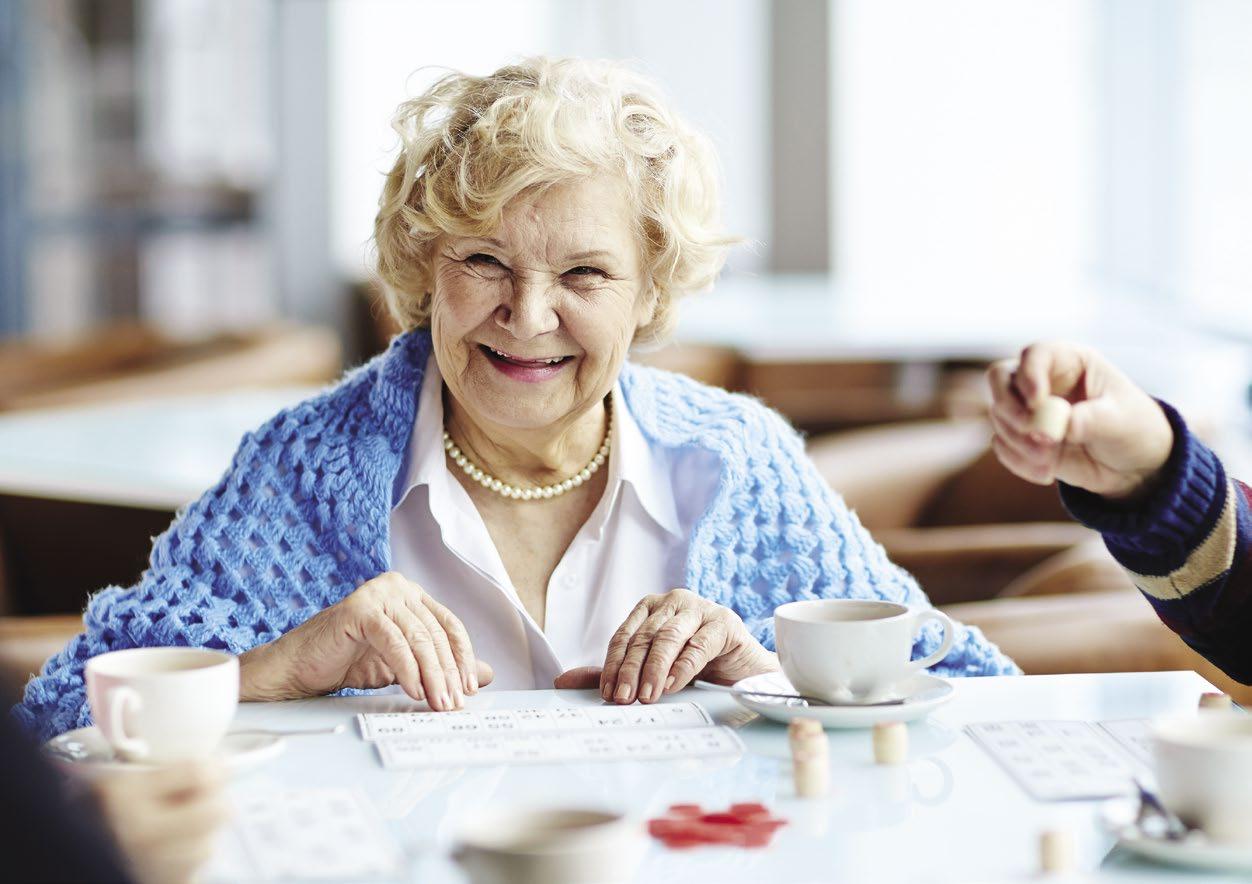
Carers need care too Proudly a not-for-profit, non-denominational charitable organisation mecwacare is here to support you in a number of ways: • A few hours in your home • Weekly or monthly day centre activities • Overnight stays • 24-hour live-in care • Up to four weeks in one of our aged care homes. Respite care is available across metropolitan Melbourne and regional Victoria. Visit our website to learn more. Freecall 1800 163 292 • mecwacare.org.au CALL US TO FIND OUT MORE 8573 4980 Being a primary carer is a challenging role that can be emotionally and physically demanding.
Why do we get SAD?
What is Seasonal Affective Disorder

I AUSTRALIAN CARERS GUIDE 80
Photo by Mark Boss on Unsplash
During the colder, darker winter months, it’s not uncommon for some people to find they struggle for motivation and their mood is a bit flatter than usual. Often referred to as the “winter blues”, a smaller proportion of people, particularly the elderly, find that this can be debilitating. We call this ‘seasonal affective disorder’ (SAD). It can be a very serious disorder and prolonged and regular feelings of being sad and unmotivated can lead to depression.
What is seasonal affective disorder? (SAD)
Seasonal affective disorder (SAD), also called seasonal depression, is believed to be brought on by the earlier sunsets and colder weather of winter and a lack of exposure to sunlight.
The body’s natural circadian rhythm (body clock) is influenced by exposure to the rising and setting of the sun. Scientists think that less sun exposure during shorter winter days can cause changes in brain chemicals like serotonin and melatonin levels. These biochemical changes can cause symptoms of depression. SAD typically starts in late Autumn or early Winter and usually goes away in spring and summer when there’s plenty of sunshine.
Seasonal affective disorder symptoms
Symptoms of seasonal affective disorder can start
out mild and become more severe as winter progresses. People with SAD often have symptoms that include:
• Lack of energy, feeling sluggish
• Loss of interest in onceloved activities
• Irritability and agitation
• Increased need for sleep and/or problems with sleep
• Trouble concentrating
• Becoming anti-social, wanting to be alone
• Increase in appetite or weight gain
• Feelings of worthlessness or hopelessness
• Frequently thoughts of death or suicide
Less sun exposure during shorter winter days can cause changes in brain chemicals
How SAD affects seniors and their carers
Many carers already experience symptoms of depression due to chronic carer stress or compassion fatigue. Seasonal depression can intensify these symptoms and worsen their already mild depression. Similarly, many older adults who have serious illnesses or require caregiving help also have symptoms of depression. Beyond Blue
estimates that 15-20% of adults over 65 experience depression. When you’re aware of and can recognise the warning signs of SAD in yourself and your older adult, you can take action to prevent deeper depression and improve the quality of life for both of you.
4 ways to prevent and manage (SAD) symptoms
1. Know the risk factors
Being aware of the risk of developing SAD helps you be more proactive and notice symptoms sooner. SAD is more common in women than men. Be aware of your family history as people with a history or personal experience with depression may also be at increased risk. Living far from the equator where there’s naturally less sunlight increases the risk of SAD. For example, it’s more common to have SAD during winter in Tasmania than in winter in far north Queensland. Low levels of vitamin D have also been found in people with SAD. Scientists suspect that vitamin D plays an important part in regulating serotonin levels.
2. Increase light exposure
One of the first steps in preventing and managing seasonal affective disorder symptoms is to get more exposure to natural light.
Suggestions for increasing natural light exposure:
• Opening window coverings to allow more sunlight into the home.
AUSTRALIAN CARERS GUIDE I 81
• Spending the majority of time in the brightest rooms of the home
• Getting outside in the sun every day – that could mean a 10-minute walk or just getting out to the porch or backyard.

Indoor Light exposure
Light therapy is another effective way to increase light exposure without having to go outdoors. This is especially helpful for people with mobility issues or when severe weather forces everyone to stay inside for days or weeks. Doctors often recommend light therapy lamps (like these) to help increase light exposure. Sitting in front of this type of lamp for a set amount of time each day can reduce SAD symptoms.
Before trying light therapy, it’s best to check with a doctor because people with certain health conditions need to be careful because the wrong intensity or amount of light may cause problems.
3. Get regular physical activity
Regular exercise and other types of physical activity reduce overall stress and anxiety, which helps to reduce SAD symptoms. Physical activity also helps tire the body, which improves sleep quality and duration for sleep deprived carers and older adults. Older adults also benefit
from simple home exercise routines that help them get moving and, as a bonus, also build strength and reduce fall risk.
As a carer, it can be tough to fit exercise in, especially during the cold winter months. Finding ways to squeeze in small workouts at home is a great way to keep moving – it adds up quickly. You could try following along with while watching a beginner’s yoga videos, available for free on
diagnose the cause of the symptoms and make recommendations that will help you feel better.
If symptoms are caused by SAD, they may recommend lifestyle changes to reduce stress, light therapy, appropriate medications.
When to see a doctor
It’s normal to have some days when you feel down, especially as a caregiver or an older adult living with serious health conditions. But feeling down for days at a time and not being able to get motivated to do enjoyable activities is a sign to see the doctor. This is especially important if sleep patterns and appetite have changed or if you or your older adult starts talking doom and gloom, hopelessness or Lord forbid, starts talking about wishing they were not alive.
Getting help
YouTube. Or doing squats and lunges while waiting for the microwave or doing some simple home stretches using a chair or the kitchen bench.
4. Seek assistance
If you are concerned that you or your older adult may have seasonal depression, don’t hesitate to talk to the doctor. They’ll be able to properly
If you suspect any of the above symptoms in you or your elderly loved one, contact Beyond Blue on 1300 22 636 or you can Chat to a counsellor online
Experienced online counsellors are here 24/7 at our Webchat Support Service.
All webchats are free and you don’t have to tell them your name if you don’t want to.

Simply jump online on click this link to talk to a counsellor at Beyond Blue. ACG

Beyond Blue estimates that 15-20% of adults over 65 experience depression
I AUSTRALIAN CARERS GUIDE 82
Photo by quaritsch photography on Unsplash
































Comic CORNER
If you need a laugh or just want a shift in mood the Comic Corner is for you

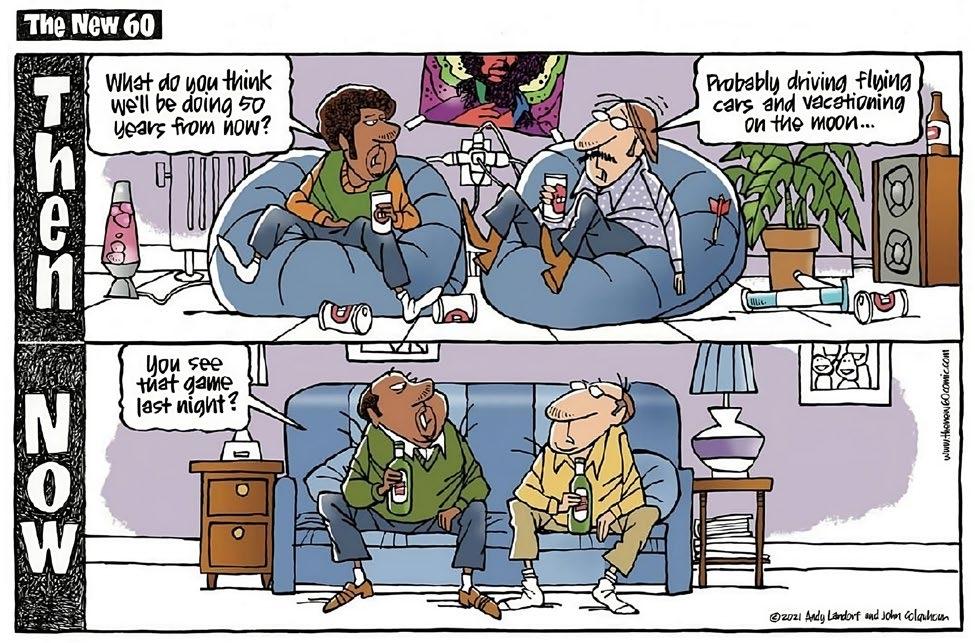

How do you make a tissue dance? Put a little boogie in it.
What do youcalladogthat performsmagic?
Labora Cadabora
What do you call a fish without eyes? Fsh.
84
Hey Harry, I heard someone stole your wife’s credit cards?. Yep, that’s right, Stan. Well, did you report it to the police? No Why not? Because whoever stole her credit cards is spending less than she is. Hahahaha

A ham sandwich walks into a bar and orders a beer, bartender says “sorry, we don’t serve food here.”

There are two muffins baking in the oven.
One muffin says to the other, “Phew, is it getting hot in here or is it just me?”
The other muffin says, “AAAAHHH!! A TALKING MUFFIN!”
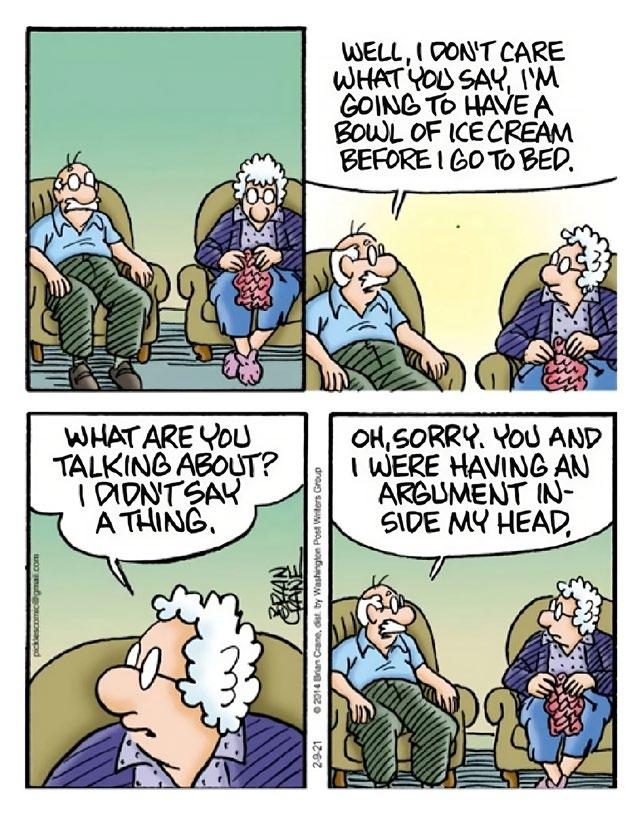
AUSTRALIAN CARERS GUIDE I 85
THE IMPORTANCE OF HAVING AN ADVANCE Care Plan
Podcast series knows the importance of honest and open discussions - because she’s had them. The conversations she had with her mother in the weeks before she died of breast cancer in 2010 formed an invaluable blueprint for her mother’s care.

take time to really consider what was important to them and their loved ones. She explained that having conversations about the final stages of her mother's life and death wasn't about giving up hope, rather, it was about planning for the inevitable.
Following National Advance Care Planning Week
2023, Advance Care Planning advocate Kellie Curtain is urging Australians to have their advance care planning documents in place for both them and their families.
The Advance Care Planning Australia
Ambassador and producer/ host of Breast Cancer Australia Network’s Upfront
Alarmingly, only 15 per cent of adults have an advance care directive1 and half of Australians are not able to make end-of-life medical decisions2
If you found yourself suddenly too ill to make treatment decisions, who would make those decisions on your behalf - and do they know what you would want?
“Opportunities to learn more about my mum”
Ms Curtain said an advance care plan allowed a person to control the narrative and to
“There were a lot of things that she could not have cared less about, but I didn't want to get it wrong or live wondering if I'd got it right, so I asked, she answered, and I wrote it down,” she said.
“I am forever grateful that I did because, in the heightened emotions, I would have forgotten. I knew she wanted to die at home, she told me she didn’t want visitors and said she didn’t want ‘Wind Beneath My Wings’ played at her funeral.
“Those conversations that we had over cups of tea and
Ambassador Kellie Curtain urges Australians to have vital conversations about future health preferences.
All images shutterstock I AUSTRALIAN CARERS GUIDE 86
Kellie and her late mum, Pam.
glasses of wine were at times awkward; they were sad and confronting but there were a lot of laughs too. They led to countless opportunities to learn more about my mum and to say, ‘I love you’.”
Ms Curtain, a mother of four, explained that taking charge of your advance care plan, or having the conversation, was an act of love. “We rarely worry about things that make us uncomfortable if it protects the ones we love. An advance care plan or a conversation will do that. The reality is, not talking about dying and death won't stop them from happening. But it might leave those you love most with the heavy burden of big decisions and the fear of making the wrong ones.”
Don’t delay important conversations
Advance Care Planning
Australia Program Director Xanthe Sansome said, “In light of our experience of the COVID-19 pandemic and the low number of Australians with advance care plans, it shows how important it is for Australians to have these tough but important conversations.
“Through the pandemic, we have been confronted with the
reality that all of us, including those we care for, could become critically ill at any time. Advance care planning is not something any of us should delay any longer – whether we are the carer or the one being cared for.”
While already carrying a load of responsibility, it’s important that, as carers, we understand what might be expected of us if we’re called upon to make medical treatment decisions for others. Making these decisions for others is hard. It can be needed following a sudden medical event or a gradual decline, when the person we love becomes unable to communicate for themselves. Advance care planning can ease the stress for carers and family members and help ensure we are following our loved ones’ wishes.

AUSTRALIAN CARERS GUIDE I 87
15% of adults have an advance care directive
How can we prepare for future health care?
WHAT TO CONSIDER
It’s important for us to consider our values, beliefs and preferences for our future health and care while we are still able to make decisions and communicate our preferences and acceptable outcomes. To effectively communicate values and preferences to others, we must first know and understand these ourselves. Take the time to consider the prompts below together and then share your thoughts with your loved ones.
Our current health
• Do we feel we have a good understanding of our current health?
• How does our current health affect our lives?
• Our future health
• What makes life worth living? For example, talking to our family
• What short and longterm goals do we have? For example, attending a birthday, going on a holiday
• What abilities do we need to maintain to preserve our dignity? For example, toileting independently
• What if we cannot recognise or communicate with our family?
• What if we cannot eat or drink?
• What if we lost our independence and needed help to do everything?
Medical treatments
We should think about the medical treatments we may or may not want. This is no different to arranging our life insurance or our Will. There are no wrong answers to these questions.

Past experiences
Have any past experiences of health care influenced our views on our future care? These may be positive or negative experiences that have happened to ourselves or others.
What treatments will help us to live the way we want? What would be outcomes we would find acceptable? For example, we might feel we have to be able to feed ourselves or think for ourselves. How may our cultural, religious or spiritual beliefs
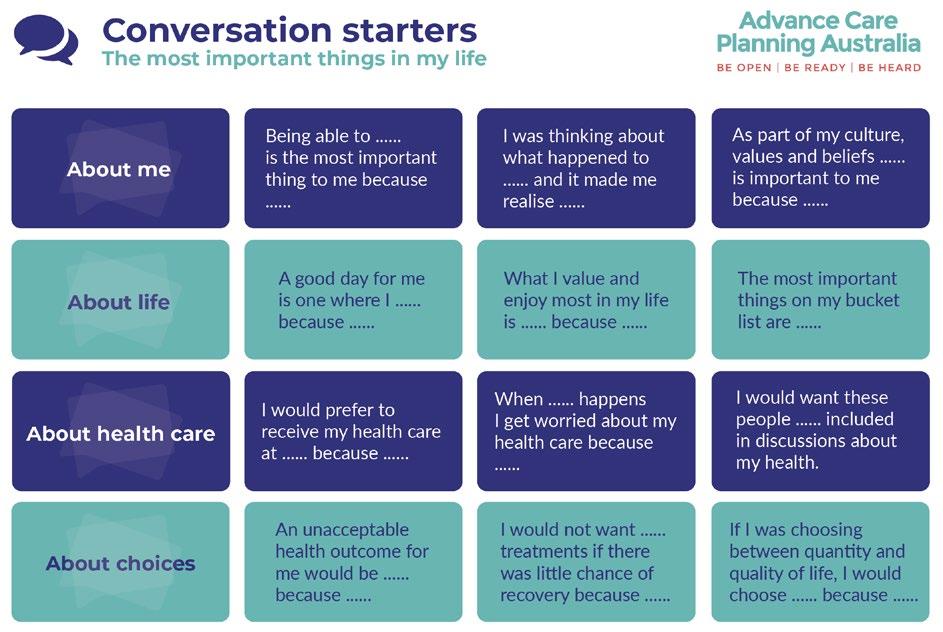
I AUSTRALIAN CARERS GUIDE 88
affect our choice of medical treatments or influence our care preferences? Are there any medical treatments that we feel strongly about - either having or not having? Consider lifeprolonging treatments.
Don’t assume loved ones will know our wishes
Encourage the person you’re caring for to speak to family members and others close to them about their views and preferences for medical care. We need to do the same for ourselves. Having a close or loving relationship does not always mean someone knows or understands our preferences.
The more loved ones understand our preferences, the easier it will be for them to help guide our medical treatment and to focus on our needs rather than wondering what the right decision might be.

For tips on talking to our loved ones about our preferences, read about starting the conversation.
We should also speak to our doctors. They can provide us with information and advice regarding our current health situation and what may happen in the future. We can ask questions about the impact of treatments on our wellbeing or how this might change without certain treatments.
Choose a substitute decision-maker
A substitute decision-maker is someone we choose to make medical treatment decisions on our behalf if we become unable to do so. We can choose more than one substitute decision-maker. They should be somebody:
• we trust
• who is over 18 years
• who will listen carefully to our values and preferences for future care
• who will be comfortable making decisions in difficult situations
When choosing our substitute decision-maker/s, we should ask ourselves the
question: ‘Am I confident they will make decisions based on what I would want?’ Some people we might want to consider are our:
• partner
• close friend
• sibling
• adult child
• parent
• cultural leader
Our chosen substitute decision-maker/s* may have to make important decisions on our behalf so it's important for them to understand what's involved with being a substitute decision-maker.
*Substitute decisionmakers may have different titles depending on the Australian state or territory you are in. Find out more at advancecareplanning.org.au
Record your choices
After we’ve thought about our future health care, discussed it with others and selected a substitute decision-maker, we should record our choices in the required document (or documents). The process of
AUSTRALIAN CARERS GUIDE I 89
The more loved ones understand our preferences, the easier it will be
doing this varies between states and territories.
While these forms differ across Australia, most advance care directives provide an opportunity to complete both values and instructions for medical care. The values section helps others understand what is most important to us and what outcomes we would find unacceptable.
The instructional part of the advance care directive specifies which medical treatments we would consent to, refuse or withdraw from (e.g. tube feeding, CPR, palliative care etc.) It can be challenging for individuals to fully understand the benefits and burdens of different treatments. It is a good idea to complete this with the support of our GP or treating team.

Make documents accessible
Our advance care directive is of little use to anyone if the only copy is locked away in our solicitor’s office or filing cabinet. Given that an advance care directive may be needed in an emergency or crisis, we should keep our advance care directive accessible at home, such as near our medicines. When we ask our doctor to sign our documents, we should check if they can upload advance care planning documents to My Health Record (digitalhealth. gov.au/ACP) or upload them ourselves. We should share copies with our chosen substitute decision-maker, loved ones, local hospital and
other health providers. This will enable documents to be accessed when they’re needed most so everyone is aware of our choices.
Keep documents up to date
Life changes and so do we. It’s important to review our advance care directive every year or so. Major life events such as retirement, divorce, the onset of a significant illness or a change in our prognosis or ability to manage daily activities are good opportunities to review our plans with fresh eyes and ensure others know about any changes.
Free information and support
Visit advancecareplanning. org.au to access a free email starter pack and other helpful information. For free support or to ask for a starter pack to be mailed, call the National Advance Care Planning Support Service on 1300 208 582 from 9am5pm (AEST) Monday to Friday. Advance Care Planning Australia is funded by the Australian Government. ACG

1. Maria J. Silveira, M.D., M.P.H., Scott et al, Advance Directives and Outcomes of Surrogate Decision Making Before Death, The New England Journal of Medicine, 2010; 362:1211-1218. Available at https://www. nejm.org/doi/full/10.1056/NEJMsa0907901
2. White, B., Willmott, L. et al, Prevalence of advance care directives in the community: A telephone survey of three Australian States. Internal Medicine Journal, 49(10), pp. 12611267. Available at https://eprints.qut.edu. au/126743/2/126743.pdf
I AUSTRALIAN CARERS GUIDE 90
The values section helps others understand what is most important to us
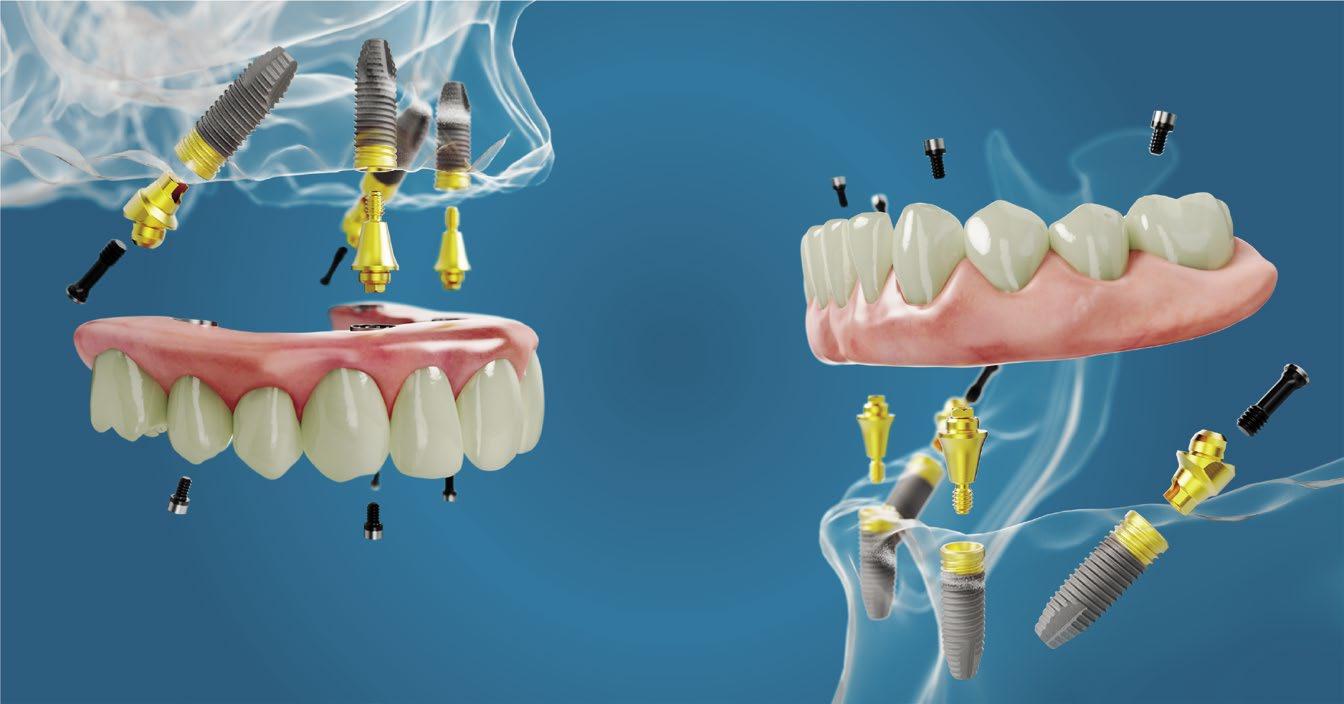


OTHER SERVICES Cosmetic Dentistry Visit Our Website Contact Us www caseysmiles com au (03) 5996 6273 THE ALL-ON-4® TREATMENT CONCEPT IS A COST-EFFICIENT, GRAFTLESS SOLUTION THAT PROVIDES PATIENTS WITH A FIXED FULL-ARCH PROSTHESIS. Dental implants & Dental Veneers Root Canal Treatment General Dentistry Teeth Whitening Orthodontics Sleep Apnea Sleep Dentistry All-on-4® Dental Implants Wisdom teeth extraction Invisalign Crowns and Bridges Visit us 2/14 Stawell Street, Cranbourne, VIC
Carer Support Groups Can Make a Difference
56% OF CARERS FEEL SOCIALLY ISOLATED*

The role of an unpaid carer is one that many of us take on for someone we know. It can be rewarding, but at the same time it can be challenging, relentless and at times very isolating.
Data suggests that most carers are living with the person they care for, typically spending 104 hours per week caring and have been caring for an average of 12.6 years.* With demands at this level, it’s not surprising that carers report experiencing feelings of isolation and often suffer poorer mental health and wellbeing than others in their communities.
Connecting with a local community can make a significant difference in the lives of carers. Carer Support Groups are a cornerstone piece of the unpaid caring community as they provide a space where carers feel comfortable connecting with peers through common needs and sharing lived experiences.
Carer Support Group members are able to help each other in many ways:
› Emotional support – a safe space to talk things over with others who understand the pressures of caring.
› Practical information, tips, and resources – most support groups share information about local services, medical treatments and research, or tips to help in the caring role.
› New friends – many carers find the demands of caring make it difficult to stay connected with friends and family. Regularly getting out to a support group can expand their social circle and help minimise the feelings of isolation.


Online Carer Support Group Directory






Carers Victoria’s online Carer Support Group Directory is live and updated! It’s a terrific way for carers to find details about their local Carer Support Groups, including information about the group’s focus, upcoming activities, location of the meetings and how carers can get in touch. www.carersvictoria.org.au/ CarerSupportGroupDirectory
Keep in touch with all the latest happenings for carers. Join Carers Victoria’s FREE membership today!
As a member of Carers Victoria, you gain exclusive access to the following:

› exclusive invitations to workshops and events including our popular Mingle events
› our monthly eBulletin ‘The Voice’ - jam-packed with important carer issues, events and stories

› free digital access to the Australian Carers Guide magazine and;
› the opportunity to champion for real change through consultations, focus groups and research
Join now, scan the QR Code or visit www.carersvic.com.au/OurMembership
If you have any questions regarding Carers Victoria membership, please do not hesitate to contact our membership team at membership@carersvictoria.org.au or 1800 514 845 (option 4).
*Data sourced from the 2022 National Carer Survey National Highlights report
3156 APR 2023
Carers Victoria have partnered with the Play For Purpose charity raffle for their next big draw! This is an opportunity to raise funds that will go towards assisting Victoria’s unpaid carers!

Final Draw takes place on Thursday 15 June 2023!

There are over 700,000 unpaid Victorian carers who provide an invaluable contribution to the people whose lives they touch and consistently make a positive impact in the community. At Carers Victoria our mission is to advance the understanding of Victoria’s unpaid carers and improve their access to assistance.
Tickets are only $10 each, and 50% of the proceeds return to Carers Victoria.
This raffle gives ticket holders a chance to WIN a $250K first prize pack including the incredible Crafter Kampervan valued at over $144,000 PLUS over $100K in gold bullion.





If you do not have a chance to enter the draw by 15 June 2023 not to worry! Purchasing tickets after this date will automatically enter you into the next draw. Although prizes may vary the value of the prize pack will remain.

For more details on upcoming draws please visit www.playforpurpose.com.au

www.carersvictoria.org.au/PlayForPurposeRaffle

you ticket now
Purchase
3156 APR 2023 ALL NEW FIRST PRIZE PACK & HUNDREDS OF OTHER PRIZES
CHANCE
LAST
Nourishing the young at heart
Carers Victoria have partnered with Live Life Foods to provide high quality nourishing meals for carers and/or their care recipients.
Our commitment to supporting carers has led to this special collaboration with Victoria’s newest home meal delivery service of affordable and healthy eating options.
Live Life Foods prides itself on the freshness and restaurant-quality of its meals, whilst ensuring the meals meet the daily nutritional requirements of Victoria’s seniors. The range was developed for the over 65s in accordance with Nutrition Professionals Australia (NPA) to ensure the robust industry guidelines for protein and energy are met each day.
Partnership Benefit Announcement
Members of Carers Victoria will be provided a discount code that can be used to gain access to exclusive deals and discounts with Live Life Foods for membership duration.
Register with Live Life Foods and obtain your Carers Victoria member discount code

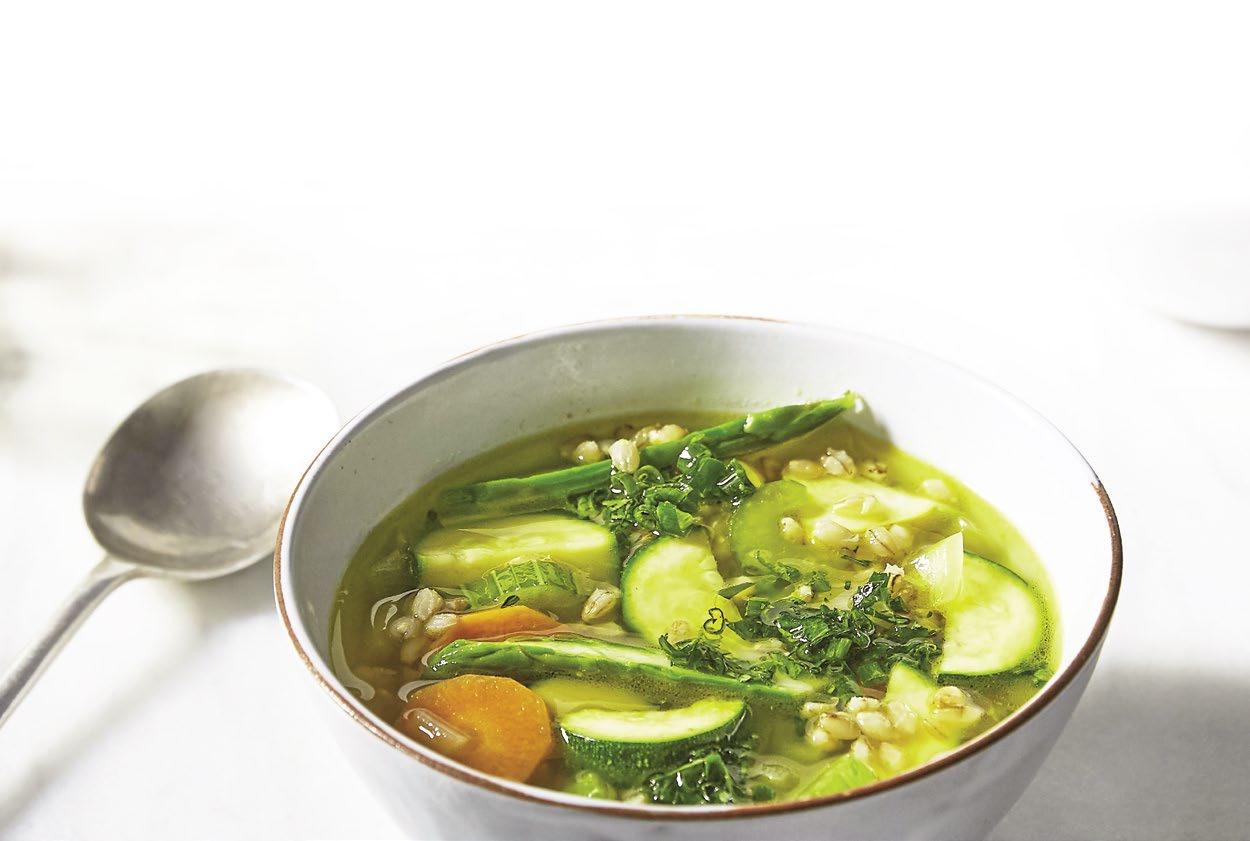
www.carersvictoria.org.au/LiveLifeFoods
To celebrate this amazing partnership there will also be a series of competitions launched over the coming months that you will not want to miss.

Becoming a member of Carers Victoria will ensure you’re the first to gain access to these exclusive benefits.
Become a member now
Scan the QR Code or visit www.carersvic.com.au/OurMembership
3156 APR 2023
CARE CARE CARE CARE
3 Major Care Events

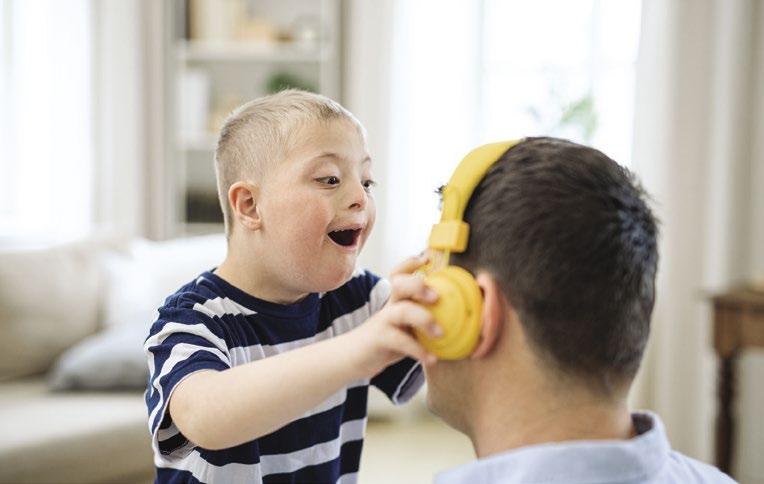
MELBOURNE BRISBANE SYDNEY
11th - 12th August 2023
Melbourne Showgrounds
1st - 2nd September 2023
Brisbane Convention & Exhibition Centre
NEW
10th - 11th November 2023
International Convention Centre
Presented by
When connecting and forming your care community, you deserve to select from only the best.


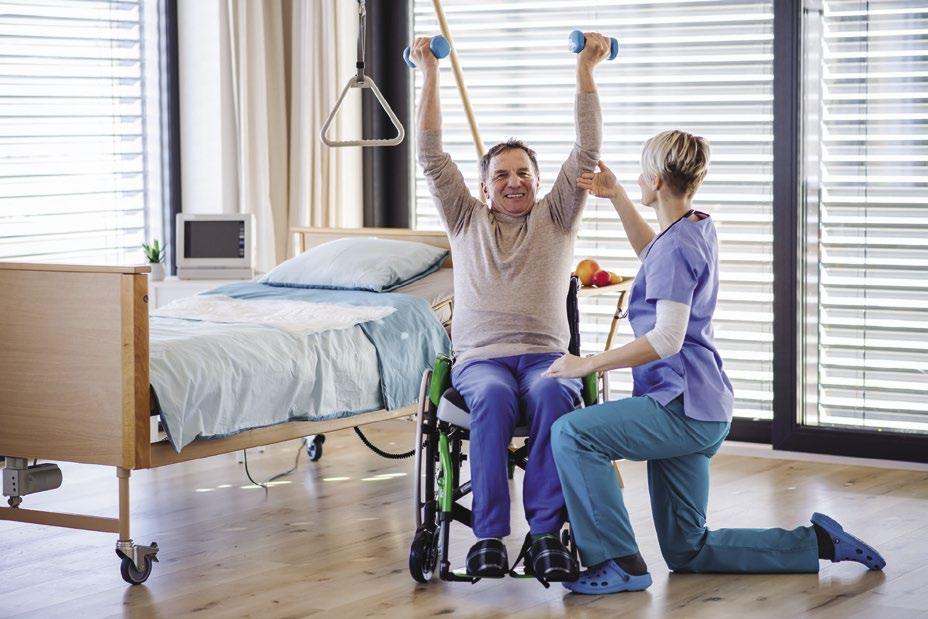
Outstanding care stems from putting people first and nurturing great connections, and the 2023 Care Expos are ready to showcase the absolute best in care.


Held in Melbourne, Brisbane, and Sydney, the 2023 Care Expos are diverse industry and consumer exhibitions, showcasing products, services, and facilities in an established environment where you are heard, valued, and celebrated. Have more choice and more control as you speak one-on-one with approachable exhibitors and integrate care into your life, your way. More than anything, 2023 Care Expos are about bringing people together to share successes, innovations, and stories. Be informed and confident when it comes to your care, with the Care Expos empowering you to live your best life. The Care Expos are a must-attend event for carers, clients, and families looking to discover and connect with providers. Now is the time to reach out and discover your care community.
The Melbourne, Brisbane and Sydney Care Expos will provide unparalleled opportunities for business, organisations, providers, and government agencies within care sectors to reach out to event visitors, professional networks, and the wider community. An event like no other - meet the experts ready to transform your care and allow you to embrace life to the fullest at our 2023 Care Expos!
f CareExpo i CareExpoAus CareExpo.com.au
REGISTER ONLINE you care community Connecting
2023 CARE EXPOS LAUNCHED FREE TO ATTEND ENQUIRE TO EXHIBIT TODAY or Freecall 1800 671 588
to the
Tasmanian Carer Recognition Legislation
On 29 March 2023, the Tasmanian legislative council passed legislation to formally recognise carers in Tasmania. The legislation received Royal Assent from the Governor on 20 April 2023. Tasmania had been the last state in Australia to not have this important legislation despite having the highest proportion of carers in the nation, with a ratio of 1:6.
Carers Tasmania had lobbied various Tasmanian governments to introduce such legislation for over a decade.
The current legislation was developed after consultation by the Department of Premier and Cabinet and Carers Tasmania with carers and stakeholders across the state.
Carer recognition legislation is different in every state. The Tasmanian Carer Recognition Act 2022, defines, and formally recognises carers as: a person who provides unpaid care and support to a family member, or friend, who –

(a) has disability; or
(b) has mental ill health; or
(c) has a chronic or life-limiting condition; or
(d) has alcohol or other drug dependence; or
(e) is frail or aged; or
(f) is a child, if the person is an informal kinship carer of the child.
“The legislation is long overdue that they are seen, acknowledged and respected as a matter of law,’ said Carers Tasmania’s CEO, David Brennan. Image by pressfoto on Freepik
CARERS TASMANIA I AUSTRALIAN CARERS GUIDE 98
Tasmania is the first state to recognise carers supporting a person with alcohol or other drug dependence in its legislation, and the language used is inclusive and contemporary.

The Act also includes a Carers Charter that outlines expectations around recognition, inclusion, and access to support for carers. State Service Agencies are obligated to take reasonable steps to implement the charter items.
Charter items include:
1Carers should be acknowledged as diverse and are to be treated as individuals with their own needs within, and beyond, their roles as carers.
2Carers should be consulted in relation to the development and evaluation of policies and programs, and the provision of resources, in so far as those policies, programs and resources affect their role as carers.
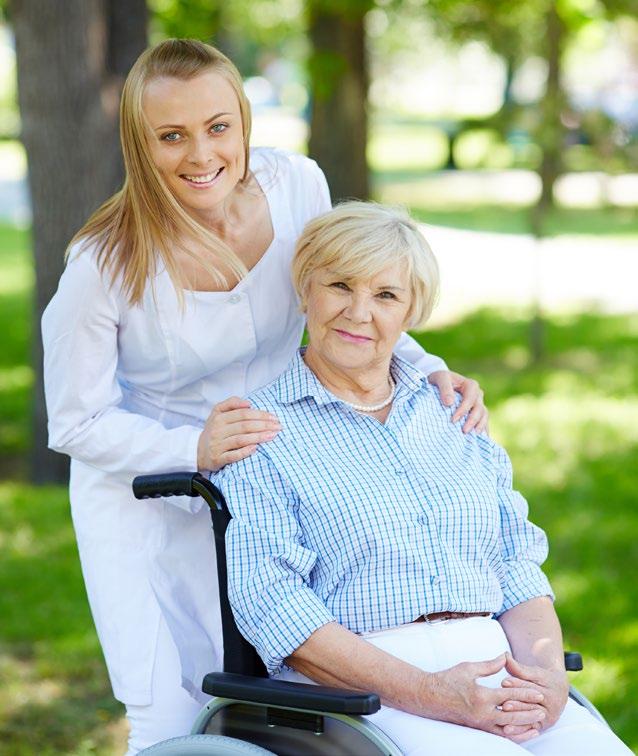
3Carers should be empowered to access information and services that are relevant to them in their role as carers.
4Carers should be supported to participate in, and contribute to, the social, political, economic and cultural life of Tasmania, if they so desire.
5Carers should be recognised and respected for their valuable caring role and should be supported in accessing, and engaging in, a wide range of services to ensure their well-being and to maintain their connections to their community.
6Carers’ knowledge about the persons for whom they are caring should be respected, acknowledging that each carer, and each person being cared for, has both rights and responsibilities.
7Carers should be able to raise concerns about decisions, and services, that affect them as carers or the persons for whom they are caring, without the carers or such persons suffering adverse repercussions, and those concerns should be dealt with as promptly as is reasonably practicable.
This Charter may be used by carers in situations where they feel they are not included, respected, heard, or supported, particularly when engaging with State Service Agencies.
In accordance with the Act, the Tasmanian Minister must also approve a Carer Action Plan, which sets out obligations of State Service Agencies to better recognise, include and support carers.
Progress on the items listed in the Action Plan will be monitored by the Minister’s Carer Advisory Council, which, for the first time, includes up to five carers with lived or living experience. The Minister will also provide an annual report to Parliament on the progress of meeting the Action Plan items.
CARERS TASMANIA AUSTRALIAN CARERS GUIDE I 99
Comments received from carers throughout the consultation stage indicate the importance of recognition, consultation, and inclusion for carers, as well as support for their wellbeing and connections to their community.
During consultations, one carer said:
“Recognition is needed of the “unseen” work of a carer - the time, financial burden, and mental load of managing a family where 2 of 4 children have special needs - while also trying to work full time and fit in some self-care. While the cost of living continues to rise and wages stagnate, the expectation on me as an
unpaid carer to work at a job AND manage schedules AND keep my bills paid AND buy a house AND stay sane is enormous and unappreciated.”
Another said:
“I’d love to be listened to, consulted & included as part of the hospital discharge process & other medical appointments. Consulted regarding supports that may be needed & alerted to services that help could be sought from.”
Mary Donovan, a carer for her husband with Huntington’s disease, was pleased with the passing of the legislation.
“I hope this legislation will assist more people to recognise that carers have needs too, like getting a break and the chance to connect with other carers.”
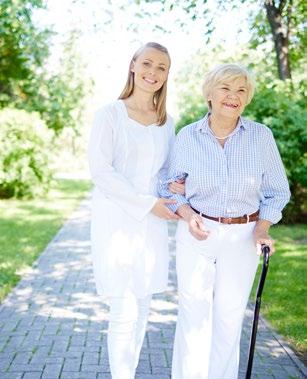
“I also hope that we carers stop being invisible to professionals in the health system and that our opinion is sought and valued,” said Mary.
Have you listened to the 1 in 6 Podcast?
The 1 in 6 Podcast is a series of stories about the diverse experiences of Tasmanian carers.

Hosted by former ABC newsreader Peter Gee, the podcast is an initiative of Care2Serve, the service delivery arm of Carers Tasmania and the service provider of Carer Gateway services in the state.
The title of the podcast refers to the ratio of carers in Tasmania, with one carer for every six people.
Through a series of nine captivating stories, the podcast aims to highlight the significant contributions carers make to their communities and to showcase the unique experiences of each carer. The episodes feature carers caring for someone who is ageing, is palliative, has Alzheimer’s disease, with disability, has alcohol dependence or with other health conditions.
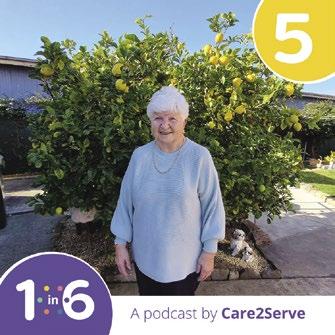
The carers share their experiences growing up, their relationship with the person they care for, and how receiving support through Carer Gateway has made a difference in their caring roles.
The 1 in 6 Podcast is available for free on Spotify and Apple platforms and can be found by visiting the Care2Serve website (care2serve.com.au) or Facebook page (facebook.com/care2serve).
If you care for someone or know someone who does, find support at Carer Gateway on 1800 422 737 (press “1” from the menu) or carergateway.gov.au
“What a great feeling to be seen and be valued by the parliament.”
CARERS TASMANIA
Feeling overwhelmed? Carer coaching might make the difference I AUSTRALIAN CARERS GUIDE 100
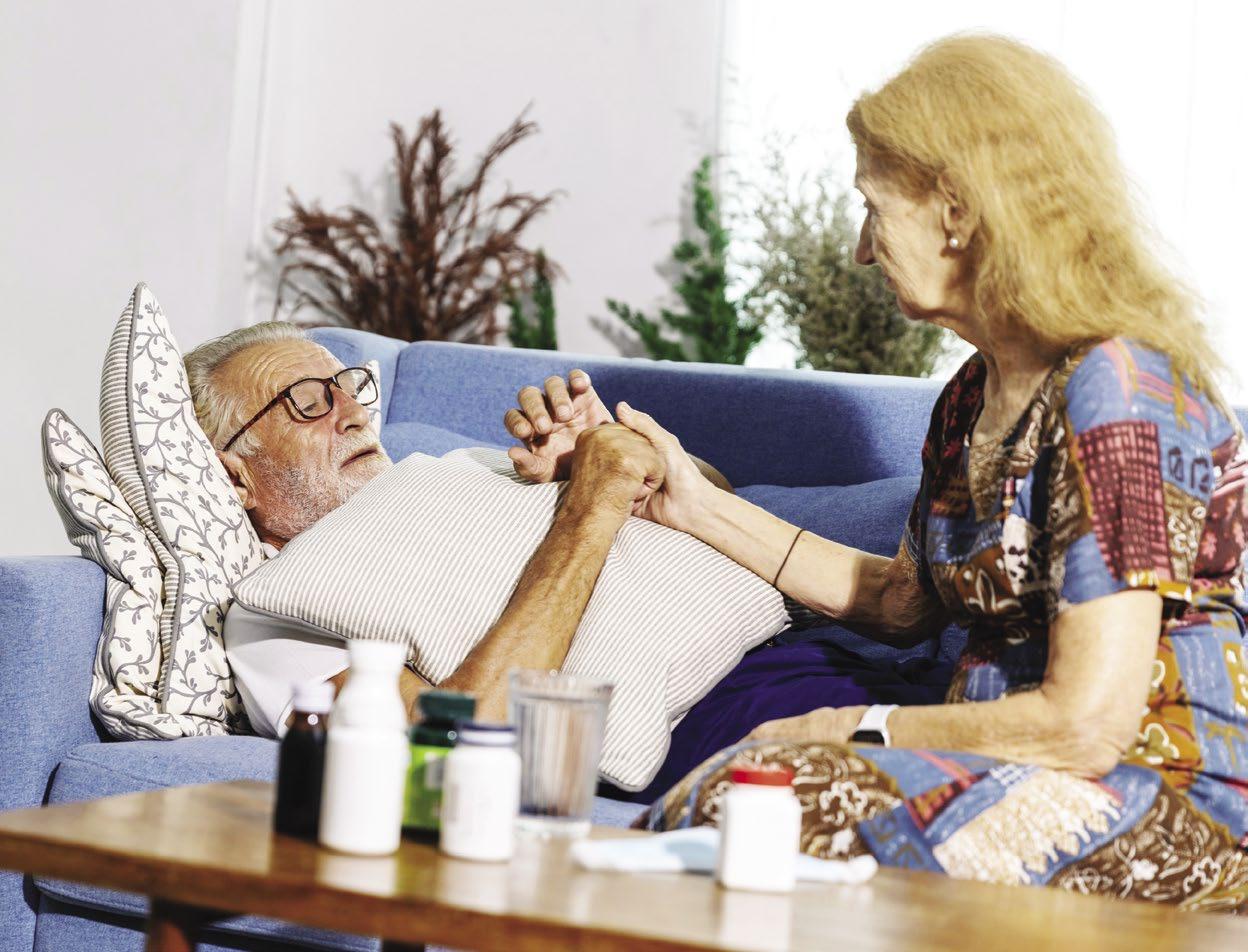
We’re
to
you. When caring for someone there is a lot to think about and do. A carer often looks after everything for a loved one such as personal care, medications, finances and appointments, as well as dealing with the normal demands of everyday life. It can be overwhelming. But you’re not alone and there is assistance available to help you manage. Find out how we can support you. carergateway.gov.au Phone 1800 422 737 (press 1)
here
support
a
room
When your heart is full of grief there’s not
lot
of
in your head for the demands of being a carer.
Beautiful
in an extraordinary way”
The brand new film Live the life you please will premiere in cinemas across Australia from May 22nd. That’s soon! And with sessions in over 50 cinemas, one will surely be close to your home.
Join the movement to drive a national conversation about making better end-oflife care available to all Australians.
Live the life you please is a definitive, new feature documentary film about living and dying in Australia.
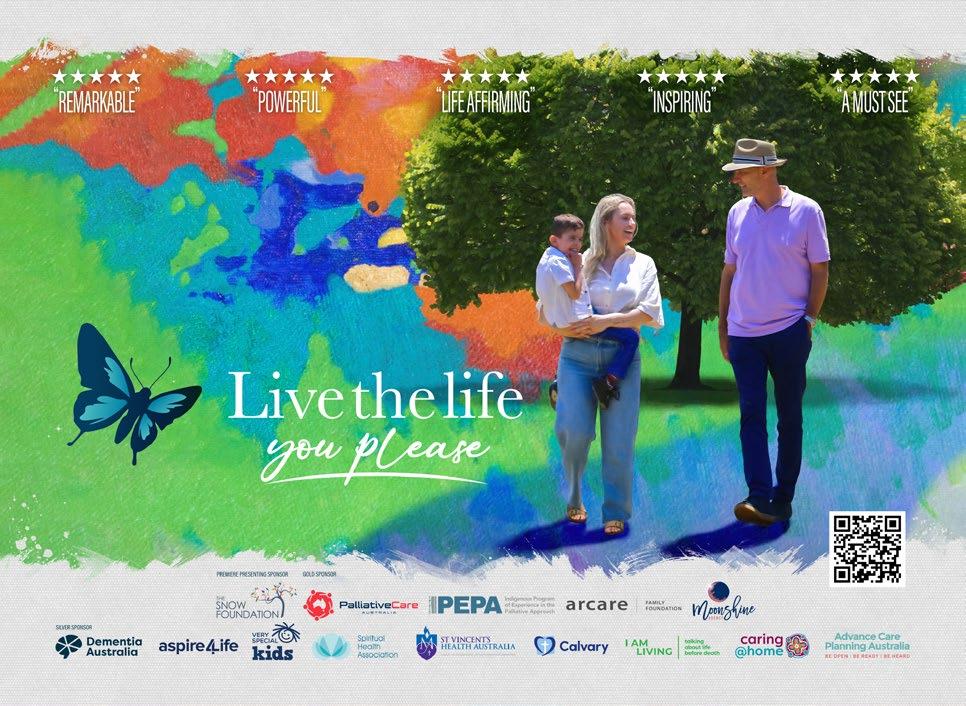
Produced by multi-awardwinning filmmakers, Live the life you please boasts a treasure trove of incredible stories captured all around Australia, from cities and regional centres to remote communities.
It will make you smile, laugh, laugh harder and occasionally shed a tear as it shares the stories of a diverse range of Australians experiencing their last chapter.
It’s about embracing every moment and living the life you please until the very end.
Be part of this remarkable story!
Watch the trailer: https://youtu.be/Xq5zqgztAeg
See what people are saying about the film: https://vimeo.com/moonshineagency/ review/823618488/9faa812c1d
Join us in celebrating Palliative Care Week 2023 by seeing the film at a cinema near you.
Tickets now on sale in every state and territory across the country.
Book your tickets here: https://livethelifeyouplease.com/see-the-film
“
I AUSTRALIAN CARERS GUIDE 102
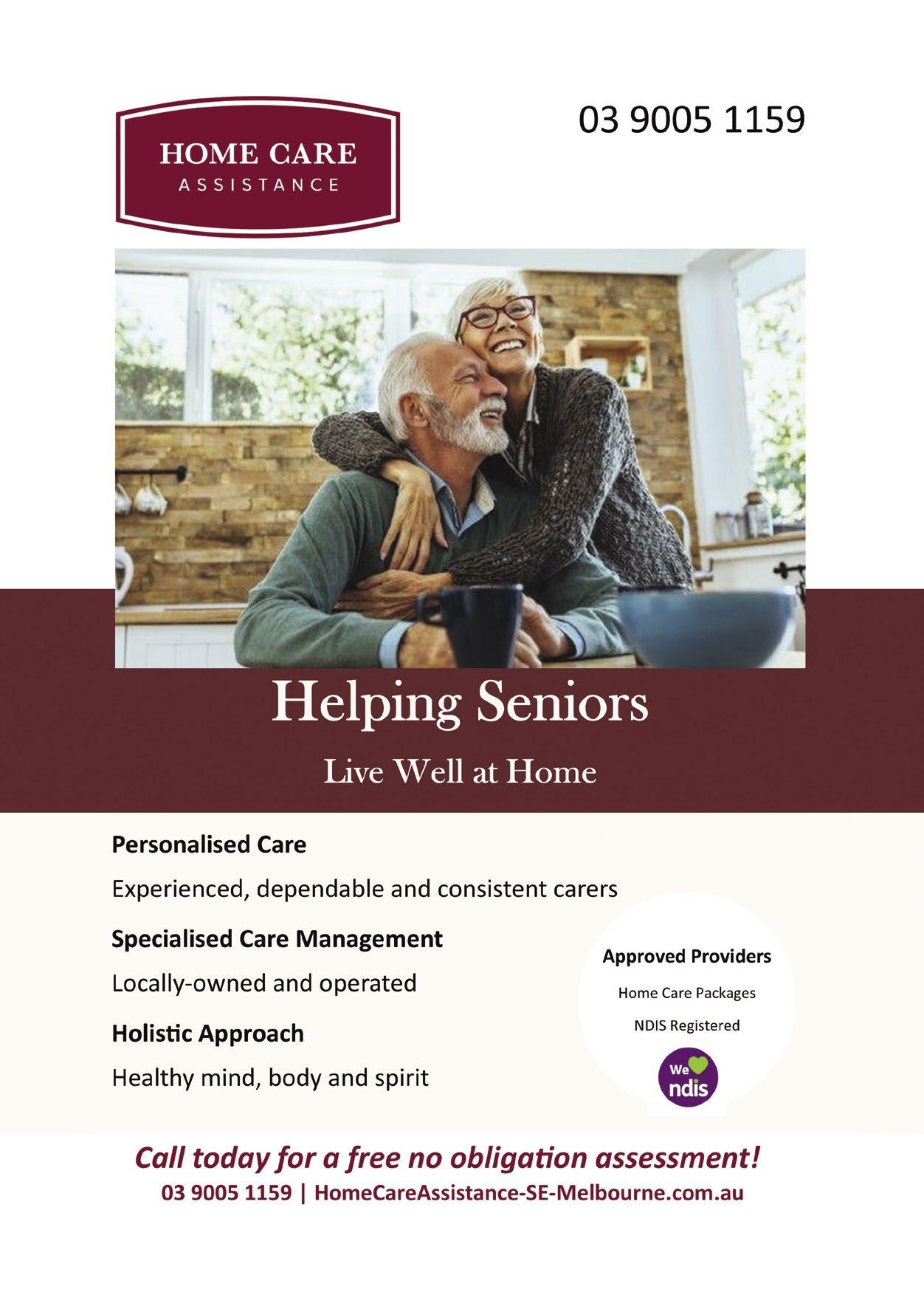
How to care for someone with incontinence
ith the right support and management techniques, however, incontinence doesn’t have to come at the expense of a fulfilling life. Many people with this condition enjoy socialising, travelling, exercising, and having a healthy sex life, proving that life doesn’t end with incontinence.
Starting the conversation
The first step to breaking the stigma surrounding incontinence is to talk about it. While this might sound simple at first, the topic can feel awkward or embarrassing – both for people living with the condition and their carers. Despite the initial discomfort, starting the conversation is incredibly important for both the mental and physical wellbeing of your loved one.
According to a recent industry survey*, 78% of people believe incontinence affects their mental health in some way, with 12% of people believing it has a high impact on their emotional well-being. Speaking openly about the
Wtopic can be the first step to helping your loved one manage or even improve their condition.
If you think someone you love may have continence issues, there are a few important things to consider before bringing up the conversation.
• Choose the right time and place. This should be somewhere private where your loved one feels relaxed and comfortable, and where you can talk without disruptions and distractions.
• Use language that is sensitive and respectful. Remember that incontinence is an issue shrouded in shame, so your loved one will likely feel vulnerable speaking about it openly. Think about what you want to say before you have the conversation and avoid words that may be embarrassing or offensive.
• Approach the conversation with empathy and understanding. Give
by
Image
pch.vector on Freepik
While most Australians will know someone who is affected by incontinence, harmful stigmas and misconceptions around the condition mean that sufferers can end up feeling isolated and unable to enjoy life in the same way they once did.
I AUSTRALIAN CARERS GUIDE 104
Embracing social continence
Due to the stigma and shame surrounding the condition, maintaining an active social life can be difficult for people living with incontinence. According to a recent industry survey*, more than 80% of people say that incontinence impacts their social life in some way, while more than 16% say it has a high impact. However, with proper management and preparation, it is entirely possible to manage incontinence while living an active, fulfilling lifestyle. Learning how to be ‘socially continent’ through careful preparation and management can help take the stress and anxiety out of socialising, exercising, or travelling with continence issues. Not only can this make day-to-day life much easier and more enjoyable, but it reduces further risk of mental and physical health problems
your loved one space to explain their experiences and feelings if they feel comfortable doing so. Some people won’t want to discuss the issue straight away, so be patient and willing to have the talk when they’re ready.
• Share your concerns with your loved one and let them know you want to help them through the process. Offer support and let them know there are treatments and proven ways of managing incontinence.
that can make incontinence even harder to manage. When planning for a socially continent outing, be sure to consider the following;
1. Be sure to plan ahead. Prior to leaving for a social outing, check where the nearest restrooms are so you can help your loved one easily access them if needed.
2. Wear the right clothing. Think about what will allow your loved one to get changed quickly and in small spaces while still feeling comfortable during the social outing.
3. Pack extra supplies. To ensure you and your loved one have peace of mind, ensure you have enough continence supplies – such as pads, disposable catheters, wipes, and gloves – for the duration of the outing and add one extra set in case of an emergency.
4. If comfortable, communicate your needs to your travelling partners. This may include the need for extra rest stops or easy bathroom access.
Intimacy doesn’t have to end with incontinence
When you live with continence issues, intimacy can be an emotionally and physically challenging experience. While feelings of discomfort, shame, stress, and insecurity can surface during sex, incontinence doesn’t need to stop a healthy and fulfilling sex life. With the right
AUSTRALIAN CARERS GUIDE I 105
Incontinence affects the day-today lives of one in four Australians, including 38% of women and 10% of men
management strategies, it is possible to enjoy intimacy and sexual function despite the challenges of incontinence. A great first step is to have a conversation with your sexual partner about what sex with incontinence looks like for you.
Communicating your needs ensures your partner knows how to help you enjoy intimacy from both a physical and mental standpoint. This can be as straightforward as communicating the need to use the bathroom immediately before being intimate, or opening up about the emotional challenges that come with sex.
If your sexual partner is incontinent, it’s also important to understand how you can best support them during sex. Discovering positions that reduce pressure on the bladder are one of the best ways to manage continence issues, as it will provide your partner with better bladder control. Pelvic floor exercises can also help to improve bladder and bowel control by strengthening the muscles in the area.
By working with your loved one to manage their incontinence during sex, you will not only help them to manage the physical symptoms but will give them the space and confidence to enjoy intimacy in a way that works for them.
Managing incontinence day-to-day
A common misconception about incontinence is that the condition cannot be improved or managed with lifestyle changes. This myth only fuels the shame and embarrassment surrounding continence issues and contributes to the sense of isolation many people feel when dealing with incontinence.
The truth is that most people who experience incontinence can improve their condition through a series of habits and lifestyle changes.
and alcohol to prevent excessive urine production.
• Staying hydrated in order to prevent the urinary tract from irritation.
• Improving bladder control through the use of regular exercise. This is particularly true for pelvic floor exercises, which play a big part in maintaining our urinary tract health and control.
• Quitting smoking, which lowers the risk of health conditions affecting the bladder and bowel that can lead to further incontinence.
As a carer or loved one of someone with incontinence, it’s a great idea to familiarise yourself with simple yet effective habits that will allow them to better manage and alleviate their condition.
Examples of simple yet effective continence management techniques include:
• Reducing additional pressure on the bladder by maintaining a healthy weight.
• Increasing dietary fibre intake to prevent chronic constipation and reduce the chances of urinary and faecal incontinence.
• Limiting urinary tract stimulants like caffeine
With incontinence affecting millions of Australians across all demographics, it’s essential that we break the stigma by leading with education and conversation. By understanding the experiences of those living with the condition and supporting them with effective management techniques, we can empower people to live a life they love despite their incontinence. ACG

AUTHOR: Sonya
Meyer is a consultant with ConfidenceClub, a continence management company that delivers products straight to the customer’s door.
*Figures relate to a recent industry survey of more than 2,600 respondents conducted by ConfidenceClub
I AUSTRALIAN CARERS GUIDE 106

Funded by the Department of Health and Aged Care, LiveUp is a free healthy ageing guide designed to help older people maintain or regain their indepdence. LiveUp provides the impartial expert advice, personalised support, and community connections people need to age their way. Welcome to the upside of ageing Talk to a Navigator for free on 1800 951 971 or discover more at liveup.org.au SCAN ME TO LEARN MORE
HOME CARE PACKAGE Tips and Traps

 by RACHEL LANE FROM AGED CARE GURUS
by RACHEL LANE FROM AGED CARE GURUS
There are now more people receiving care through a home care package than those living in an aged care home. As at 31 December 2022 there were 255,628 who had been assigned a home care package.
Who is eligible?
To be eligible to receive a Home Care Package you will need to have an Aged Care Assessment Team assessment (normally called an “ACAT” or “ACAS” in Victoria). The assessment is free and will normally be conducted in your own home – you are welcome to have a friend or family member attend the meeting with you (in fact
it can be a good idea) and if you need an interpreter the ACAT can arrange one for you. There is no age restriction and there is no financial means test on receiving a home care package, it is based on your care needs.
■ TIP: It is common that there is a wait time for your assessment to be conducted – if you are in urgent need it can be done in a few days but anything from a few weeks to a few months is common depending on your need and location.
TRAP: The purpose of the ACAT assessment is to determine what support you need to continue living as independently as possible. Most people want to put their best foot forward but there’s really no need to dress up in your best outfit, likewise, saying “I’m fine” or downplaying the support you need won’t be in your best interests.
■ TIP: As part of your ACAT assessment the team will also look at other services that may assist you, such as




a respite stay in an aged care home or even permanent entry. Instead of declining other approvals think of your ACAT like a passport – if you’re approved then you can use it and the government will fund it, if you’re not you will need to be re-assessed.


What happens next?
Assuming you are approved then when you get your assessment back (known as a Support Plan) it will list the services you have been approved for and you will be placed on the National Prioritisation Queue for your home care package.

There were 37,894 people in the queue for a Home Care Package at their approved level at 31 December 2022. Of those, 37,397 (99%) had been
Image by Shutterstock and Freepik
I AUSTRALIAN CARERS GUIDE 108 I FINANCE I
offered an “interim package” which is a lower level package than their assessed need or Commonwealth Home Support Programme services while they are waiting.



TRAP: Many people delay applying for a package until the need is urgent, don’t delay.





■ TIP: While you are waiting for your package to commence it is the perfect time to research which home care package provider you want to host your package.
Choosing a provider

When it comes to choosing a provider to host your home care package, it pays to shop around. Your preferred provider may not be able to take you on immediately so doing this early can be a good idea. No matter who you choose to host your package there will always
be administration fees (to manage the payment of your services) and case management costs (it is a requirement that you have a care plan). But how much it costs varies from one provider to another. On top of these costs there is obviously the fee you pay for the service/s you receive and often there are travel costs too (unless you live somewhere like a retirement village, where the care is already onsite).
There are providers that enable you to self-manage your package. They still develop a care plan for you and charge an administration fee, but it can be significantly cheaper – around 12% is common - this covers government compliance, paying your service providers, and keeping track of your package funds. It’s then up to you to arrange your care. Online platforms, like “Mable” can help here. Their platform enables you to connect with care workers in your local area. They charge up to 15% (5% paid by you and 10% by
the worker), which includes ensuring that workers have a police check, qualification checks and appropriate insurances. You contact and negotiate the cost, services, days and times directly with the care worker. Choosing your own carer/s is a completely different dynamic -You hire, and you fire!

What services can you get?
It’s really up to you. Your package can support you with daily activities like showering and dressing through to the purchase of mobility aids and home modifications. You can’t use your home care package funds to cover accommodation costs (like rent or mortgage payments) or for holidays and you can’t pay for other funded services like GP visits with your package funds either.
AUSTRALIAN CARERS GUIDE I 109
$
The best thing about a Home Care Package is that it can be delivered wherever you call Home, but that doesn’t mean it’s like Uber Eats. There can be delays to get assessed and then delays before your package starts, so if your plan is to “Age in Place” planning ahead is a very good idea.
The amount of funding in your package will depend on the level of package supplements you and whether or not you pay the basic daily fee.
example, let’s say you were receiving a Level 3 and you’re eligible for the dementia supplement your package
What does it cost?
Everyone who receives a Home Care Package can pay the Basic Daily Fee, the maximum is based on your package level.
Home Care Level 1 $10.88/day

Home Care Level 2 $11.50/day

Home Care Level 3 $11.83/day
Home Care Level 4 $12.14/day
Your ability to contribute beyond the basic daily fee is based on your (and if applicable your partner’s) income through what is called an Income tested care fee. People who receive the Full Age pension do not pay an income tested care fee. People with higher levels of income - which is based on Centrelink’s income test and may be very different the income you actually receive -
value would be:
$11.83 (Basic Daily Fee) + $96.27 (Basic Subsidy) + $11.07 (Dementia Supplement) = $119.17 per day
If the provider waived the Basic Daily Fee then you simply wouldn’t pay that $11.83 and your package funds would reduce by the same amount.

■ TIP:It can be easy to think “I only pay $83/week and I get 9 hours of care so I’m getting good bang for my buck”. But if you are receiving a level 3 package the total funding is $834/ week. Is it worth $93/hour?
pay an income-tested care fee on top.
The income tested fee is calculated at 50c per dollar of income above the threshold and capped at $6,341/year for part-pensioners and $12,683/ year for self-funded retirees. As at 20 March 2023 the thresholds were $31,140p.a for singles and $24,118 for a member of a couple. There is also a lifetime cap of $76,096. Your income-tested care fee cannot exceed the cost of your care — which is the funding the government provide.
■ TIP: The means assessment for a home care package is based only on income (unlike residential aged care which includes assets too). Choosing investments that are friendly for Centrelink’s income test could be a worthwhile
strategy even if you are a self-funded retiree.
TRAP: You don’t have to submit to the income assessment. If you don’t you pay the maximum income-tested care fee of $35 /day (but not more than the funding) and you still get the annual cap and lifetime limit. Workout what you will need to pay before you start filling in the form – if you are going to pay the maximum amount then you can save yourself the hassle of completing the paperwork. ACG
I AUSTRALIAN CARERS GUIDE 110 I FINANCE I
Package level Basic subsidy Dementia supplement Level 1 $25.15 $2.89 Level 2 $44.24 $5.09 Level 3 $96.27 $11.07 Level 4 $145.94 $16.78
Oxygen supplement $12.73 Enteral feeding supplement — Bolus $20.17 Enteral feeding supplement — Non-Bolus $22.65
$
Are you someone who gives daily care to individuals with a disability, medical condition, or the elderly? Gain the practical skills and knowledge you need while learning at your own pace.

Do you need a helping hand at home? has a team of qualified, experienced and dedicated carers to assist you with your everyday needs .
MiCare We are trusted & recommended provider for Home Care Packages and Veterans Home Care


If you would like help to navigate the seniors home care system give us a call, we're happy to guide you.


1300 064 064 www micare com au

A C Q C . C O M . A U
i n f o @ a c q c . c o m . a u E N Q U I R E T O D A Y
In-Home Services
& News VIEWS Young pups move into aged care 8
Alino Living’s Killarney Court welcomed two 12-week-old King Charles Cavalier puppies to its community earlier this month. The addition of these two dogs can be attributed to resident Peter Chambers who, with permission from the facility, purchased communal puppies, Molly and Lilly.


“The recent addition of Molly and Lilly is part of our engagement and therapy program to ensure our residents continue to live fulfilled and positive lives
and we are already seeing the positive impact they are having on our residents’ overall wellbeing,”
“Dogs, particularly puppies, bring about such a positive and happy atmosphere and trialling this permanent pet program at Killarney Court is part of our strategy to implement initiatives that have long-term benefits for both our residents and our team, and that create a sense of what they would experience within their own home in the community,”
“We are really excited to continue to see how Molly and Lilly grow at Killarney Court and how they can continue to provide so much love to our residents,”.
NEWS & VIEWS I NEWS & VIEWS I NEWS & VIEWS I NEWS & VIEWS I NEWS &
particularlyDogs,puppies, bring about such a positive and atmospherehappy
I AUSTRALIAN CARERS GUIDE 112
Peter Chambers with Molly and Lilly
NEW AGED CARE FURNITURE SOLVES
AGE OLD PROBLEM
The Royal Commission into Aged Care revealed that aged care residents’ independence, dignity, and mobility were not priorities. This is not good enough. In response, LifeCare Furniture has set out to make much needed change.
Introducing SYSTM: the first furniture line that can be easily disassembled, thoroughly cleaned, and reupholstered in a matter of minutes.

SYSTM is the most sustainable and cost-effective aged-care furniture on the market, significantly extending the life of the average aged care chair that usually only lasts a couple months or even weeks!
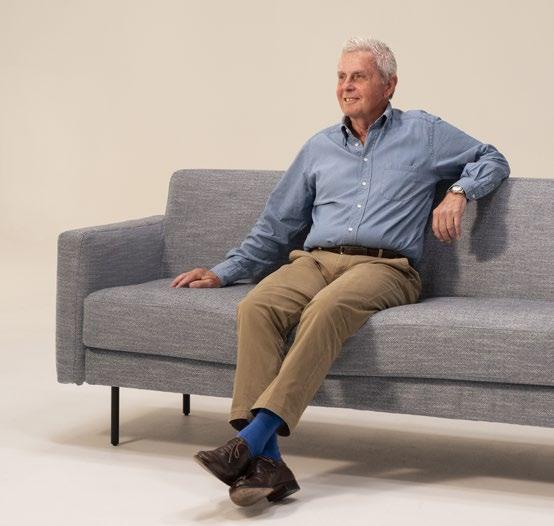
SYSTM aims to protect the dignity and independence of aged care residents while making the life of the carer as easy as possible. The secret is in the unique proprietary key, allowing SYSTM furniture to be cleaned and refreshed within a few clicks, no professional help required.
Additional information, including the SYSTM range, can also be found on SYSTM’s website (https://systm.au/).

LABOR TO COMMIT $11.3BN

to fund 15% pay rise for aged care workers
Treasurer Jim Chalmers said this funding is the pay rise aged care workers “need and deserve”.
“Aged care workers deserve more than our thanks to get our people through some difficult years in recent times,” he said.
“The care economy is more than pressure on the budget, it is an opportunity for the economy more broadly.“
Chalmers said the care economy - including aged care - is going to become a “bigger and bigger” part of the economy in the future.
Aged care workers are in for a major pay boost in the upcoming federal budget with salary increases of up to $10,000 per year to cover the rising cost of living pressures.
Under an $11.3 billion package, nurses and aged care workers will receive the most significant pay pocket increase in the federal budget on May 9.
From January 1, aged care workers will receive an extra $7000 in their pay packet and nurses will be paid an additional $10,000 a year.
Aged Care Minister Anika Wells said this is the most significant pay boost for the aged care sector in decades and the 15% pay rise for the sector will help attract and keep staff.
& VIEWS I NEWS & VIEWS I NEWS & VIEWS I NEWS & VIEWS I NEWS & VIEWS
Dog illustration imagee by
AUSTRALIAN CARERS GUIDE I 113
Below: Peter using SYSTM Left: SYSTM in action
Freepik
&
OPAN welcomes ANNE BURGESS
as new council of elders chair
The
Older Persons Advocacy Network
(OPAN) congratulates
Anne Burgess AM on her appointment as the new Chair of the Aged Care Council of Elders.
“A passionate advocate for the rights of older people, Anne brings decades’ worth of experience to this role,” OPAN CEO Craig Gear OAM said.

Ms Burgess’s distinguished career includes roles as Director of the Office for Women, and Acting Commissioner at the Equal Opportunity Commission in South Australia.

An OPAN Board Director and Chairperson of the Aged Rights Advocacy Service, her knowledge of the sector is extensive.
She is respected in South Australia for her work as a member of the governing body of the Northern Adelaide Local Health Network and Vice President of COTA SA, and nationally, as the Chair of COTA’s National Policy Council.
“Formed on the recommendation of the Royal Commission into Aged Care Quality and Safety, the Council of Elders has a vital role in ensuring older people have a voice in aged care reform,” Mr Gear said.
“Anne has an in-depth knowledge of the aged care system through her work with the National Aged Care Alliance.
“With her skills in policy development, strategic
planning and community engagement, Anne is the perfect person to lead us through this period of significant change and to oversee the development of a new Aged Care Act that actively addresses older people’s basic human rights.”
Ms Burgess takes over as Chair of the Council of Elders Chair from Ian Yates, who commenced his role as Interim Inspector-General of Aged Care in February For information or support regarding aged care, please call the Older Persons Advocacy Network on 1800 700 600 or visit opan.org.au
In
2021 – 2022 there were 16,595 calls OPANto
Phone imagee by zirconicusso on Freepik
NEWS & VIEWS I NEWS & VIEWS I NEWS & VIEWS I NEWS & VIEWS I NEWS I AUSTRALIAN CARERS GUIDE 114
News VIEWS

SUBSCRIBE TODAY NEVER MISS AN ISSUE OF SUBSCRIPTIONDELIVERED TO YOUR DOOR FREE SAVE 40% OFF NEWS STAND PRICE UPTO BENEFITS OF A SUBSCRIPTION: • Save $$$ OFF the news stand price • Have the guide delivered to your door • Includes a FREE Digital copy of the guide • And you’ll never miss a copy! INCLUDES DELIVERY ONLINE ORDERS: Please visit: australiancarersguide.com.au/shop OR CALL: 1300 717 515 Free Call Mon to Fri 9am to 5pm 2 YEAR (8 ISSUES) $49 + GST 40% SAVINGS 1 YEAR (4 ISSUES) $32 + GST 20% SAVINGS Offer valid in Australia only. Price includes delivery. Please allow 2 to 4 weeks for delivery. AUSTRALIAN CARERS GUIDE I 115
MAINTAINING INDEPENDENCE
QHow can I help my aging parent maintain their independence at home?
ANSWER: One way to help your aging parent maintain their independence at home is by making some modifications to their living environment. This could include installing grab bars in the bathroom, removing tripping hazards, and making sure the home is well-lit. Additionally, you can hire a home care provider to assist with daily tasks, such as housekeeping and meal preparation.

MANAGING BILLS

QHow can I manage the financial and legal aspects of caring for my aging parent?
ANSWER: Caring for an aging parent may involve managing their finances and legal affairs. This may include creating a power of attorney, managing their bills, and ensuring they have appropriate insurance coverage. It’s important to seek the advice of a financial or legal professional to ensure all necessary steps are taken and to avoid potential issues down the road.
KEEP ME ON THE ROAD
QCan I get an interest free car loan from somewhere? My wife has had 8 strokes since 2013 and I do 120 plus hours a week just caring for her. I just go day by day as there is nothing left of the woman I married. It’s like being haunted by a memory of someone you used to know but now only care for. Even so, I still have to drive my wife to appointments, tests and hospitals. If my vehicle dies, I won’t have the money to keep it going. The only help I know of comes from are high percentage loans offered by financial companies that prey on the vulnerable. I save the government countless dollars by being the carer for my wife, I feel like a slave to circumstance. Help outside of the box would be nice. Why can’t carers get access to low to nil percentage loans for a car when it’s vital to continue to care for a loved one?
Grant Morrison NSW
HI GRANT,
Check for interest free financial assistance from organisations in your state. For example, in the ACT you can access $5,000 at no interest with payments deducted from Centrelink payments for anything including legal fees, furniture etc. There is also Good Shepard charity that will lend $5,000 interest free towards a car. Contact Good Shepard 13 64 57 or visit goodshep.org.au/services/ vehicles/

Q
Where our experts answer your questions. ‘You don’t know what you don’t know until you know what you don’t know.!”
A
and
I AUSTRALIAN CARERS GUIDE 116
Images by Freepik
SUPPORTING WELLBEING AND MENTAL HEALTH

QHow can I support my aging parent’s mental health and well-being?
ANSWER: Supporting your aging parent’s mental health and well-being is important for their overall health. You can help them stay connected with family and friends, encourage them to pursue hobbies or interests, and provide emotional support. It’s also important to look out for signs of depression or anxiety and seek professional help if needed.
DON’T PANIC
QHow can I prepare for emergencies or unexpected events?
ANSWER: As a caregiver for aging parents, it’s important to be prepared for emergencies or unexpected events. This may include creating a communication plan with family members, having important medical information readily available, and creating a plan for power outages or natural disasters. Additionally, you can consider enrolling your aging parent in a medical alert system or hiring a caregiver who is trained in emergency response.
STAY ACTIVE
QHow can I encourage my aging parent to stay active and engaged?
ANSWER: Encouraging your aging parent to stay active and engaged is important for their physical and mental health. You can suggest activities like taking walks, attending community events, joining a social group or volunteering. Helping them find hobbies or interests they enjoy can also promote engagement and well-being.

WHERE IS THE FAIRNESS
QMy son cares for me and because his wife works as a receptionist at a school his payment is virtually nothing per fortnight. They only live above the poverty line. My neighbour receives $50,000 a year in government benefits which enables her to stay at home and look after her mother. Where do you go with this it’s so unfair and frustrating. It really equates to slave labour for carers. Maybe the Greens party need us to start lobbying for change.
Merrilyn. L
HI MERRILYN, Being an informal carer for a loved one can be a challenging role. It is unfortunate that some carers struggle financially while others receive government benefits. The issue of fair compensation for carers is complex and is why we support the many associations that continually advocate for policies that recognise and support the value of caring.
GOT A QUESTION YOU WANT ANSWERED?
Then let us know either by email:hello@acguide.com.au or write us at The ACG P O Box 43 Wantirna Vic 3152
AUSTRALIAN CARERS GUIDE I 117




VitalCALL has been helping Australian’s stay independent for over 40 years Australia’s premium personal emergency response provider Australian based 24/7 emergency response In-home and mobile units available NDIS & DVA Approved 1300 848 252 vitalcall.com.au Scan for more information
WINTER FEAST
with maggie beer

One of Australia’s most well-known and much-loved cooks, Maggie Beer, has been on an important mission – a food mission for older Australians that is.

For more than five decades, we have grown to witness and experience her unbridled passion and joy around food. Maggie’s grassroots, no-nonsense approach to wholesome and local produce, have been the catalyst for creating
hundreds of mouth-watering recipes which have been embraced in homes all around Australia. To learn more about her online training modules, please visit The Maggie Beer Website maggiebeerfoundation.org.au
AUSTRALIAN CARERS GUIDE I 119
Potato, Leek, Lemon and Parmesan Soup
A traditional favourite with a twist of lemon for a cold winter’s evening.
Preparation 20 minutes
Cooking 40 minutes
Makes 2.5 litres Best Served fresh, can be frozen
Season Autumn, Winter
Ability Easy
METHOD
1. Place the oil and butter in a large pan over medium heat, add the onion and sweat for 10 minutes without colour.
INGREDIENTS
50g extra virgin olive oil
50g unsalted butter
180g diced brown onion
6g chopped fresh garlic
3 leeks rinsed and finely chopped
12g fresh thyme leaves
40g lemon juice

625g white potato- skin on, inch chunks
1.25L vegetable stock
250g cream
Sea salt flakes
Pepper
TO SERVE
Shaved parmesan, extra virgin olive oil & drizzle of cream
2. Add the garlic, leeks and thyme, sweat down until the leeks are wilted, add the lemon juice to deglaze and season with salt and pepper.
3. Add potatoes, stock and seasoning, bring to the boil and simmer, covered until potato is tender. Add cream and remove from heat.
4. Emulsify with a stick blender and serve warm topped with parmesan, drizzle of cream & extra virgin olive oil.

I AUSTRALIAN CARERS GUIDE 120
I RECIPES I
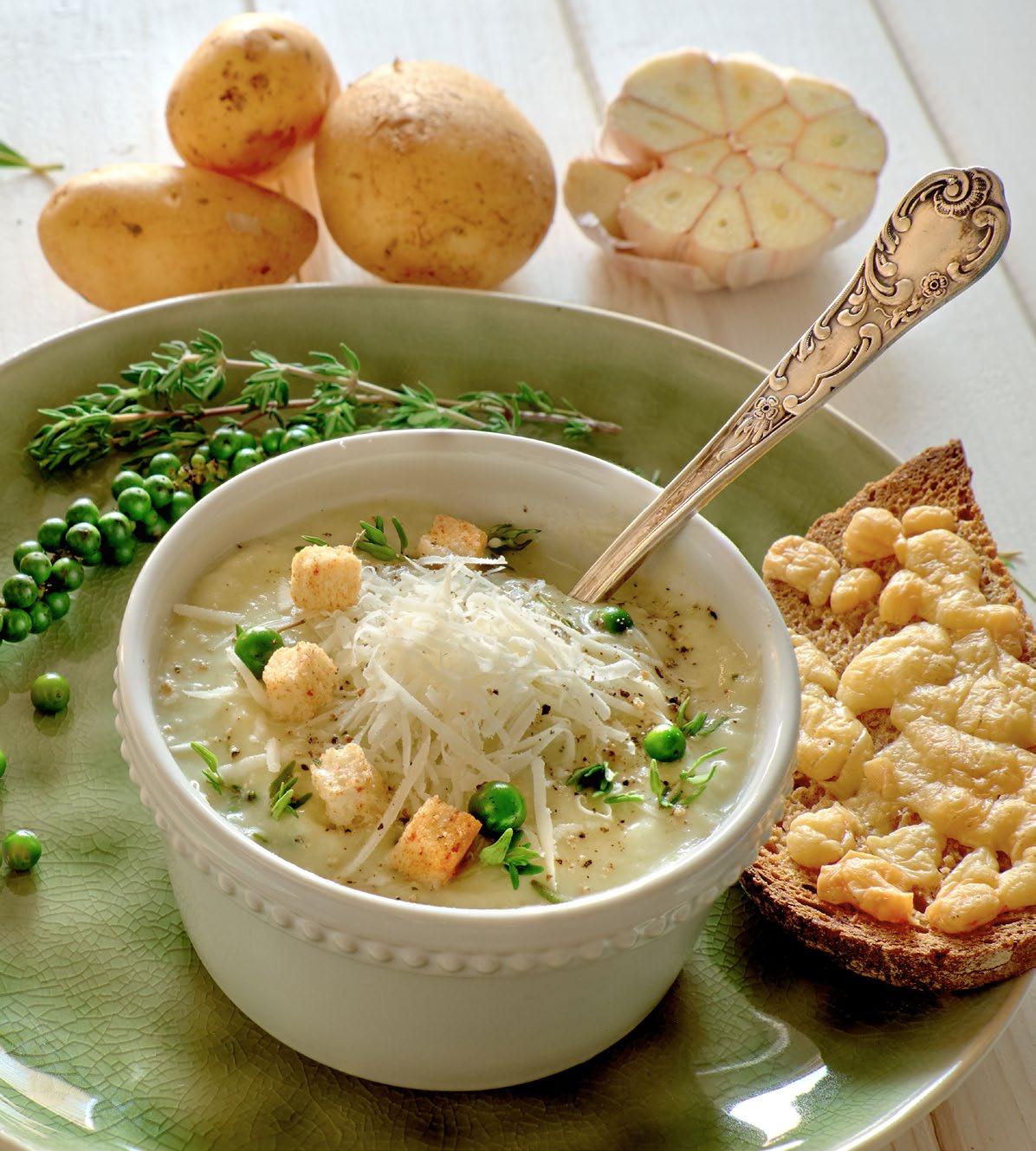
AUSTRALIAN CARERS GUIDE I 121 I RECIPES I
Warm gingerbread pudding with caramel sauce
Please palates with this ginger spiced pudding. Carrot & ground almonds keep this decadent pudding moist throughout the cooking process and the bittersweet caramel sauce provides a luxurious touch. It’s even better with a scoop of icecream!
Preparation 20 minutes
Cooking 40 minutes
Makes 2.5 litres Best Served fresh, can be frozen
Season Autumn, Winter Ability Easy
METHOD
1. Preheat a fanforced oven to 175c, grease and line a 20cm round tin with parchment paper.
INGREDIENTS
1 egg
90g grapeseed oil or similar
110g treacle
120g castor sugar
160g self-raising flour
1 tsp ground cinnamon
1.5 tsp ground ginger

1 ¼ tsp bi-carb soda
Pinch sea salt flakes
75g ground almonds
80g grated carrot
125g boiling water
SAUCE
210g (1 cup) castor sugar
125g (1/2 cup) water
250g (1 cup) cream
TO SERVE
Ice cream
2. Place the egg, oil, treacle and sugar in the bowl of a mixing machine- beat on high for 2 minutes.
3. Sieve the flour, spice and soda into a large bowl, add salt and almonds.
4. Add flour to the whisked egg mix, along with the carrot and water- mix until combined.
5. Pour into the prepared mold and bake for 40-50minutes or until cooked through and a skewer comes out clean. Remove from oven and cool on a rack.
6. SAUCE- Place the sugar and water in a medium sized saucepan- bring to the boil and simmer until turned to a golden caramel colour, remove from the heat and add the cream (carefully as the mix may spit), whisk to combine and then return to the stove on low to simmer for 1-2 minutes or until smooth.
7. Serve a slice of warmed pudding with caramel sauce and vanilla ice cream.
Images courtesy of Maggie Beer Foundation and illustrations by vectorpocket on Freepik
I AUSTRALIAN CARERS GUIDE 122 I RECIPES I
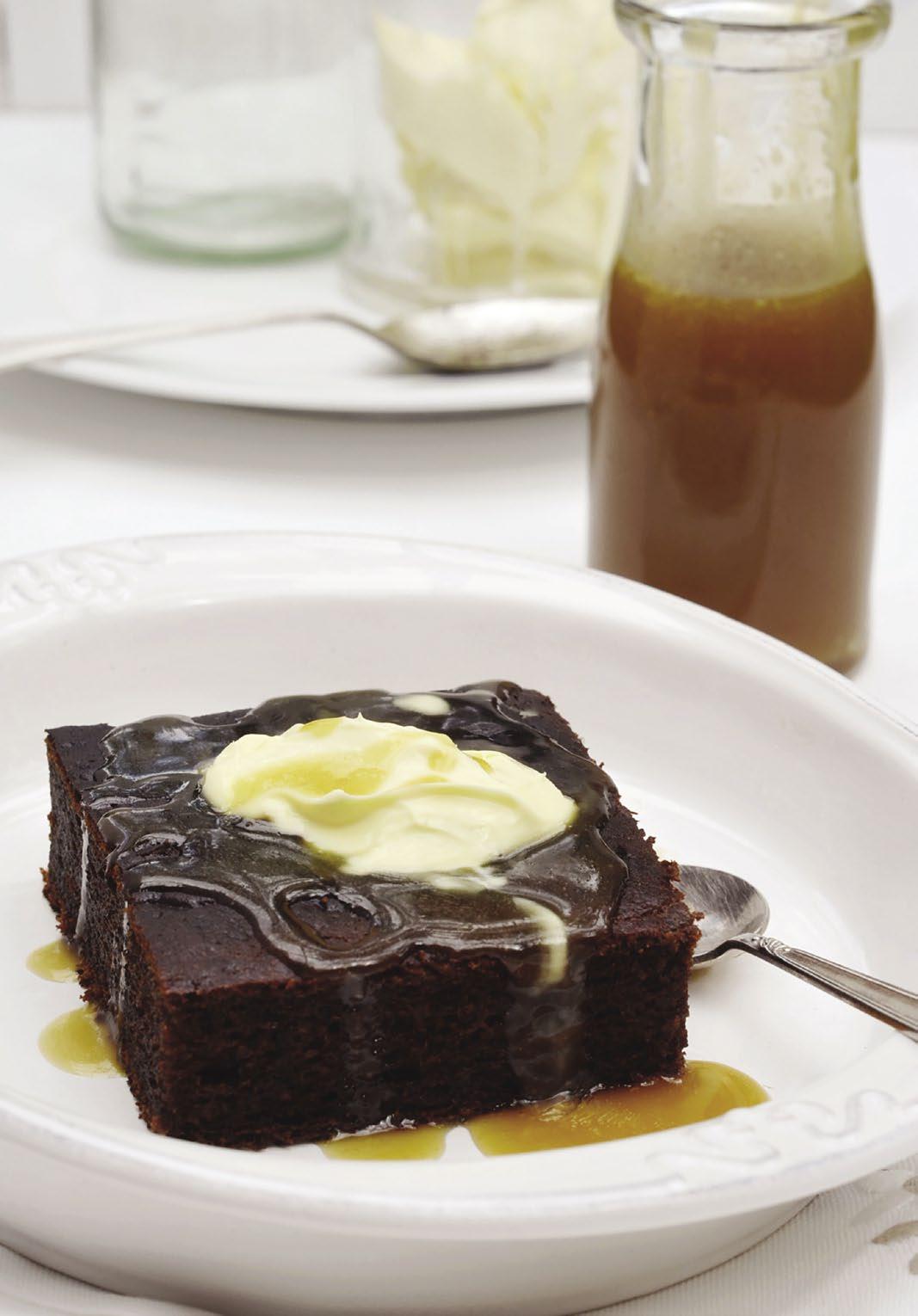
AUSTRALIAN CARERS GUIDE I 123 I RECIPES I








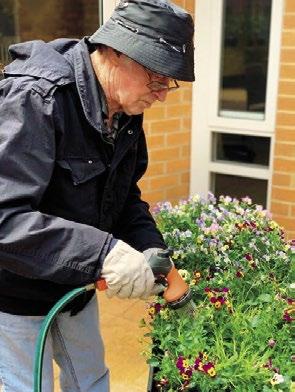




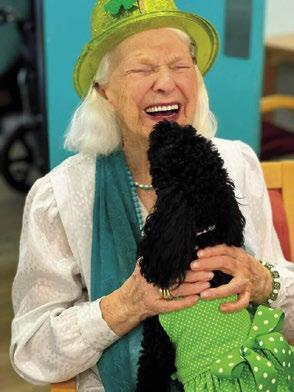
ENQUIRE TODAY AW7226584 Find a stockist near you www.thewondersheet.com.au 07-55 911 629 NDIS, HCP & DVA approved FUN doesn't age at E x p e r i e n c e a h o m e - s t y l e r e s i d e n t i a l a g e d c a r e h o m e a n d b e s u p p o r t e d b y 2 4 / 7 o n s i t e r e g i s t e r e d n u r s e s . Specialists in permanent residential and respite care, dementia care, and NDIS respite. Inviting gardens and outdoors Busy lifestyle calendar Regular outings 03 9742 0699 www manorcourt org au 5 Hogan Grove Werribee office@manorcourt org au
Fun Games
Improve
&
Find
They will be placed only once and may be either horizontal, vertical or diagonal and go either forwards or backwards. Words can cross.
problem-solving
and
Bones V J F F I N S C P C I R P R N M U M E T C T Q O H E T S C U U T U M R Z E C A D A R U N L N P I U B U C N R R P P R L N R M N R O Y I P T V U F E W A E A A O X D U A V R I I M A S T X R X I S A T Y B U R U L W S I C R N E O E U I P M H U T A L K U C P G L B T T R U P R E L P U U A A L S S U I D A R Z A P W S T A A U U R O S C H S O N Z U S H P C A P A X S U L U N A T E O P I C A R P A L Y A I B I T D I O Z E P A R T U V K O A L U S A C R U M C Z CARPAL CARPUS CENTRUM MAXILLA PATELLA RADIUS
your memory, concentration and reasoning. The benefits of puzzles are numerous. They maintain or develop
skills,
help you relax.
the words in the grid?
WORDSEARCH CARPAL CARPUS CENTRUM COCCYX CRANIUM FEMUR FIBULA HUMERUS INCUS LUNATE MAXILLA PATELLA RADIUS SACRUM SCAPULA STAPES STERNUM TIBIA TRAPEZOID ULNA
AUSTRALIAN CARERS GUIDE I 125 I FUN & GAMES I BURST BURST
All solutions on138page
JUMBO CROSSWORD 1 2 3 4 5 6 7 8 9 10 11 12 13 14 15 16 17 18 19 20 21 22 23 24 25 26 27 28 29 30 31 32 33 34 35 36 37 38 39 40 41 42 43 44 45 46 47 48 49 50 51 52 53 54 55 56 57 58 59 Complete the crossword clues to fill the grid. All onsolutions 138page I AUSTRALIAN CARERS GUIDE 126 I FUN & GAMES I
ACROSS
1 Song of devotion (6)
5 Underside of an arch (6)
8 Nearest (7)
11 Be in debt (3)
12 Less attractive (6)
13 Roomy (9)
14 Moat (anag.) (4)
15 Causing difficulties (11)
19 Quickly finish something (6,3)
20 Move a heavy object with great effort (9)
22 Nicely (10)
24 Pressing keys (6)
25 Capable of being understood (13)
31 Based on a mistaken belief (10)
33 Unfounded (10)
36 Crude but effective (5,3,5)
40 Fall quickly (6)
42 Assessment (10)
45 Settle an argument (9)
47 Called before a court (9)
49 Unnecessary; superfluous (11)
53 Small particles of stone (4)
54 Strange (9)
55 Reciprocal (6)
56 Make a living with difficulty (3)
57 Aims or purposes (7)
58 Plant with oil rich seeds (6)
59 Decomposes (6)
DOWN
2 Country in West Africa (7)
3 Verse form (5)
4 Ethical (5)
5 Religious groups (5)
6 Erupt suddenly (5-2)
7 Base part of a violin to which the strings are attached (9)
8 Pairs (7)
9 Type of pasta (9)
10 Parody (5)
16 Implant ideas in the mind by indoctrination (9)
17 Finishes (4)
18 Dramatic musical work (5)
20 Distinctive design (5)
21 Country in the Himalayas (5)
23 Yellow parts of eggs (5)
26 Out of fashion (5)
27 Stiff (5)
28 Bent wire for hanging things on (4)
29 Secondary occupations (9)
30 Highway (4)
32 Higher than (5)
34 Boredom (5)
35 Strain (5)
37 Promise with certainty (9)
38 These fall from clouds (9)
39 Linear measures of three feet (5)
41 Spots (4)
43 Canvas shelters (7)
44 Small rounded lumps (7)
46 Simple song for a baby (7)
48 Broadcast again (5)
50 Recipient of money (5)
51 Titled (5)
52 Loft (5)
WORDWHEEL
Find as many words of three or more letters in the wheel as you can. Each word must use the central letter and a selection from the outer wheel – no letter may be used more times than it appears in the wheel.
Can you find the nine letter word hidden in the wheel?
All onsolutions
138page
D A C I J E E T V E O N L P E H E T
AUSTRALIAN CARERS GUIDE I 127 I FUN & GAMES I
All puzzles are kindly supplied by Richardson Puzzles & Games. Sign up for their email newsletter to receive a FREE printable puzzle and access the FREE Friday Quiz every week -
9 3 5 2 2 3 6 8 5 4 1 9 4 1 9 4 6 7 8 4 2 8 7 8 5 5 6 2 4 9 3 8 3 8 5 7 3 2 4 1 9 7 6 6 5 3 2 9 5 9 1 3 5 7 5 6 2 7 1 3 4 9 2 6 7 1 5 8 9 4 6 3 9 4 2 7 9 3 8 7 3 6 3 4 8 5
EASY MEDIUM HARD Looking for a mental challenge? This editions brainteasers will really get those cogs whirling! All onsolutions 138page
SU DOKU
richardsonpuzzlesandgames. com/newsletter
I AUSTRALIAN CARERS GUIDE 128 I FUN & GAMES I
LOVE PUZZLES & QUIZZES?
Day Respite Program






















































































Let us take care of your loved one, while you take care of you.


































We understand that supporting your loved one is often tiring both emotionally and physically. Naturally, carers, like anyone, need time to themselves.
Medical & Aged Care Group are here to help with a Day respite program.



It is available to the aged living at home, who would benefit from socialisation in a safe and supportive environment with access to nursing staff and allied health.




We focus on healthy positive living, through our well-being activity programs. Visit our website www.maacg.com.au to view all MACG homes across Victoria Or contact our admissions team on 0438 984 299 to discuss

↓ ↓ 4 LETTERS Ages Aped Barn Done Flip Gird Pram Rang Road 6 LETTERS Archly Barrel Caters Credit Dining Simper Thatch Waxing 7 LETTERS Induced Sparing Whirled 9 LETTERS Deduction
4 Ages Aped Barn Done Flip Gird Pram Rang Road 6 Archly Barrel Caters Credit Dining Simper Thatch Waxing 7 Induced Sparing Whirled 9 Deduction Find the path out without breaking through walls.
solutions on page 138 I AUSTRALIAN CARERS GUIDE 130 I FUN & GAMES I
KRISS KROSS
SQUARE MAZE All
Live your best life with us.
Located across Melbourne and Geelong, our bright and modern residential aged care homes offer a unique range of facilities and services. From tranquil homes in rural settings, to state-of-the-art high-rise living, one of TLC’s homes will suit your lifestyle.

• On-site medical centres
• Spacious private rooms with adjoining ensuites
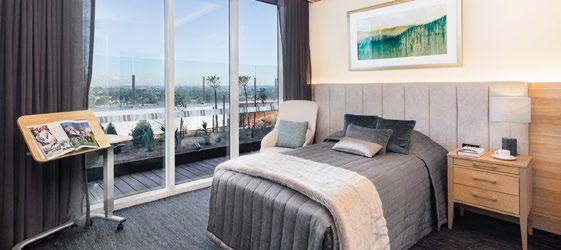
• Specially designed memory support environments
• Registered nurses on-duty 24-hours a day
• State-of-the-art gymnasiums offering tailored fitness programs
• Sports bars in selected homes
• On-staff physiotherapists, dietitians and podiatrists
• Hydrotherapy pools in selected homes
• Fully-equipped cafés
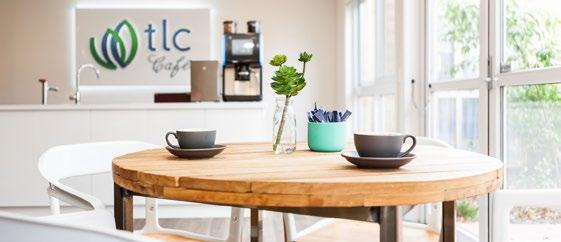
• Virtual reality cinemas
• Hairdressing salons
• An exciting series of social activities at no extra cost
tlcagedcare.com.au I 131 TLC CALL US TO ARRANGE A PERSONALISED TOUR
Altona North • Armstrong Creek • Belmont • Donvale • Fitzroy North • Frankston North Hallam • Mordialloc • Noble Park • Wallington • Whittlesea
Dictatorial Keep out Elf or fairy Confine; snare Ninth month (abbr) Dither; excessive concern Country in the Himalayas Breadth Jedi Master in Star Wars films Takes a break Oneness Conveyed an opinion Follow on Dispose of Rapidity of movement A brief piece of film Avenger (anag) Friel: English actress Mud channel Fishes Newly-wed Thought Haul Biblical garden Replace Id ___: that is to say Piece of furniture Popular Oxford degree (inits) Emit energy Physics unit Red gem Draw Finish US tax agency (inits) Prevented Vessel Sincere Dull Skin condition on the face Trough for carrying bricks Noes (anag) Furniture to sleep on Speak in a wild way Danson: US actor US state Little rascal Snow runner Tack Guglielmo ___: radio pioneer Mineral spring Diving waterbird Type of bicycle One's family Run fast Complete the
to
All onsolutions 138page I AUSTRALIAN CARERS GUIDE 132 I FUN & GAMES I
clues
fill the grid. The arrows show direction the answer should be placed. JUMBO ARROW-WORD



Can you crack the entire code to complete the crossword grid?
Each number from 1-26 represents a letter of the alphabet from A-Z. Every letter appears in the grid at least once, and is represented by just one number. We’ve given you 3 letters to help you start.
15 26 12 9 13 14 24 13 13 9 4 5 22 18 26 25 24 3 16 3 9 19 3 4 17 22 18 15 4 17 9 10 15 24 22 25 17 9 9 26 13 22 22 5 24 14 13 24 8 15 24 22 20 9 14 3 24 15 11 24 4 6 23 1 14 21 3 10 3 25 12 21 5 10 9 23 9 26 22 12 25 26 4 10 13 14 9 9 17 22 9 19 21 24 13 9 23 24 13 10 24 9 21 19 15 22 22 13 1 24 22 14 2 17 3 22 3 14 1 24 14 9 20 12 10 14 10 24 26 7 25 15 22 22 15 12 24 26 23 3 18 25 3 13 26 9 13 25 13 14 24 15 26 13 13 24 1 18 9 10 A B C D E F G H I J K L M N O P Q R S T U V W X Y Z 1 2 3 4 5 6 7 8 9 10 11 12 13 Q 14 15 16 17 18 19 20 21 22 23 24 25 26 T I
138page I AUSTRALIAN CARERS GUIDE 134 I FUN & GAMES I
CODEWORD All onsolutions
Help after stroke Stroke Foundation StrokeLine: 1800 787 653 StrokeLine’s health professionals provide free information, advice and support. They can help you find the support and services you need www.strokefoundation.org.au
$14.99, paperback, published by Richardson Publishing. Large Print Colour & Frame - Calm available now from richardsonpuzzlesandgames. com/product-category/colouring and all other good book retailers. Mindfulness and Relax available September 2023.
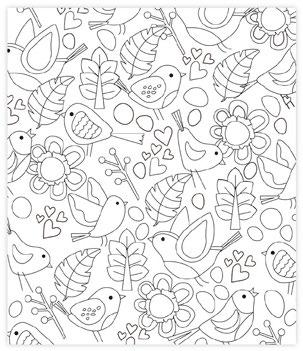

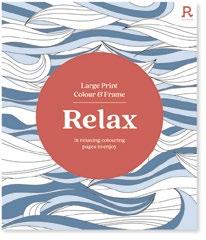
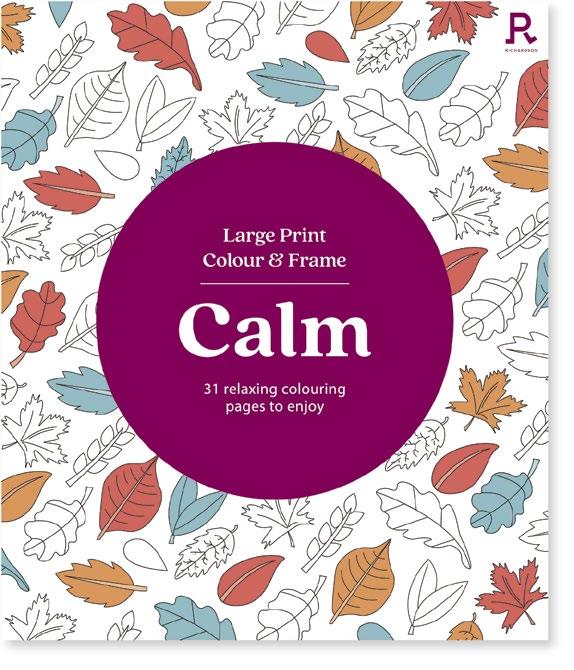
Large Print Colour & Frame Calm
• 31 large print, easy-colour illustrations.
• Perforated page edges to enable you to cleanly tear your artwork out of the book.
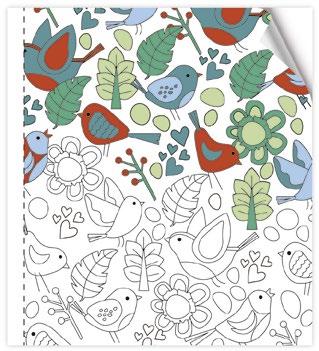
• Pages can fit in a standard 25cm (high) x 20cm (wide) picture frame.
• Designed for adults, but can be enjoyed by all!
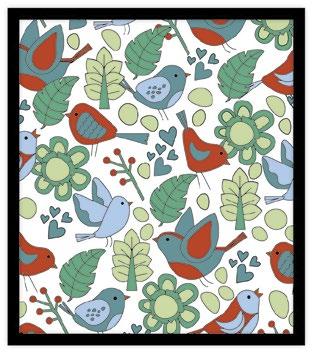
Select page 1 Tear out & colour 2 Frame & display 3 NEW
Enter & Win
Colour in the picture below
The best 5 in each state will win a free copy of Large Print Colour & Frame - Calm
Please mail entries to ACG PO Box 6155 Wantima 3152 Vic Australia or scan and email to hello@acguide.com.au
entries announced in the Spring edition
Winning
PUZZLE SOLUTIONS
Word Wheel
A N T H E M S O F F I T C L O S E S T
I A O W E L A O P P
U G L I E R C A P A C I O U S A T O M
E K A T R L P G O
T R O U B L E S O M E P O L I S H O F F
I R N P U I E E
M A N H A N D L E P L E A S A N T L Y
O E I S R C T O
T Y P I N G A P P R E H E N S I B L E
I A W R A I O I K
F A L L A C I O U S G R O U N D L E S S
B S A S I K E N I
R O U G H A N D R E A D Y P L U N G E
V U A A A I U V
E V A L U A T I O N R E C O N C I L E
R W N O D N E U
A R R A I G N E D D I S P E N S A B L E
E N I R U A A T L
G R I T U N W O R L D L Y M U T U A L
U E G P E E K E I B
I N T E N T S S E S A M E D E C A Y S V J F F I N S C P C I R P R N M U M E T
I N G E S T A S S E M B L Y
N U A O K O E
C O M P L Y I M P E R I A L
U P E E N S L L
ADJECTIVE
active, adjective, advice, avid, cave, caved, dative, deviate, device, diva, dive, evade, eve, evict, evicted, jive, vat, vet, via, vice, vie, vied
12, GOOD: 17, EXCELLENT: 20
TELEPHONE hot, hotel, lent, lento, lepton, let, lot, loth, net, not, note, opt, pelt, pent, pet, plot, poet, pot, tee, teen, telephone, ten, the, thee, then, toe, ton, tone, top TARGET: 16, GOOD: 22, EXCELLENT: 26
C
E
U U T U M R Z E C A D A
U N L N P I U B U C N R R P P R L N R M N R O Y I P T V U F E W A E A A O X D U A V R I I M A S T X R X I S A T Y B U R U L W S I C R N E O E U I P M H U T A L K U C P G L B T T R U P R E L P U U A A L S S U I D A R Z A P W S T A A U U R O S C H S O N Z U S H P C A P A X S U L U N A T E O P I C A R P A L Y A I B I T D I O Z E P A R T U V K O A L U S A C R U M C Z 8 1 4 7 9 3 5 6 2 2 3 7 6 8 5 9 4 1 9 5 6 1 2 4 8 7 3 1 8 3 9 5 7 4 2 6 6 7 5 4 1 2 3 8 9 4 9 2 3 6 8 1 5 7 7 4 9 8 3 6 2 1 5 5 6 1 2 4 9 7 3 8 3 2 8 5 7 1 6 9 4 2 8 6 7 4 5 3 1 9 5 4 9 8 3 1 6 7 2 3 7 1 9 6 2 5 8 4 1 6 3 2 7 9 4 5 8 9 5 4 3 1 8 2 6 7 7 2 8 4 5 6 9 3 1 8 9 5 6 2 7 1 4 3 4 1 2 5 8 3 7 9 6 6 3 7 1 9 4 8 2 5 7 8 3 6 2 4 5 9 1 2 5 9 1 3 7 4 6 8 6 4 1 8 5 9 2 3 7 4 3 2 5 9 8 1 7 6 5 1 7 4 6 3 8 2 9 8 9 6 7 1 2 3 5 4 3 2 8 9 7 1 6 4 5 9 6 4 2 8 5 7 1 3 1 7 5 3 4 6 9 8 2 P F W R E S T S U N I T Y E X P R E S S E D O S C R A P S P E E D C L I P E A N N A R U T A N G L E S I D E A G S U B P P E D R E S S E R T E R A D I I R S A V E R T E D V A T G E N U I N E T E D B E D I D A H O Y R M A R C O N I S P A T A N D E M K I N G R E B E S P R I N T
T Q O H
T S C
R
B A T S A X I A L V E T O A I J A M F D W T H O R O U G H B R E D E N L G U N M R S T E E P L E C H A S E D A S R A E H C I L L S W A L T Z P O L O T W A T E V G R T R A N Q U I L L I G A N D O Y U O S N E S U S T A I N S S A W Y E R T H A T C H F A A R C H L Y T A I B E N P R A M S P A R I N G R S W A X I N G B H I A D I R I C R E D I T R R O A D N R N L P D O N E S I M P E R E U L N D D C A G E S E D E D U C T I O N D A C I J E E T V E O N L P E H E T
TARGET:
HARD MEDIUM EASY ↓ ↓
Jumbo Crosssword
Jumbo Arrow-Word
Word Search
Kriss Kross
Codeword
Su doku
I AUSTRALIAN CARERS GUIDE 138 I FUN & GAMES I
Square Maze
EMERGENCY MEDICAL CARE 000 (TRIPLE 000)
HELPFUL CONTACTS CRISIS - EMERGENCY - INFORMATION : INSTANT HELP AVAILABLE BELOW
Emergency assistance 000 (24 hours/7 days) Lifeline’s 24/7 service 13 11 14 Suicide Call Back 1300 659 467 24/7 counselling service Beyond Blue’s support 1300 22 46 36 SANE Australia’s service 1800 187 263 Carer Gateway 1800 422 737 NSW Mental Health Line 1800 011 511 ACT Mental Health Triage Service 1800 629 354 SA Mental Health Triage Service 13 14 65 NT Crisis Assessment Triage Service 1800 682 288 WA Mental Health Emergency Line 1800 676 822 QLD 24-hour mental health care 1300 642 25 TAS Mental Health Services Helpline 1800 332 388 MindSpot Clinic - for adults with anxiety or depression 1800 61 44 34 QLife’s support service 1800 184 527 National Dementia Helpline 1800 100 500 Centrelink for Carers & Disability 13 27 17 Aged & Disability Advocacy 1800 818 338 Centrelink for ABTSI 1800 136 380 Centrelink for older Australians 13 23 00 Department of Veterans Affairs 1800 555 254 My Aged Care 1800 200 422 Medicare 13 20 11 Elder Abuse Prevention 1300 651 192 Translating and Interpreting Service (TIS National) 13 14 50 and 1800 131 450 National Continence Helpline 1800 330 066 Healthdirect for a nurse triage service 1800 022 222 (all states except for Victoria) NURSE ON CALL 1300 60 60 24 for health help from registered nurses in Victoria Poisons Information Centre 131 126 for 24/7 assistance Sexual assault/domestic and family violence counselling 1800 RESPECT 1800 737 732 Gambler’s Help hotline 1800 858 858 24/7 Australian Men’s Shed Association 1300 550 009 MensLine Australia 1300 78 99 78 helping men deal with relationship problems LGBTI peer support 1800 184 527 Mon–Thurs 6 pm–10 pm, Fri–Sun 6pm–9pm National Alcohol and Other Drug 1800 250 015 National Debt Helpline 1800 007 007 Relationships Australia 1300 364 277 relationship support services Translating and Interpreting Service Dementia Support Australia 1800 699 799
CONTACTS l CRISIS l EMERGENCY l INFORMATION: INSTANT HELP AVAILABLE BELOW
HELPFUL
Respite offer for readers*
Considering aged care for a loved one?
At Bupa Aged Care, whether for respite short-stay or as a new home, our experienced registered nurses and carers provide the care each resident needs in the way they prefer. Care is first and foremost.
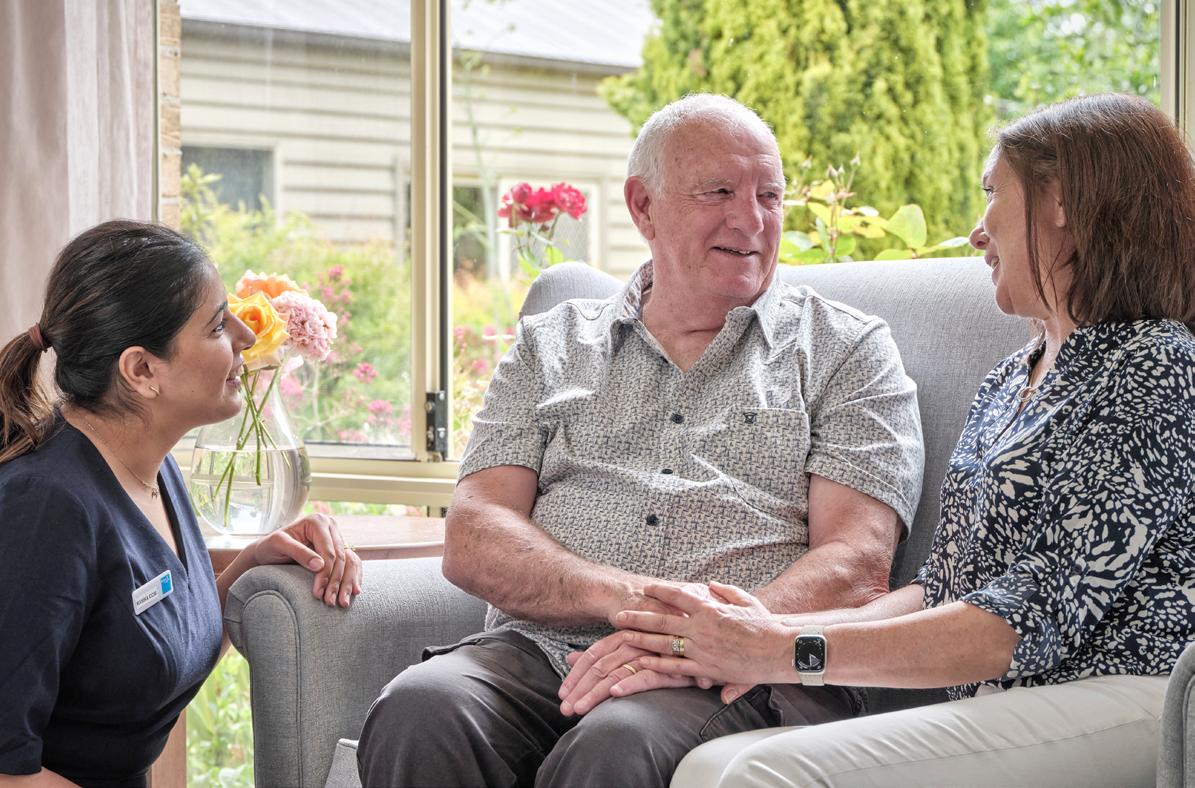
We embrace and support residents to live their day their way, with teams dedicated to their well-being.
People rarely expect to need aged care, but if your family does, we’ll guide you through the steps.
New residents welcome.
For more information or to book a visit, call 1800 785 592 and mention this ad to access the Australian Carers Guide Reader’s respite offer (Ts&Cs apply).*
*Offer details and Ts&Cs available at bupaagedcare.com.au/carer











































































































































































































































 by RACHEL LANE FROM AGED CARE GURUS
by RACHEL LANE FROM AGED CARE GURUS

































































































































































































